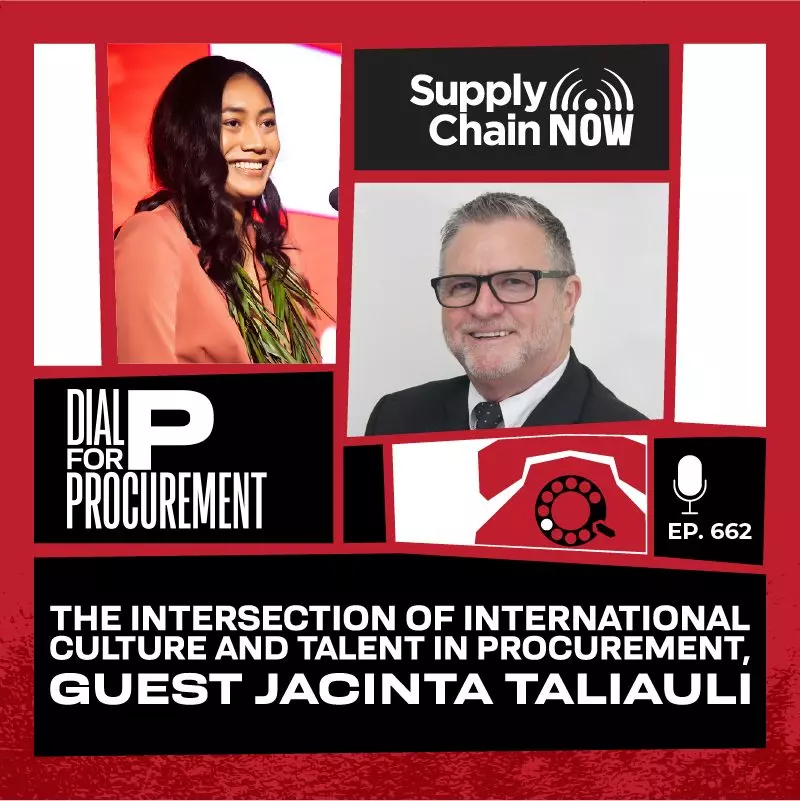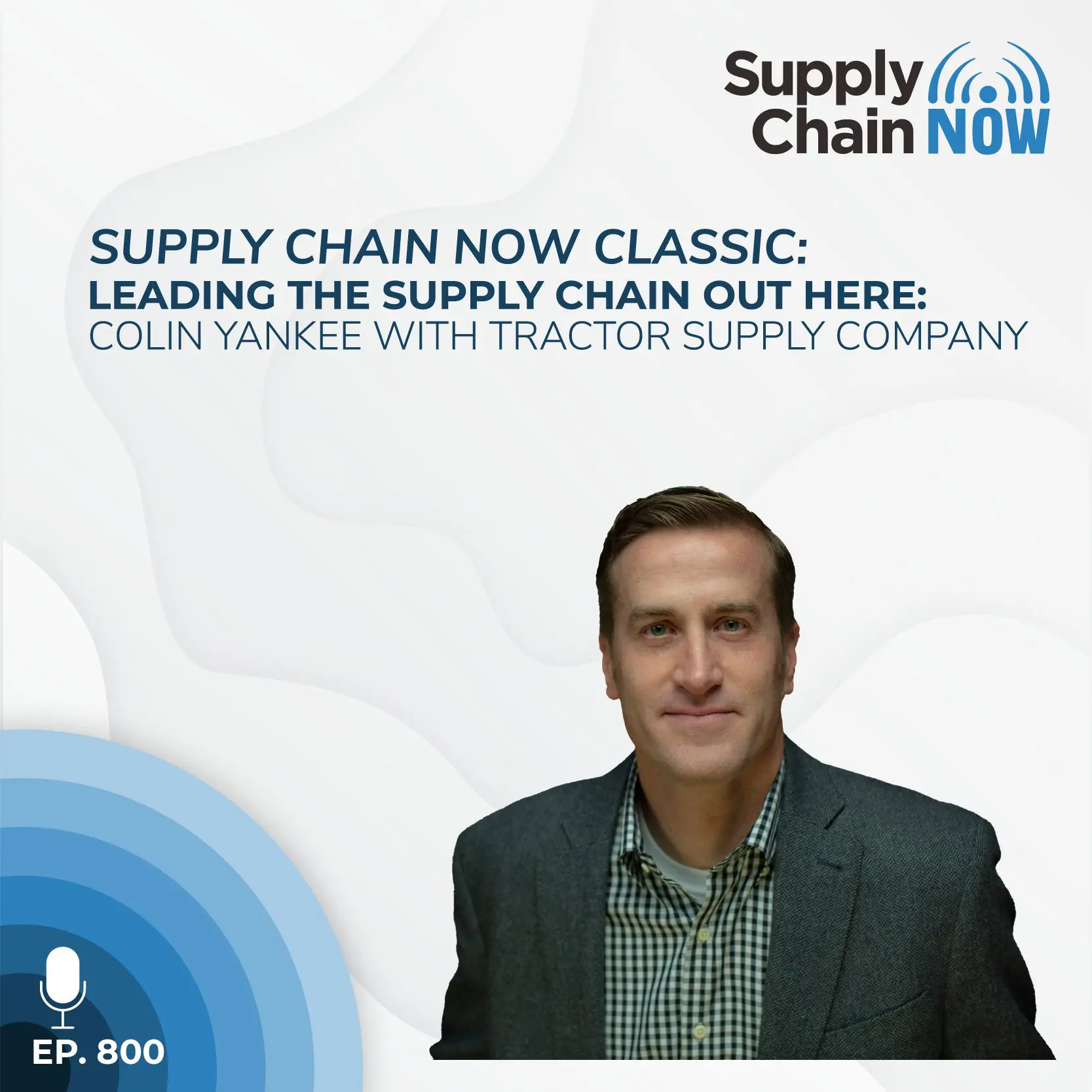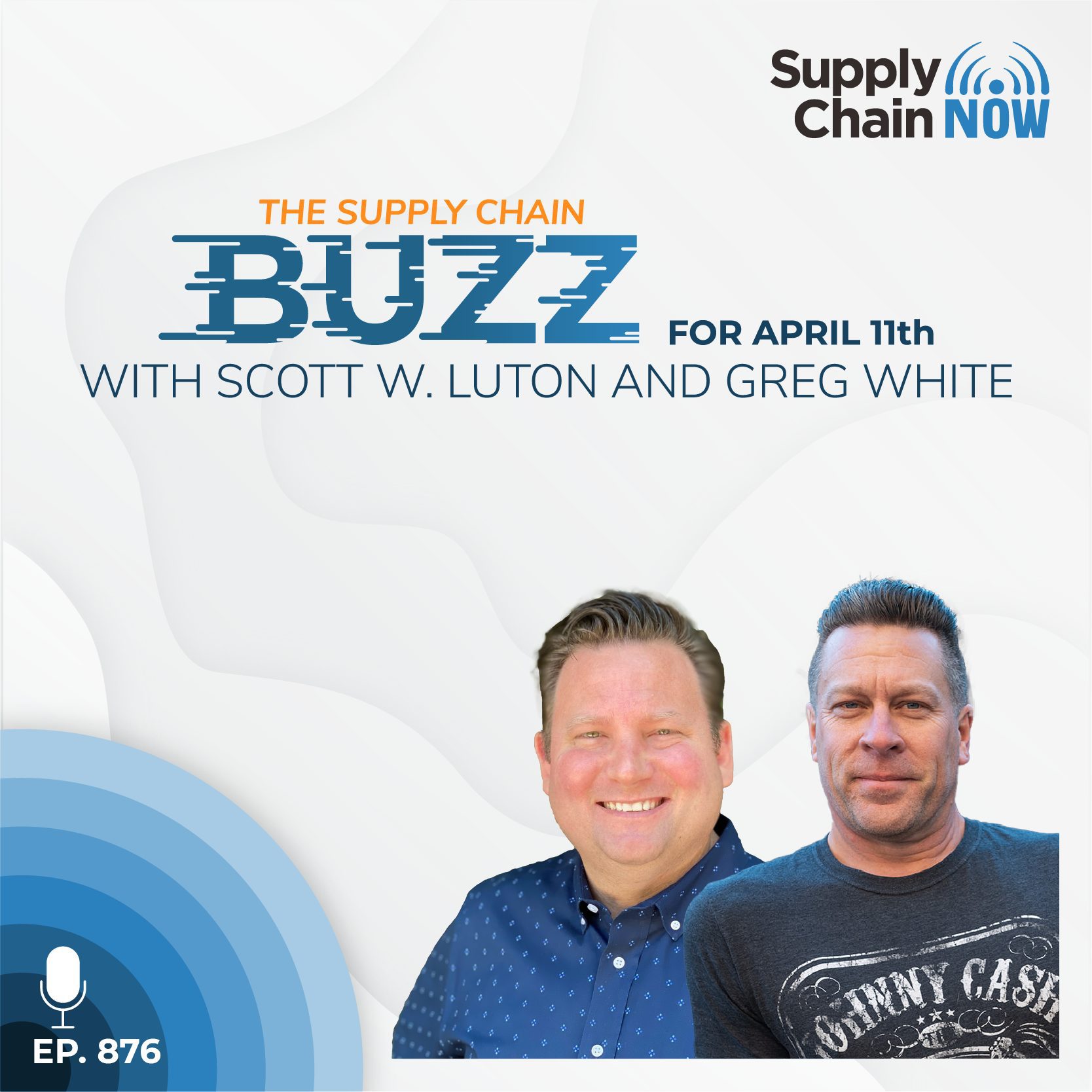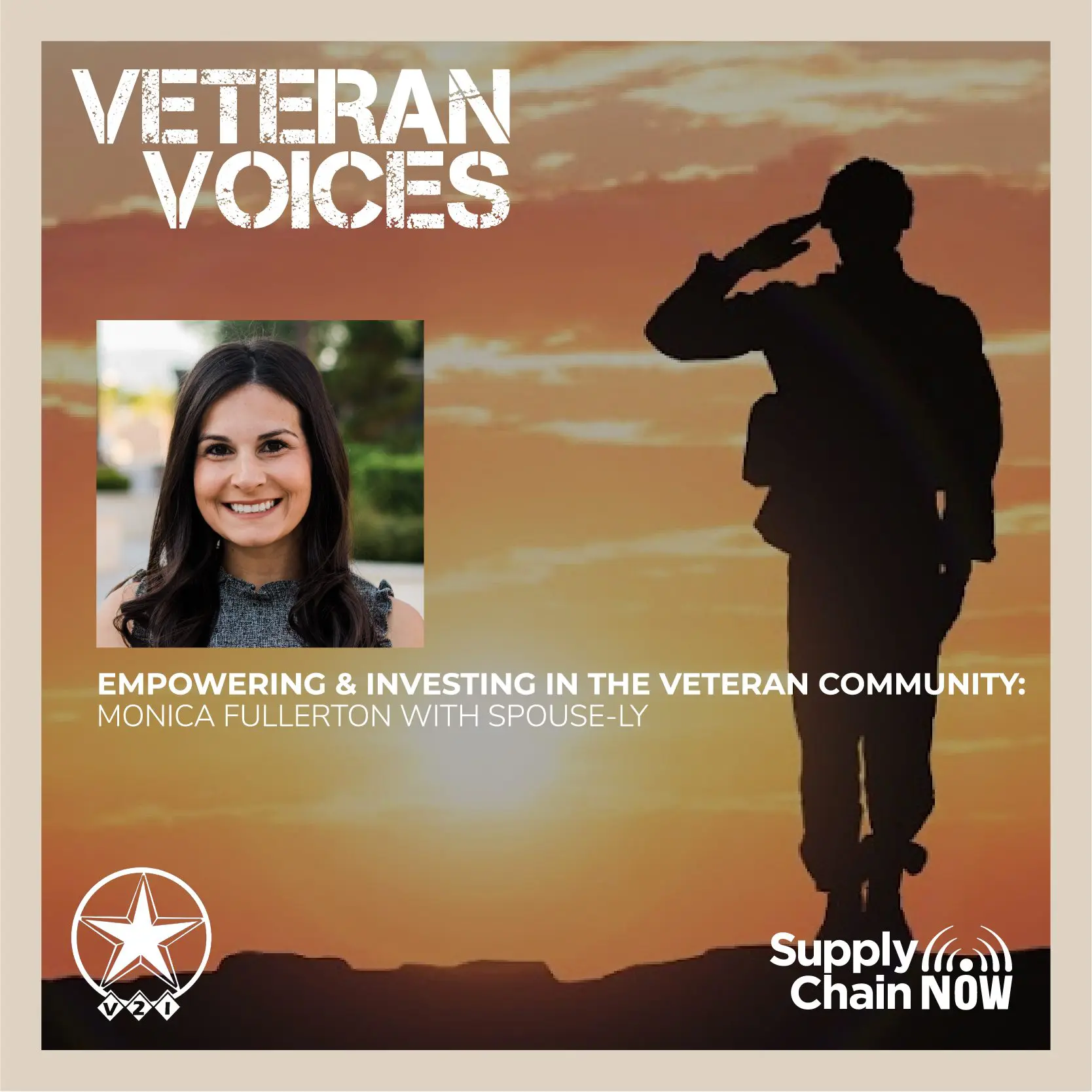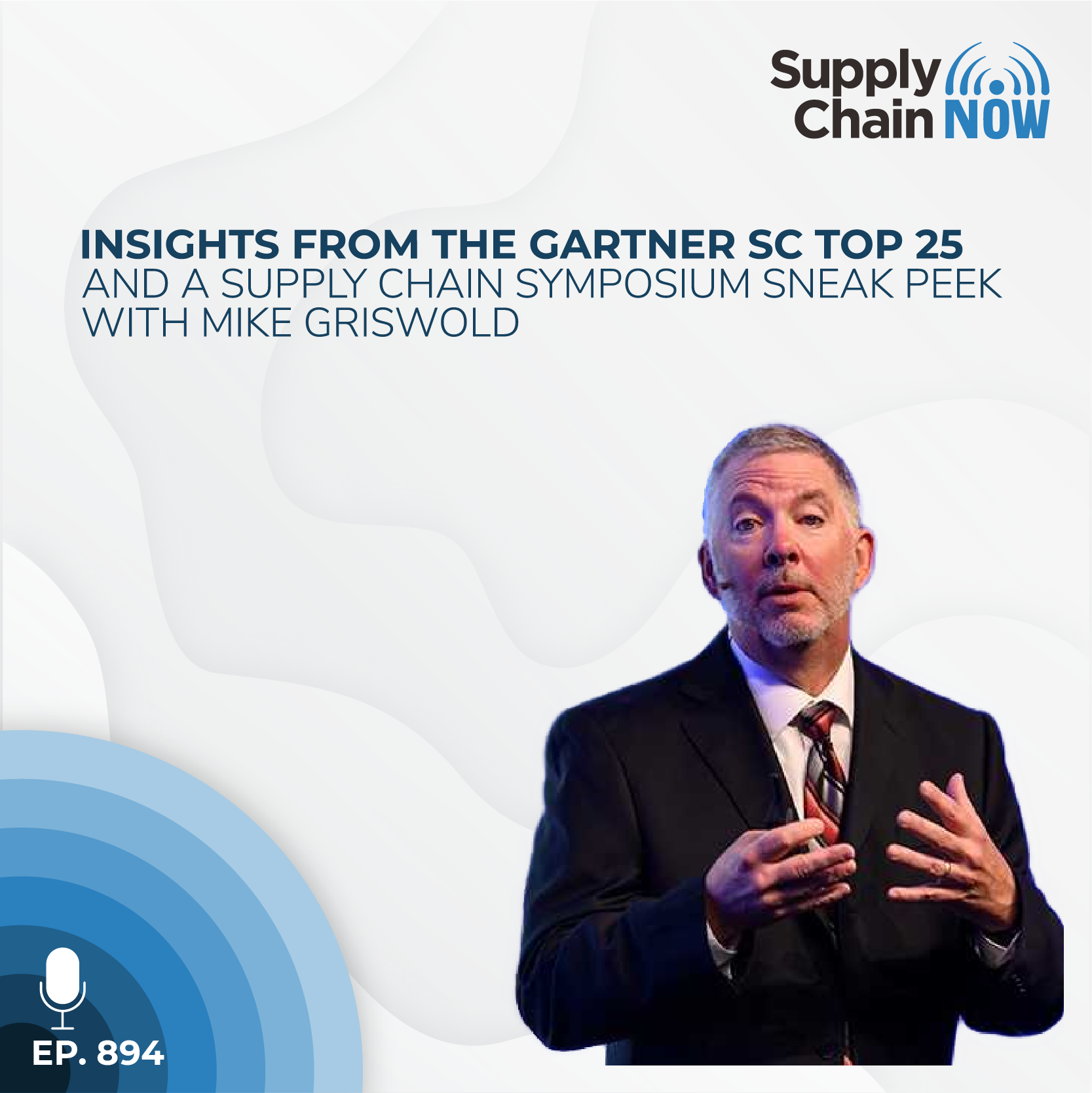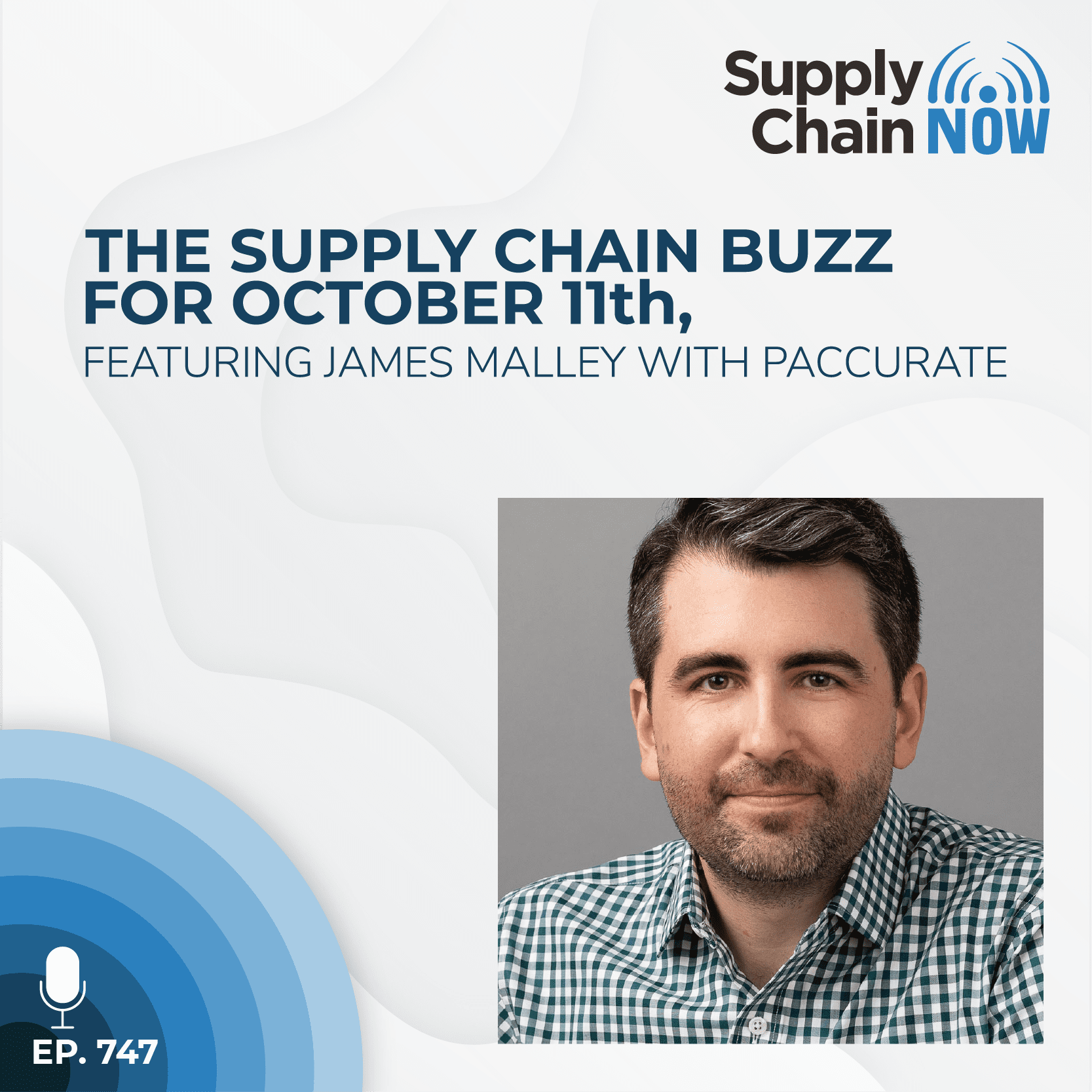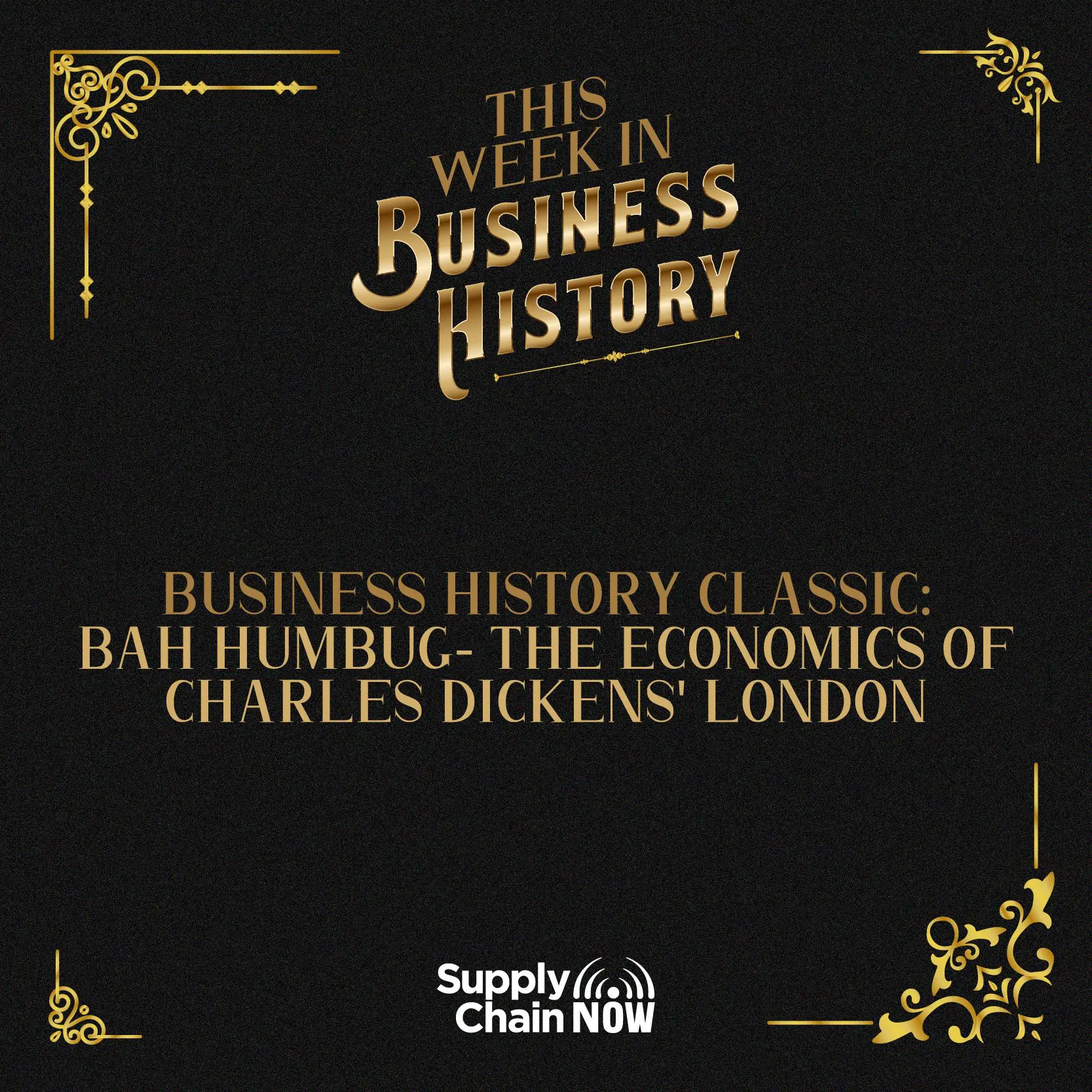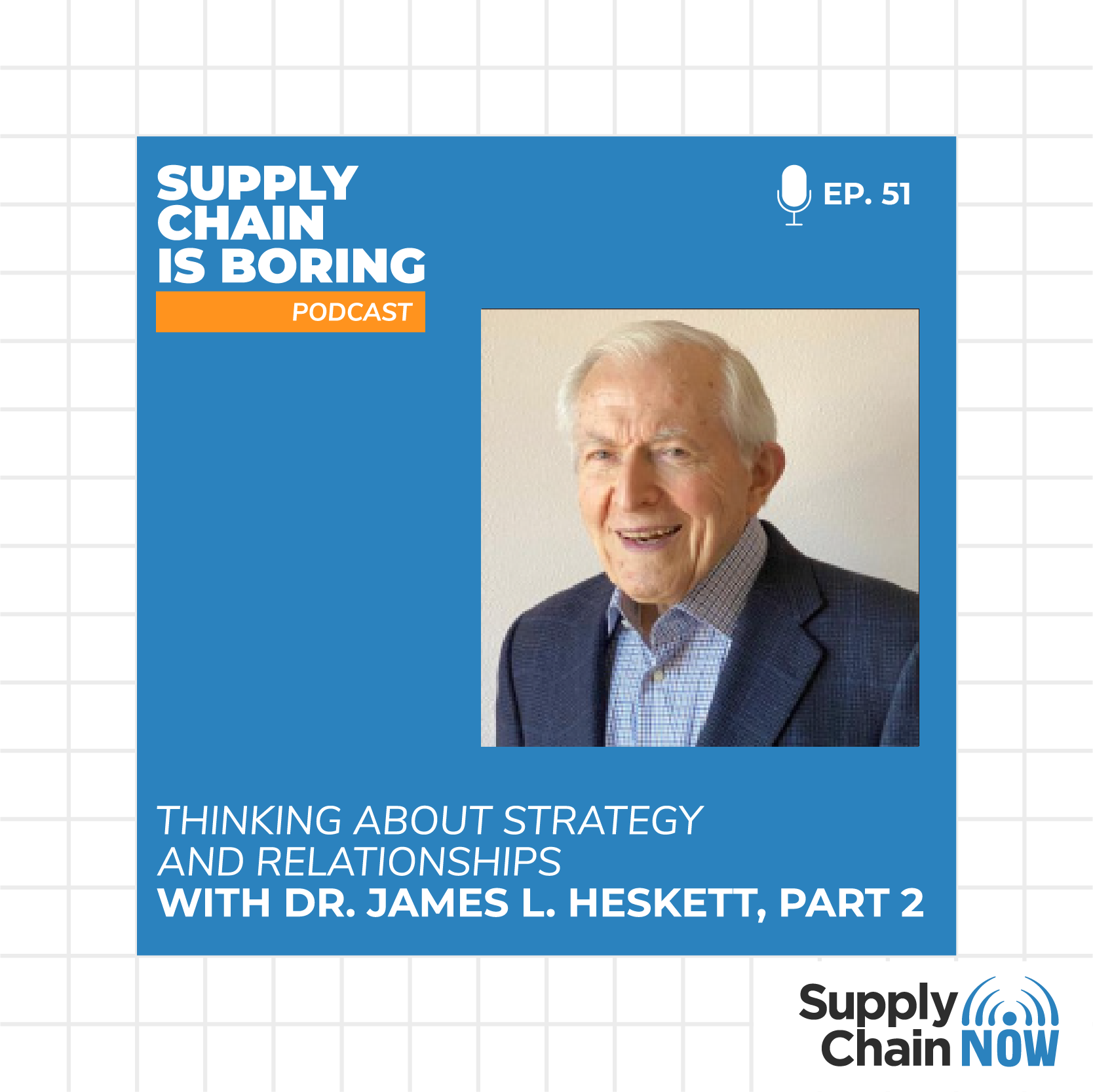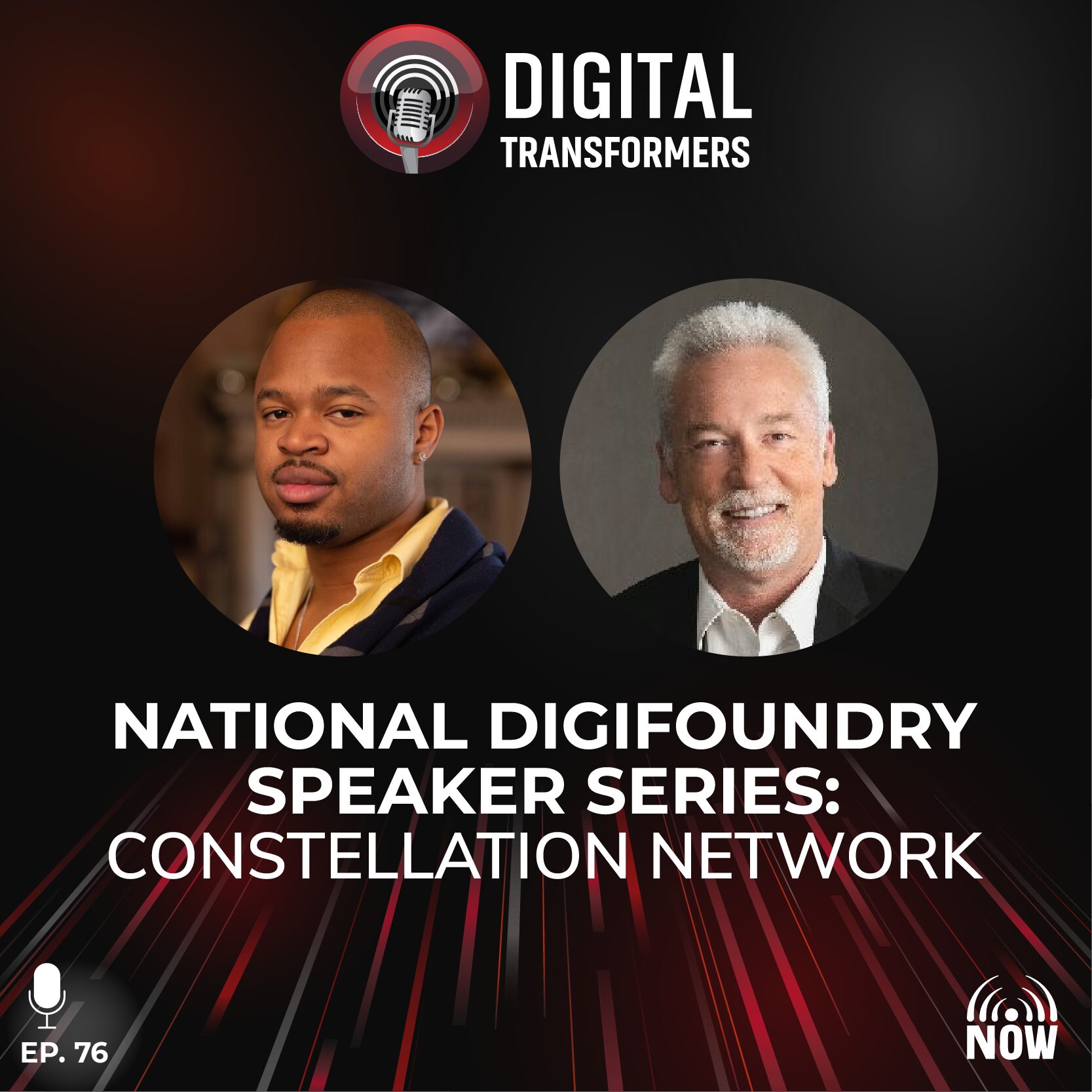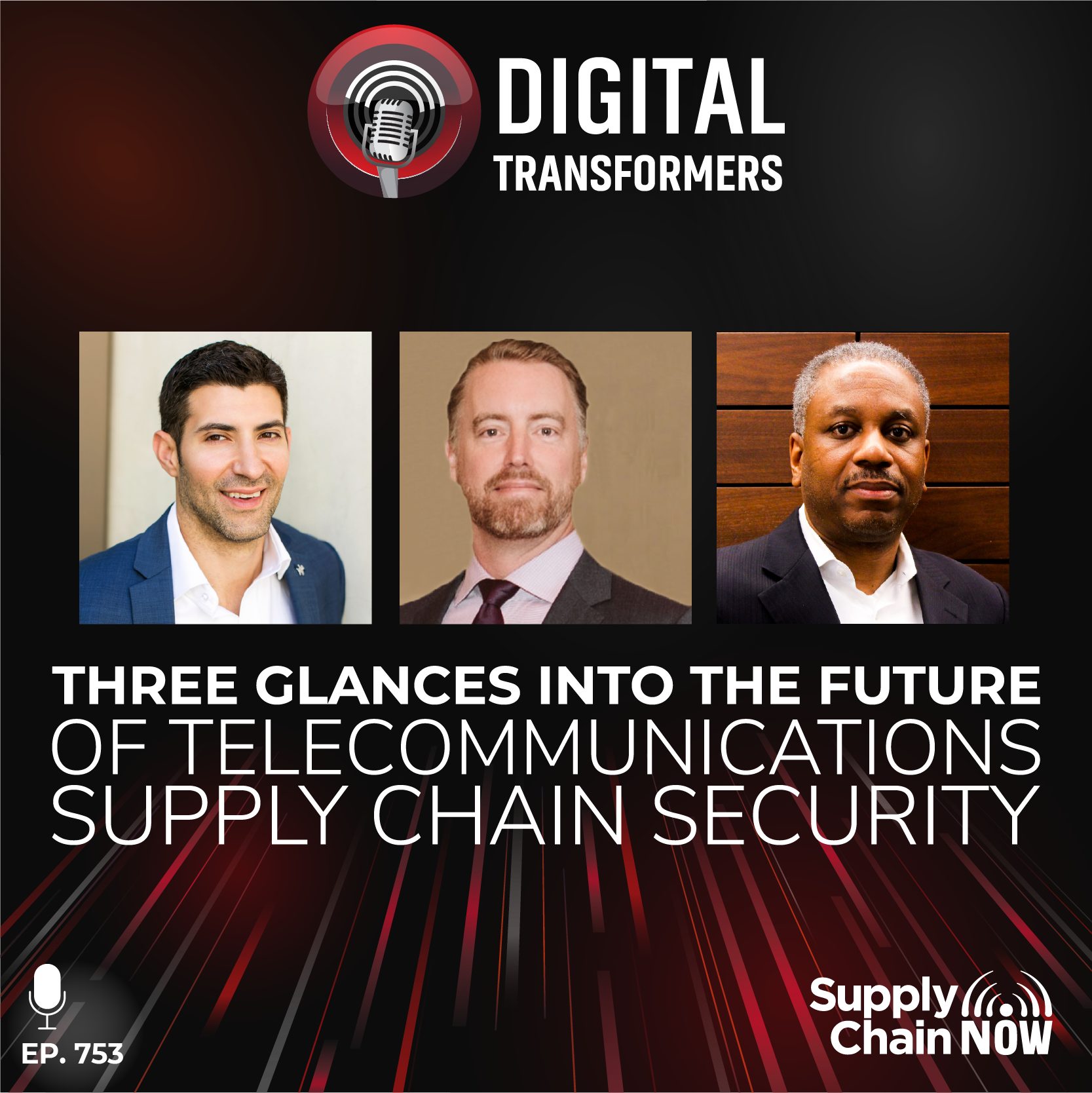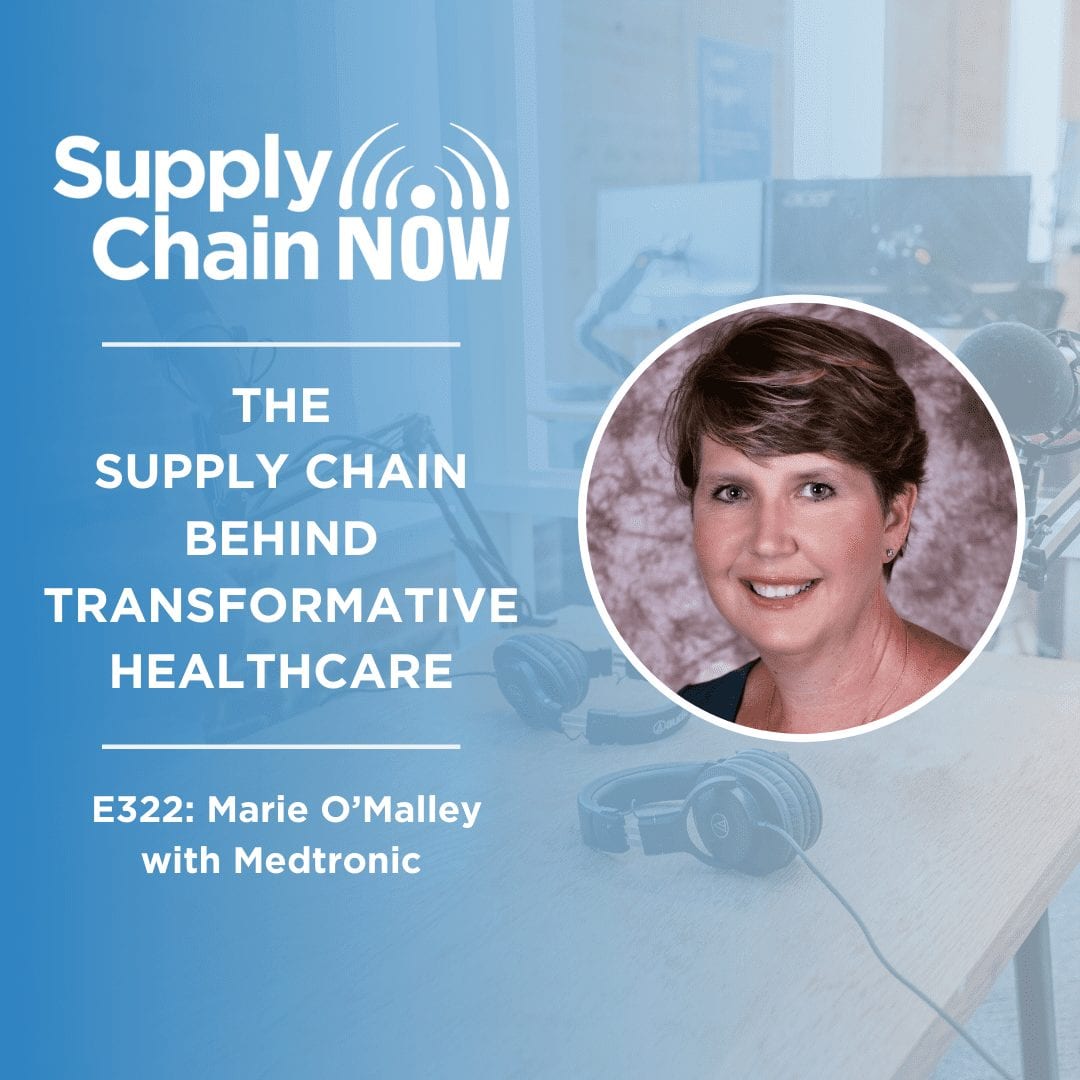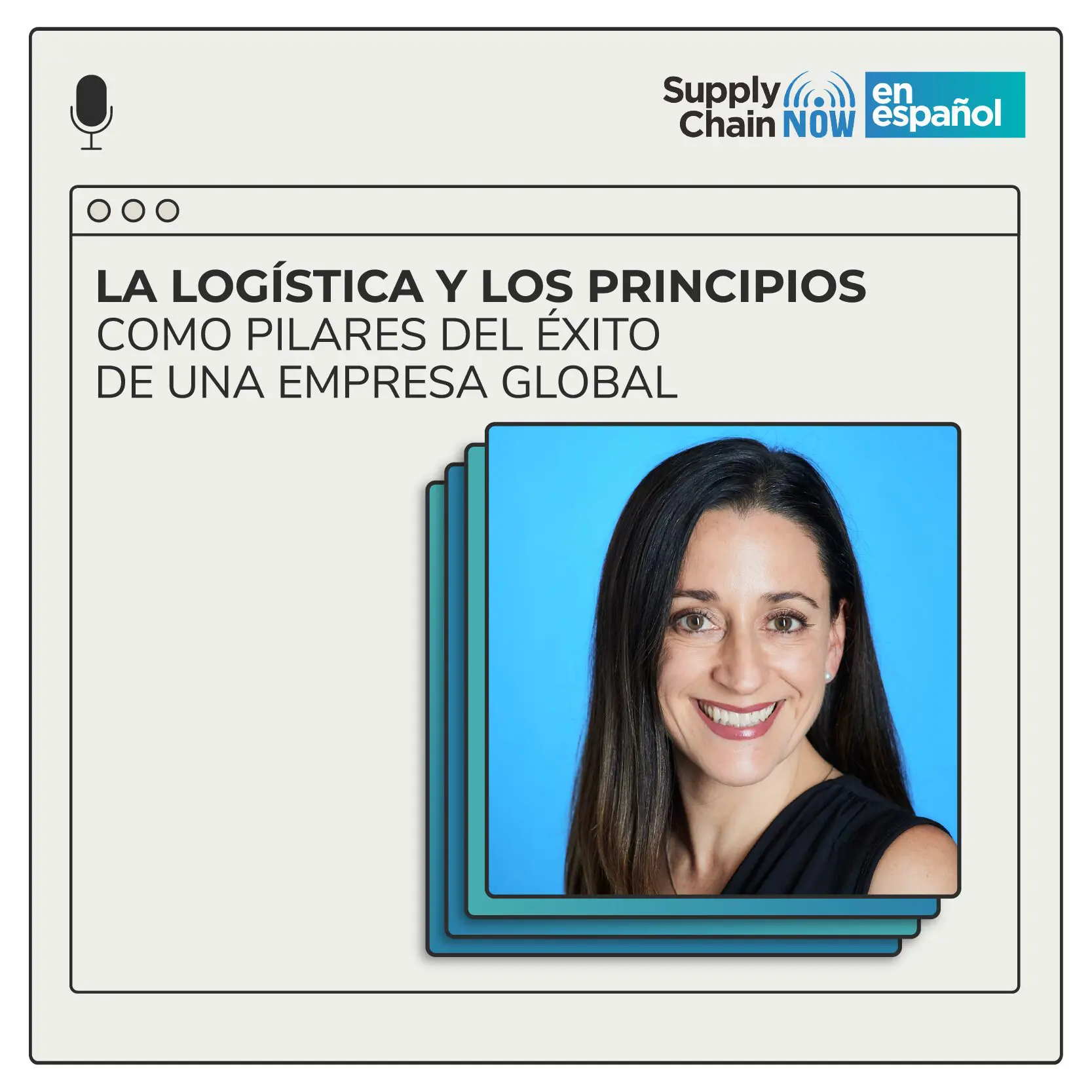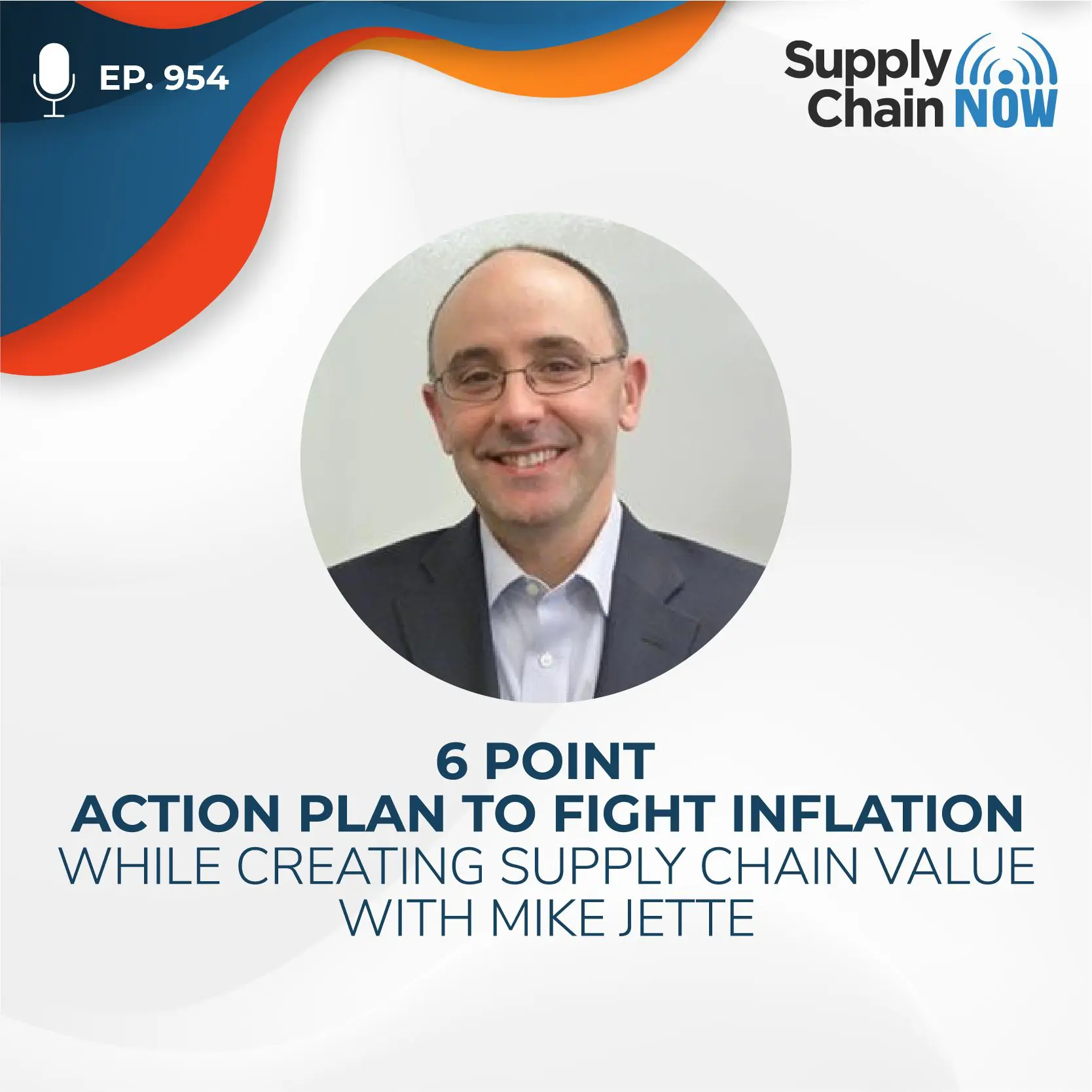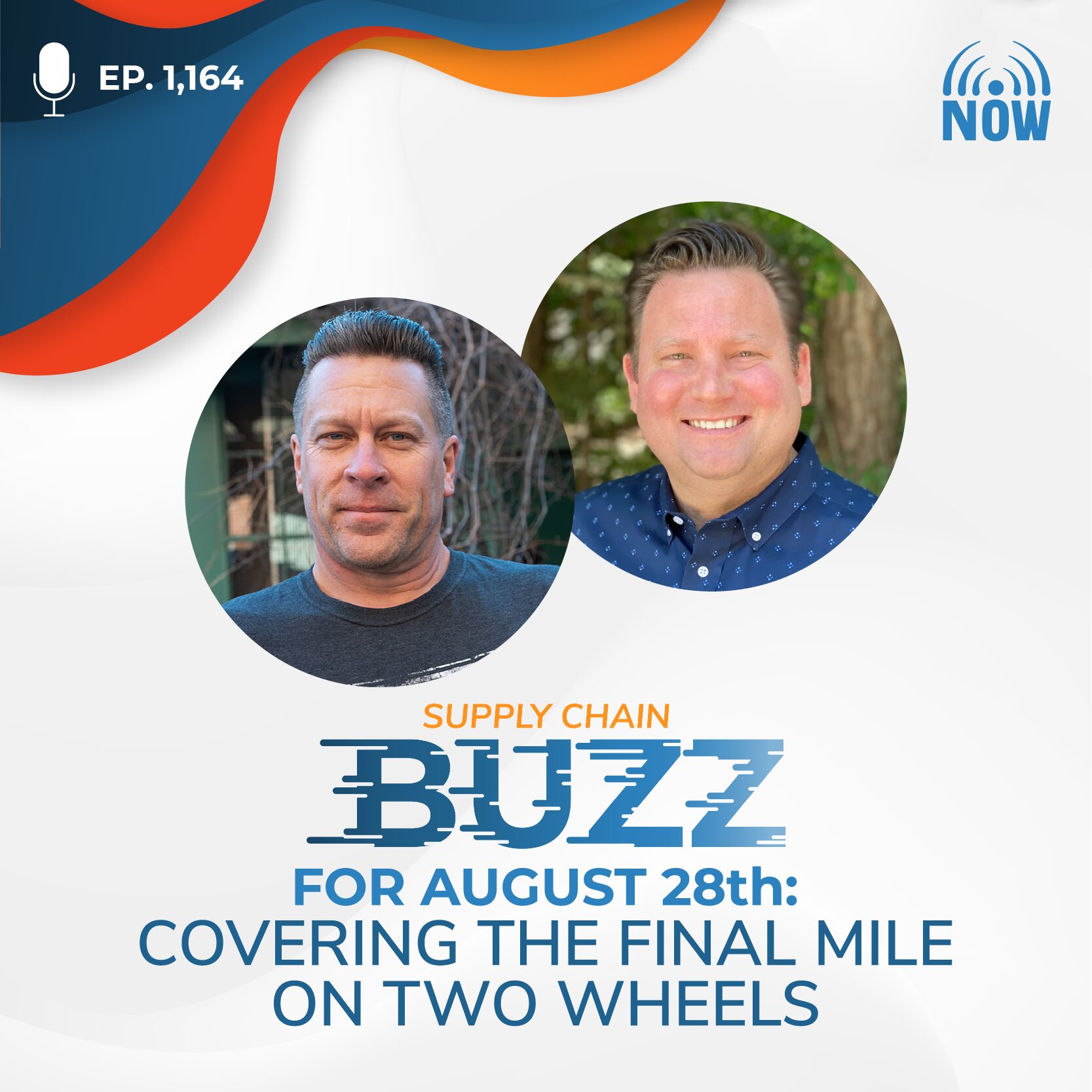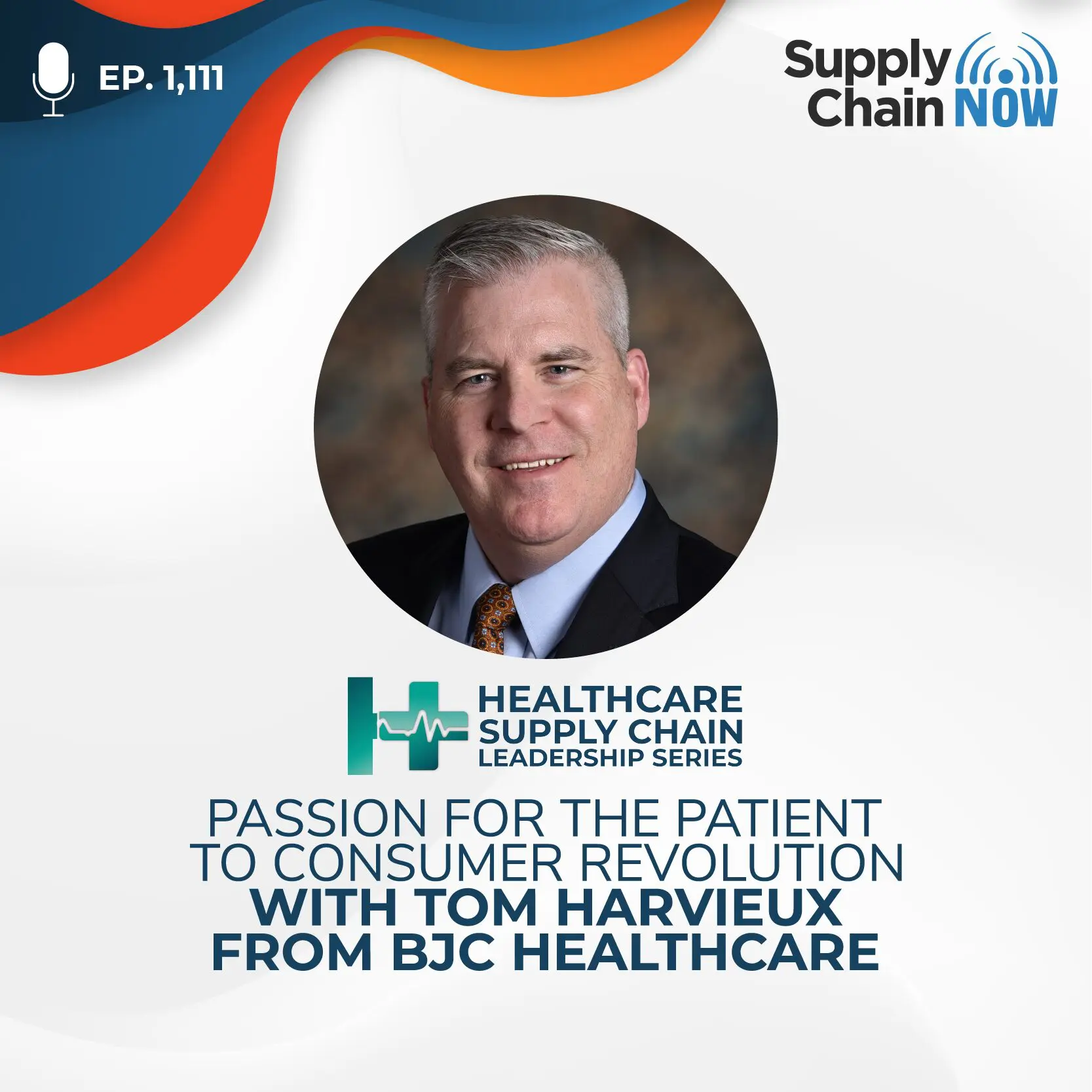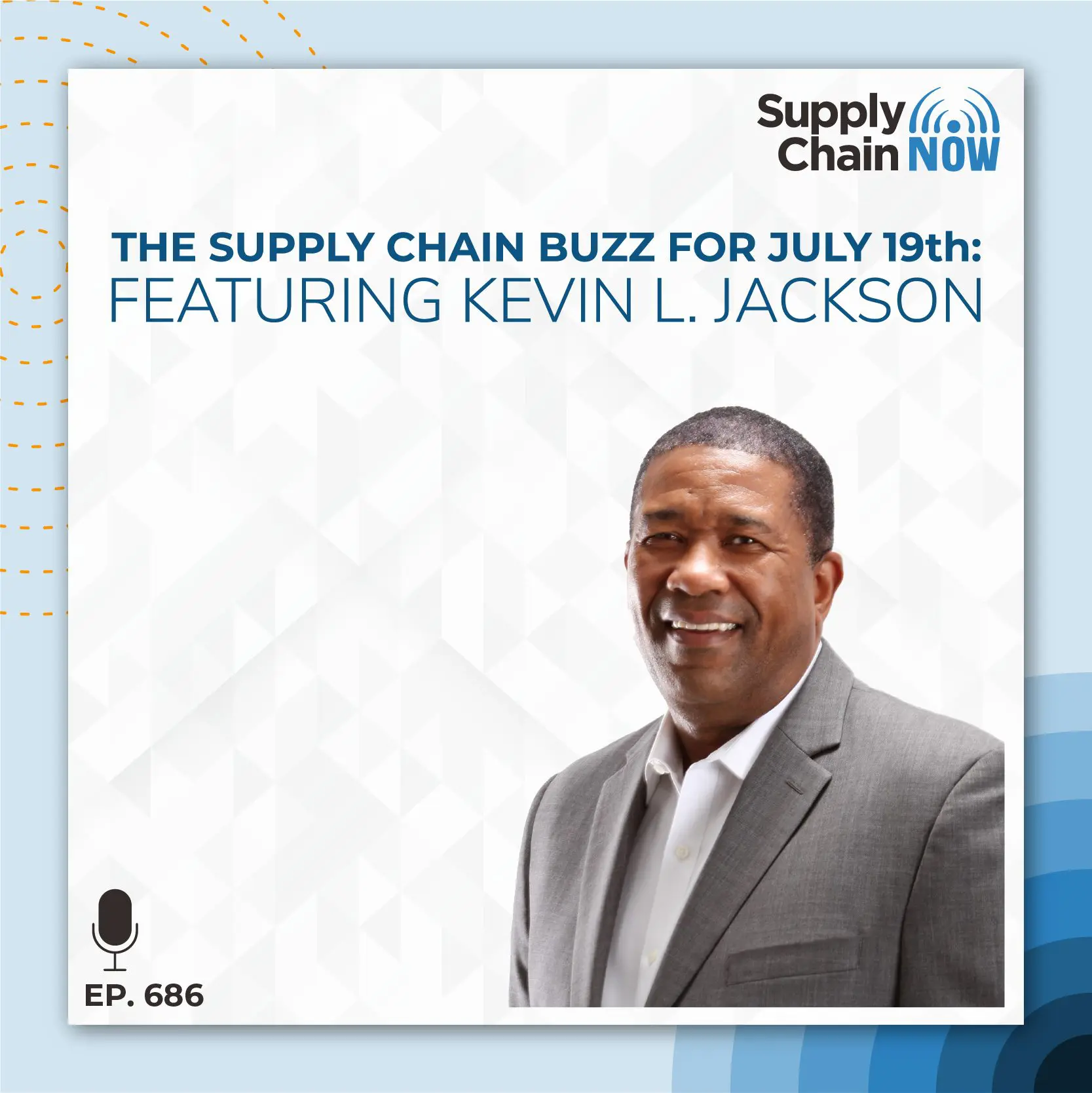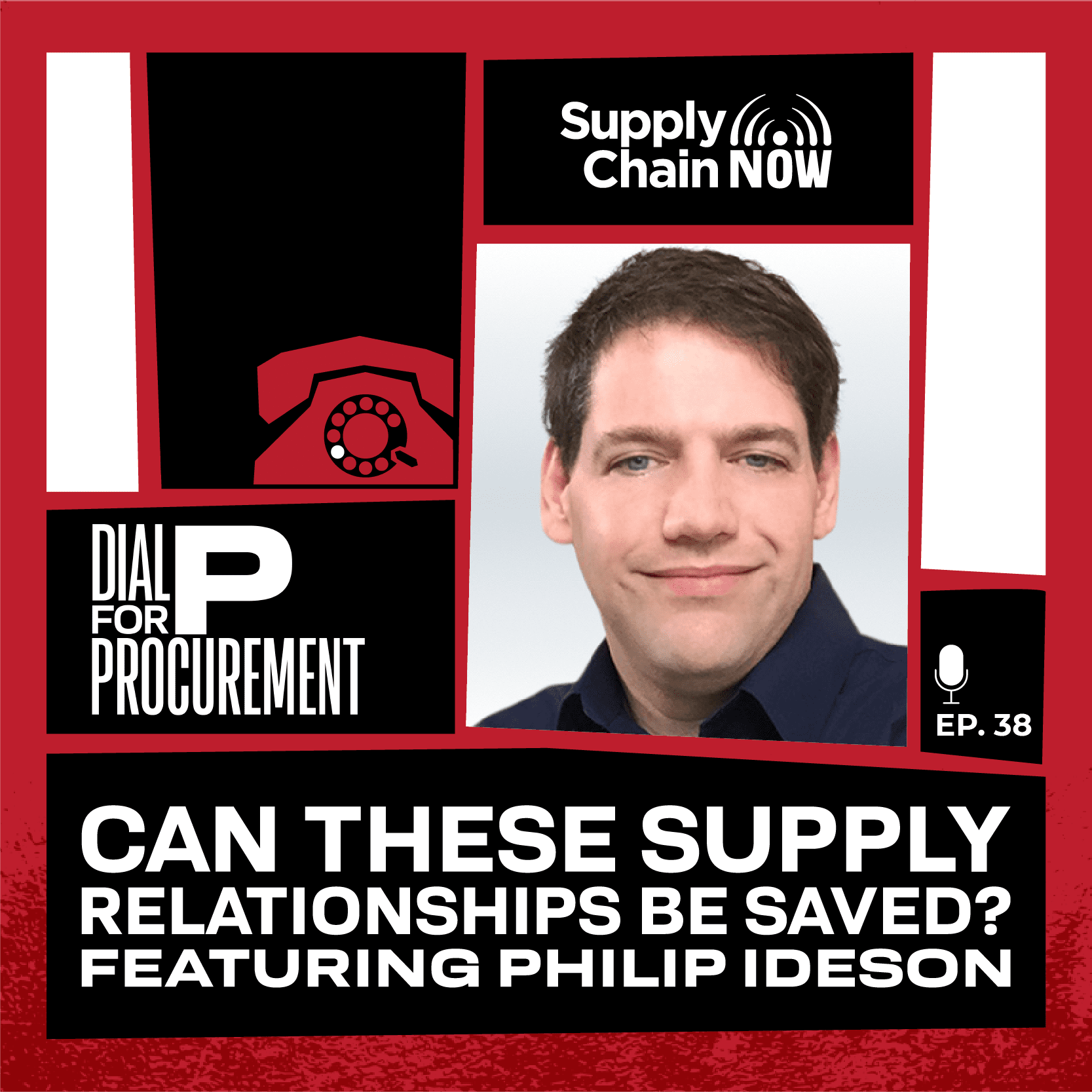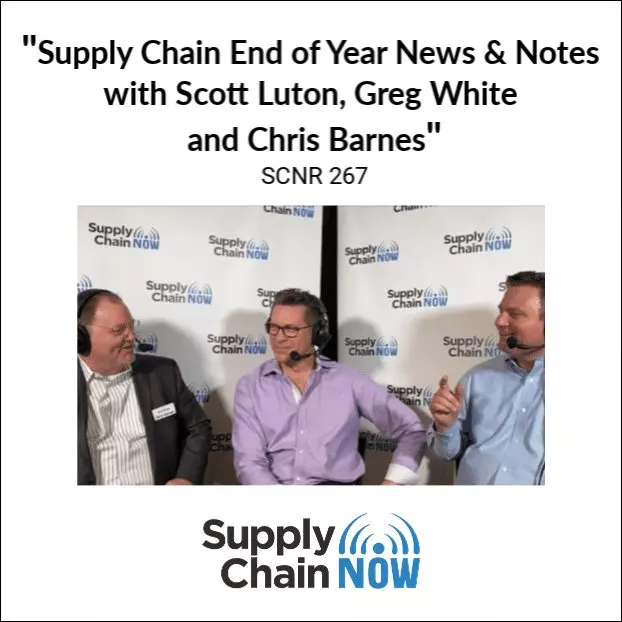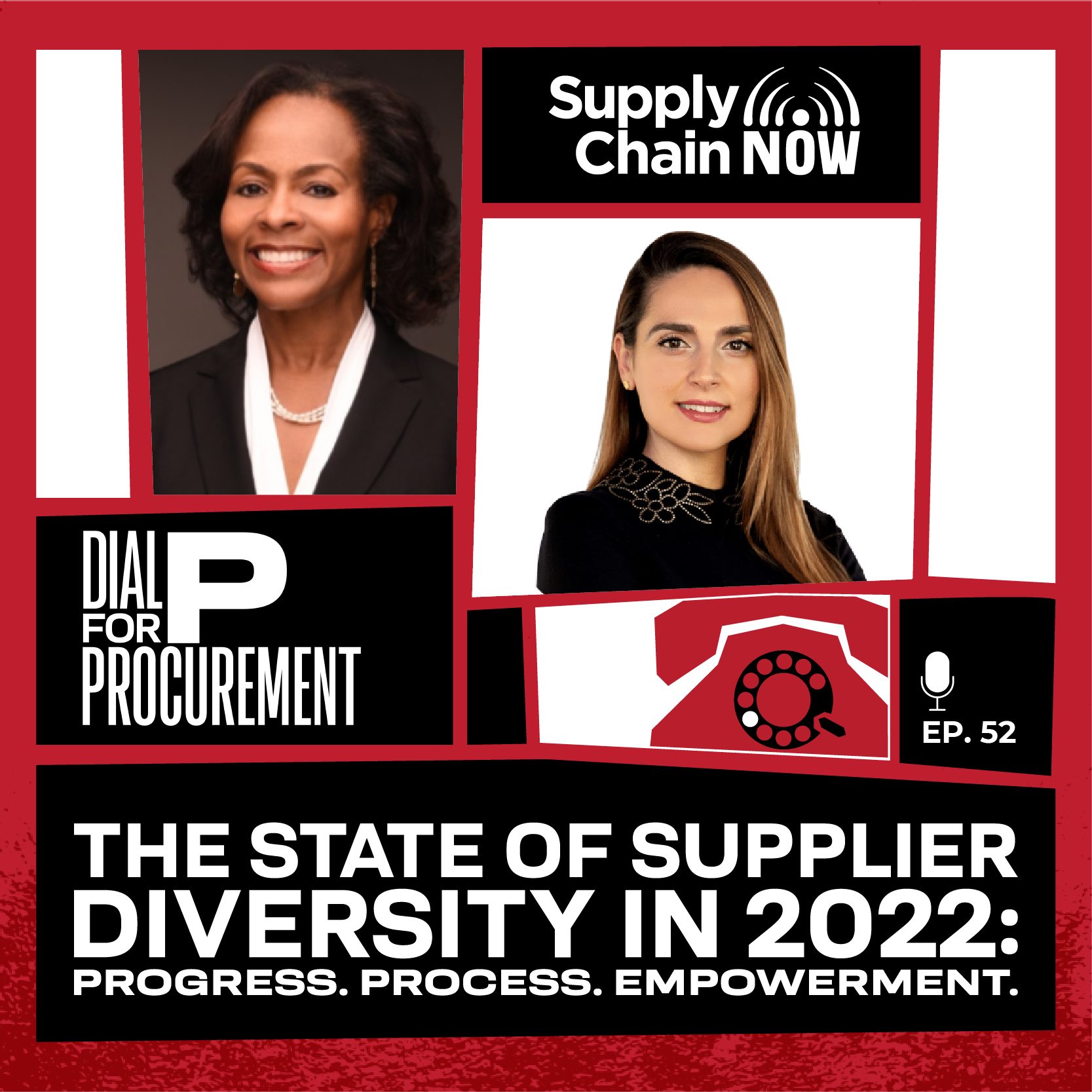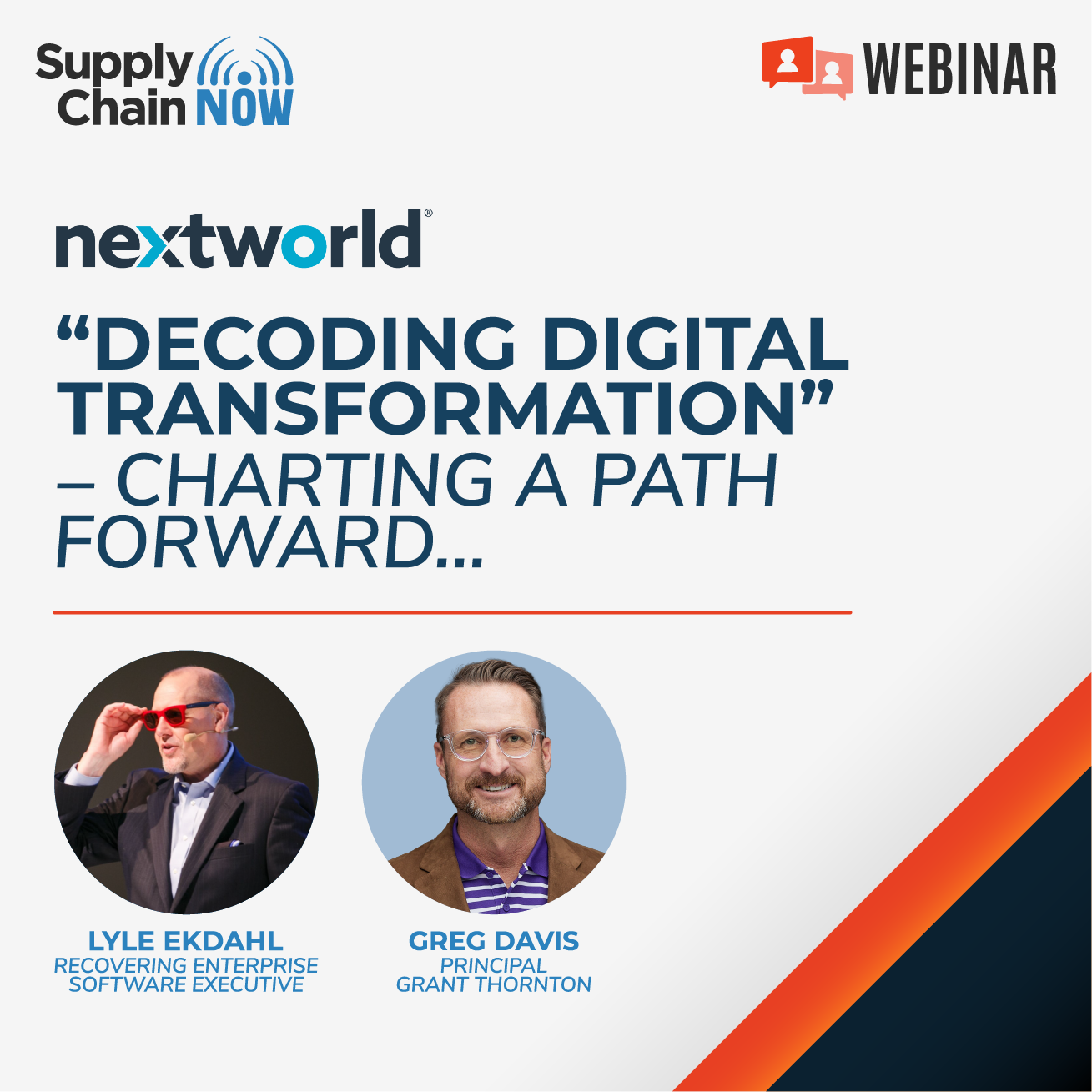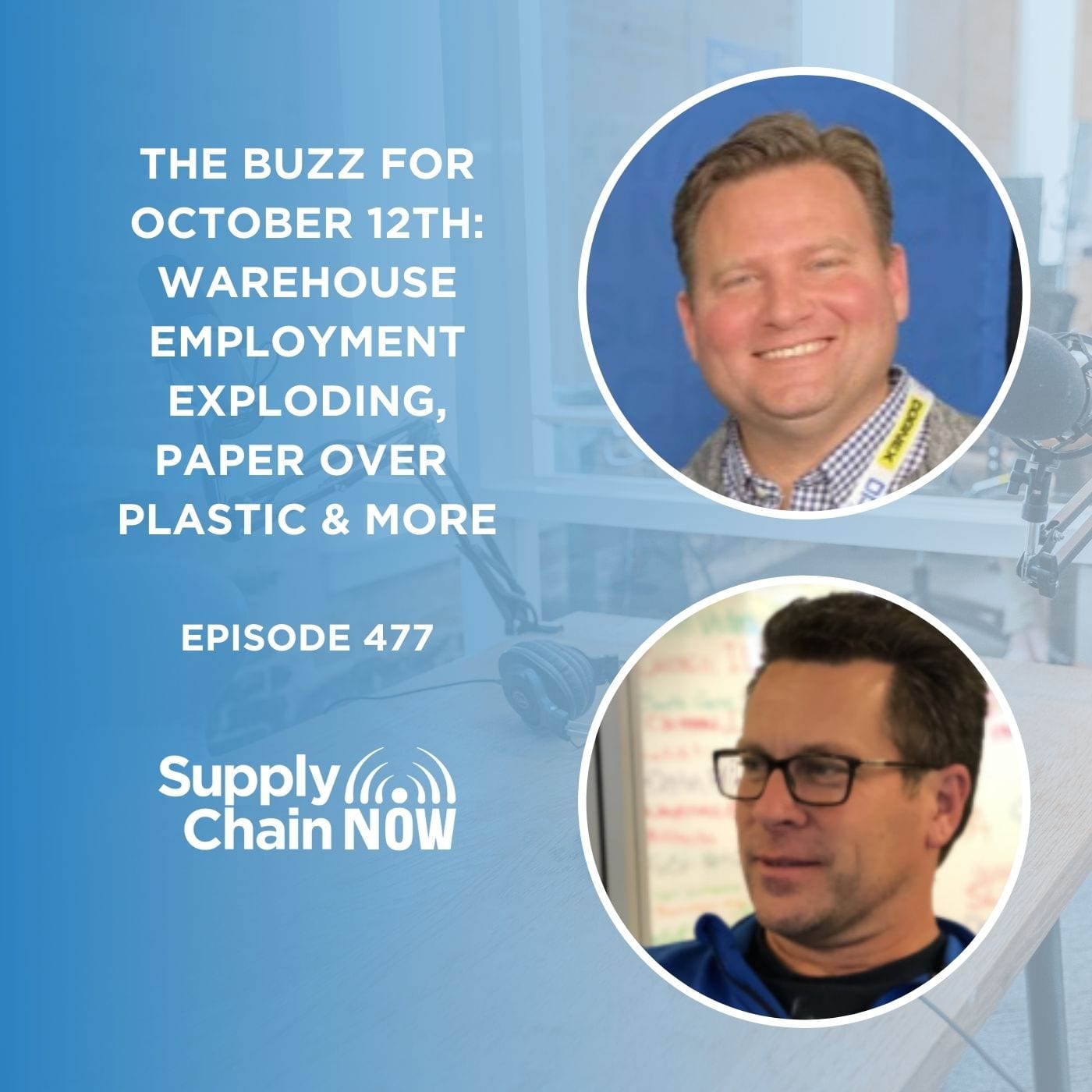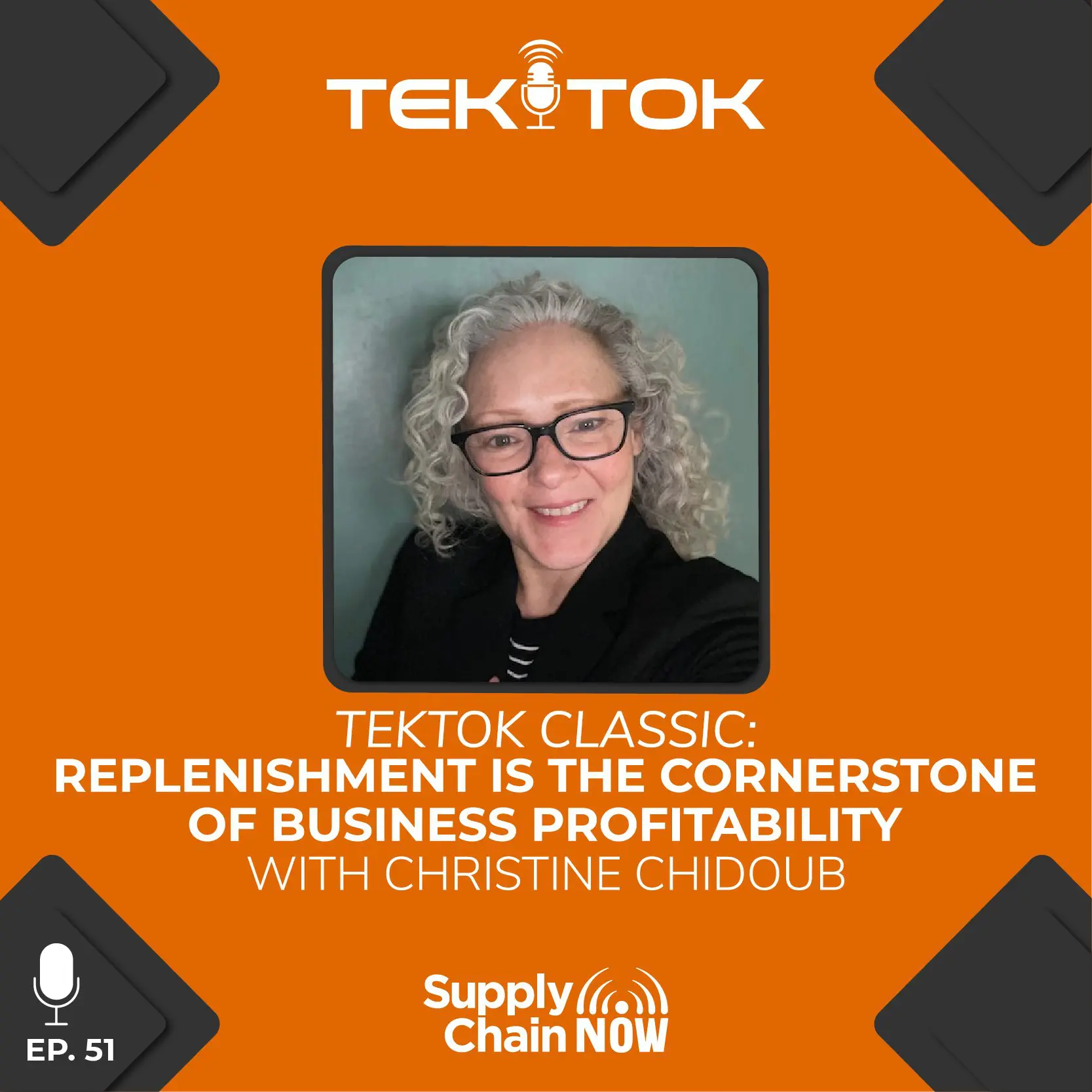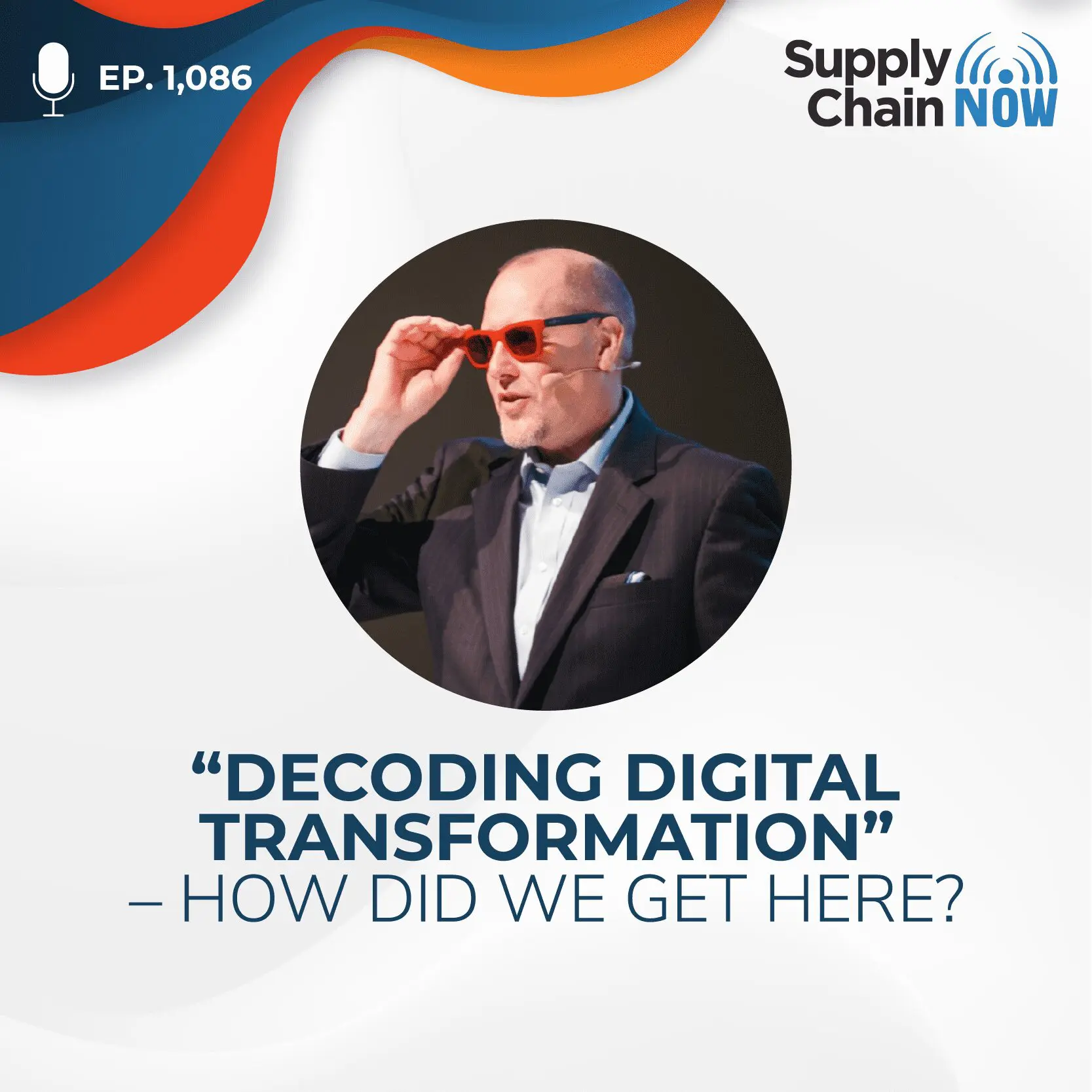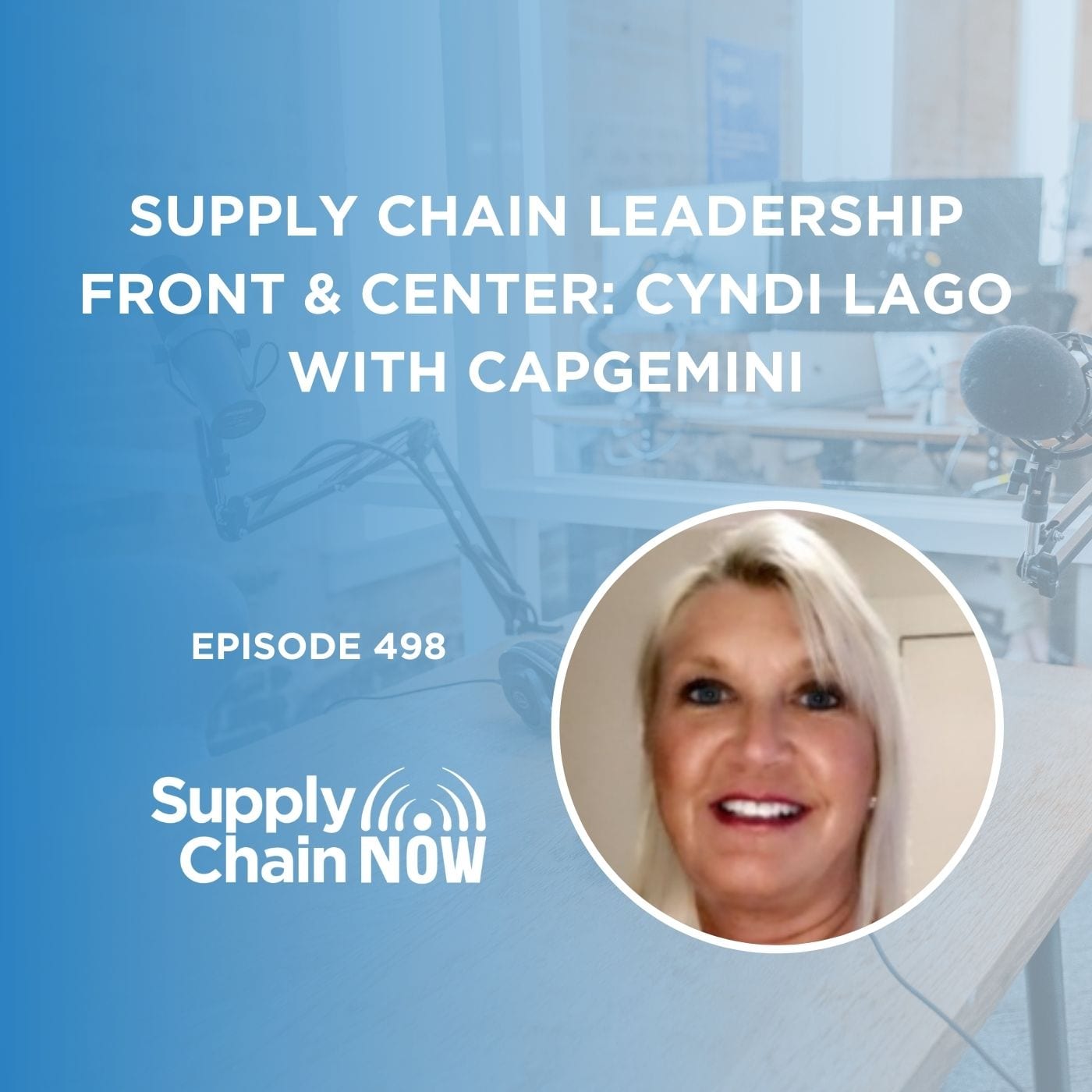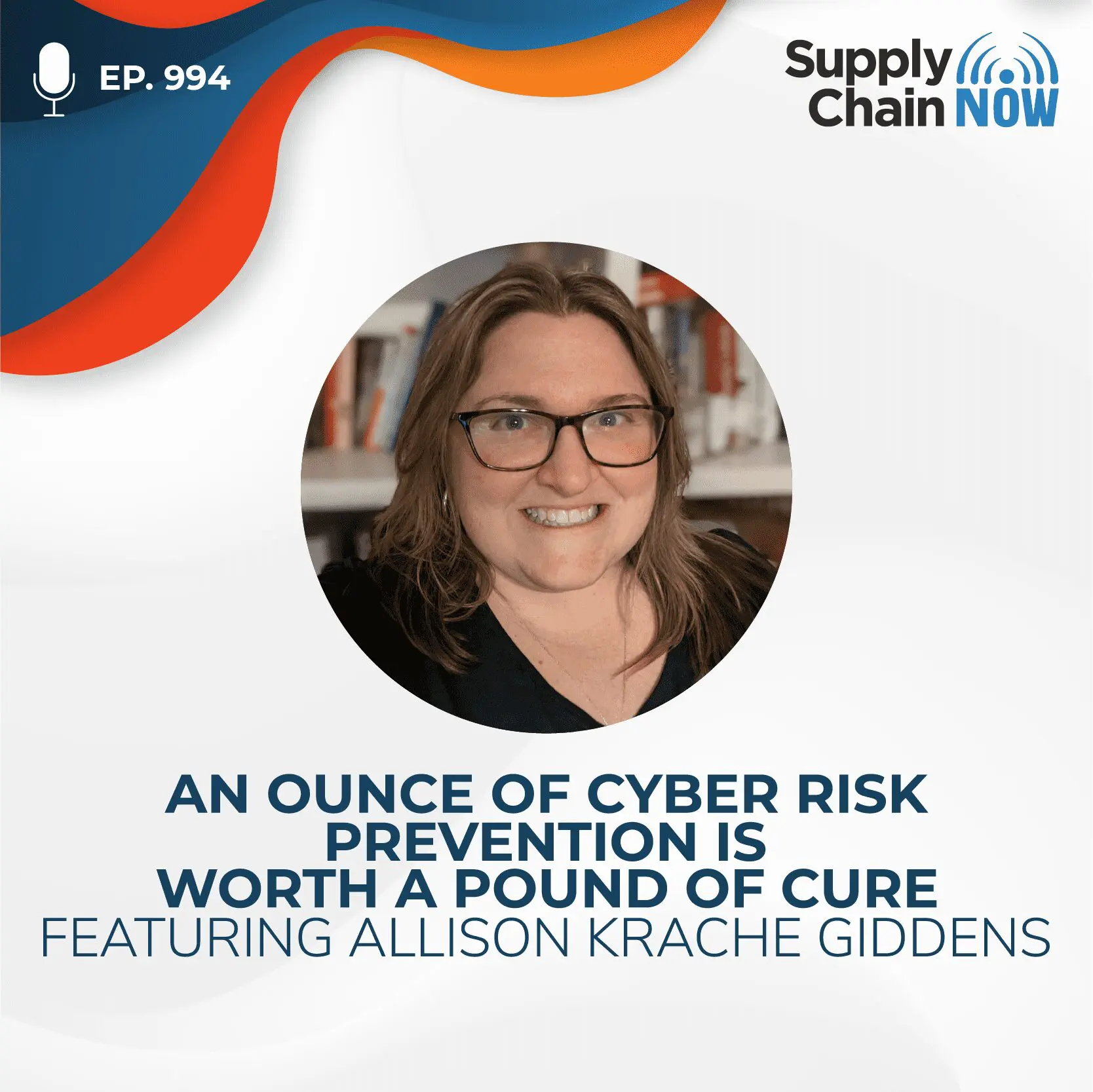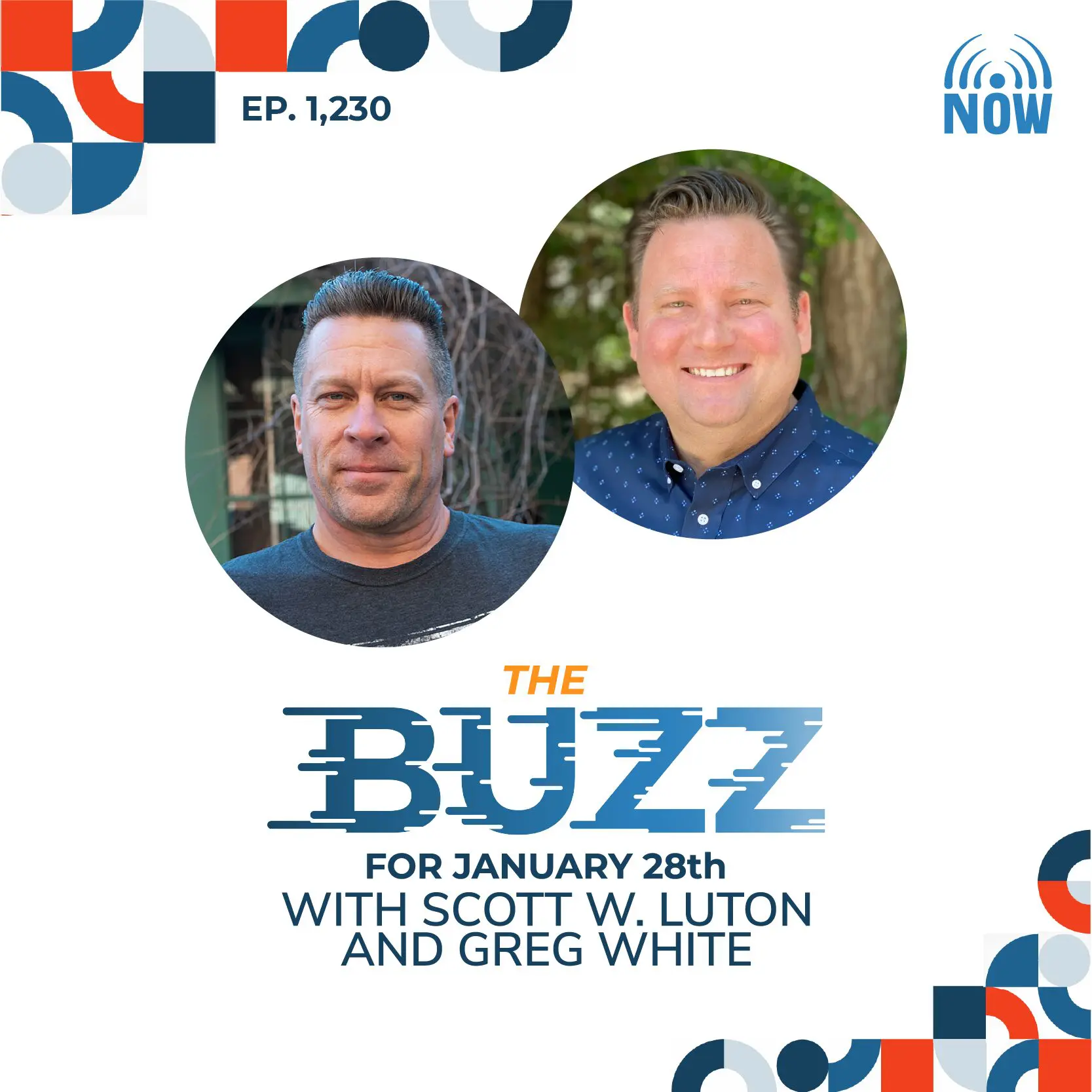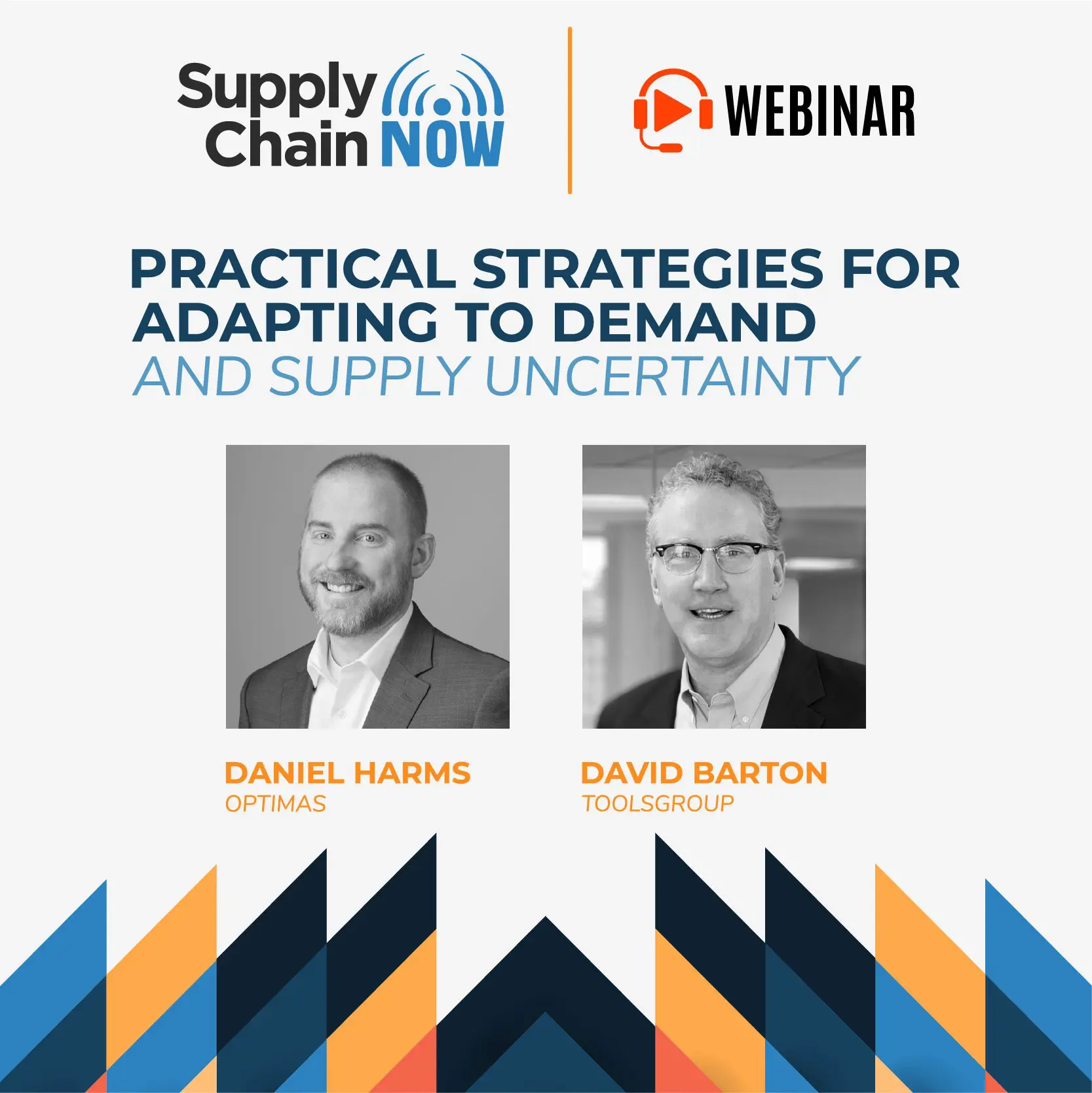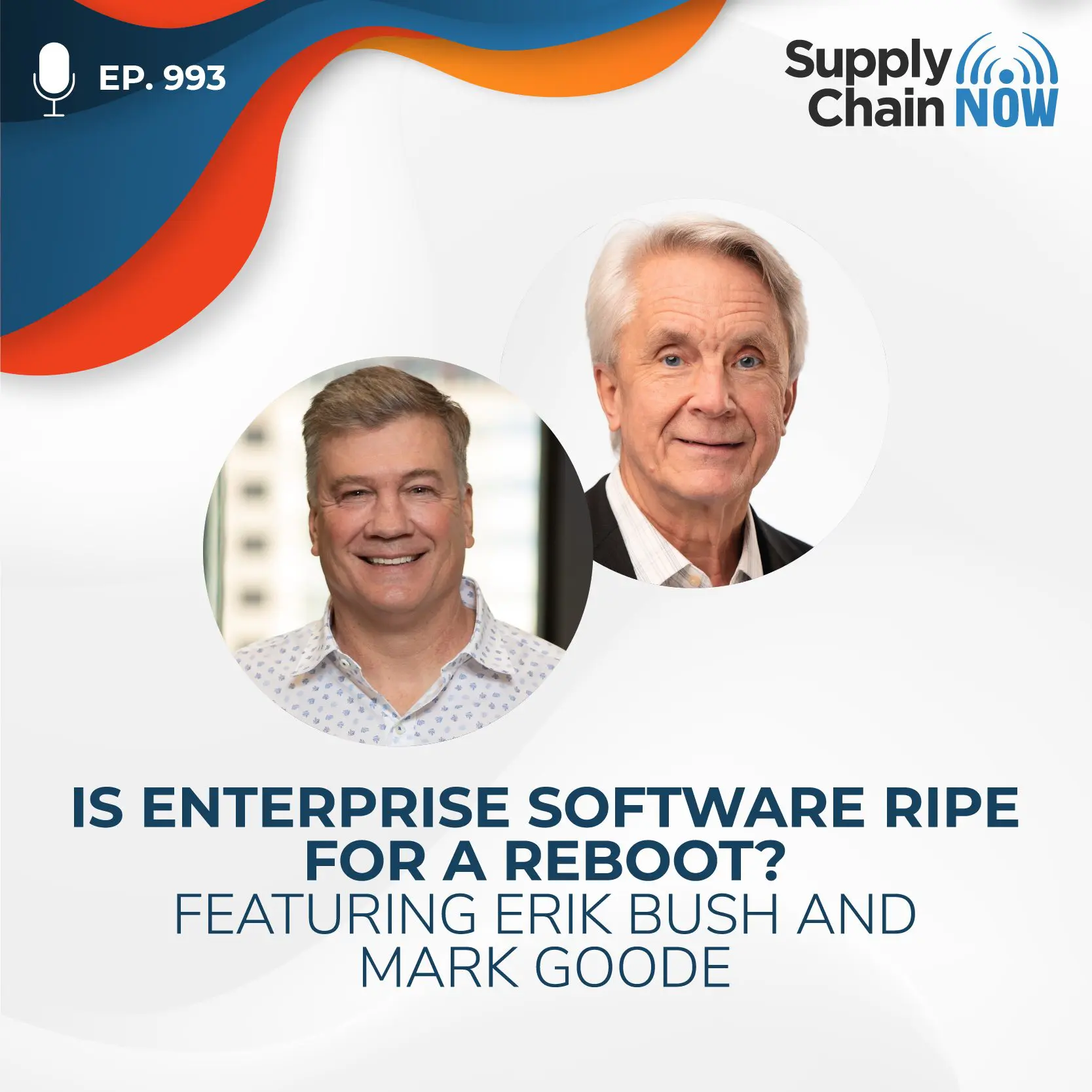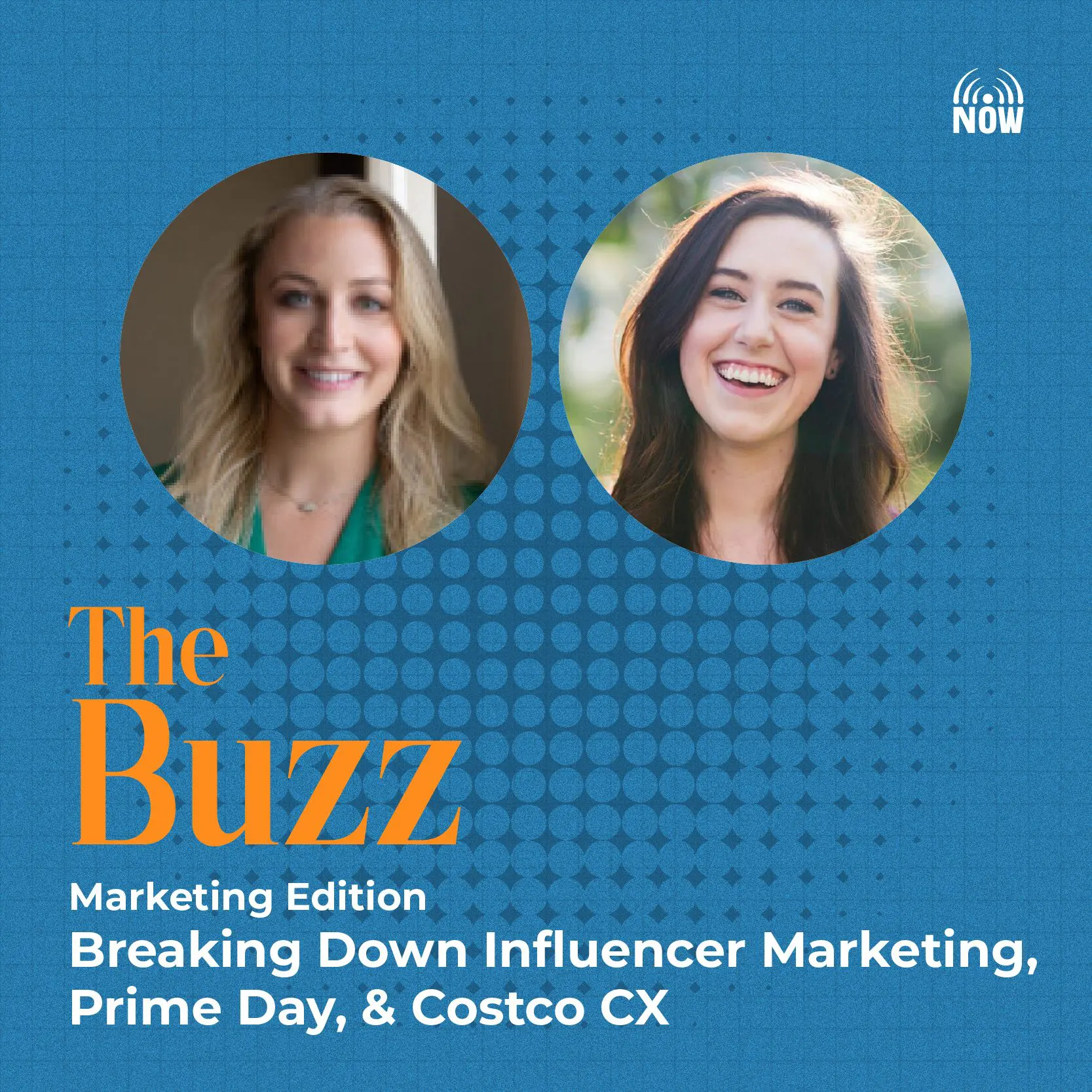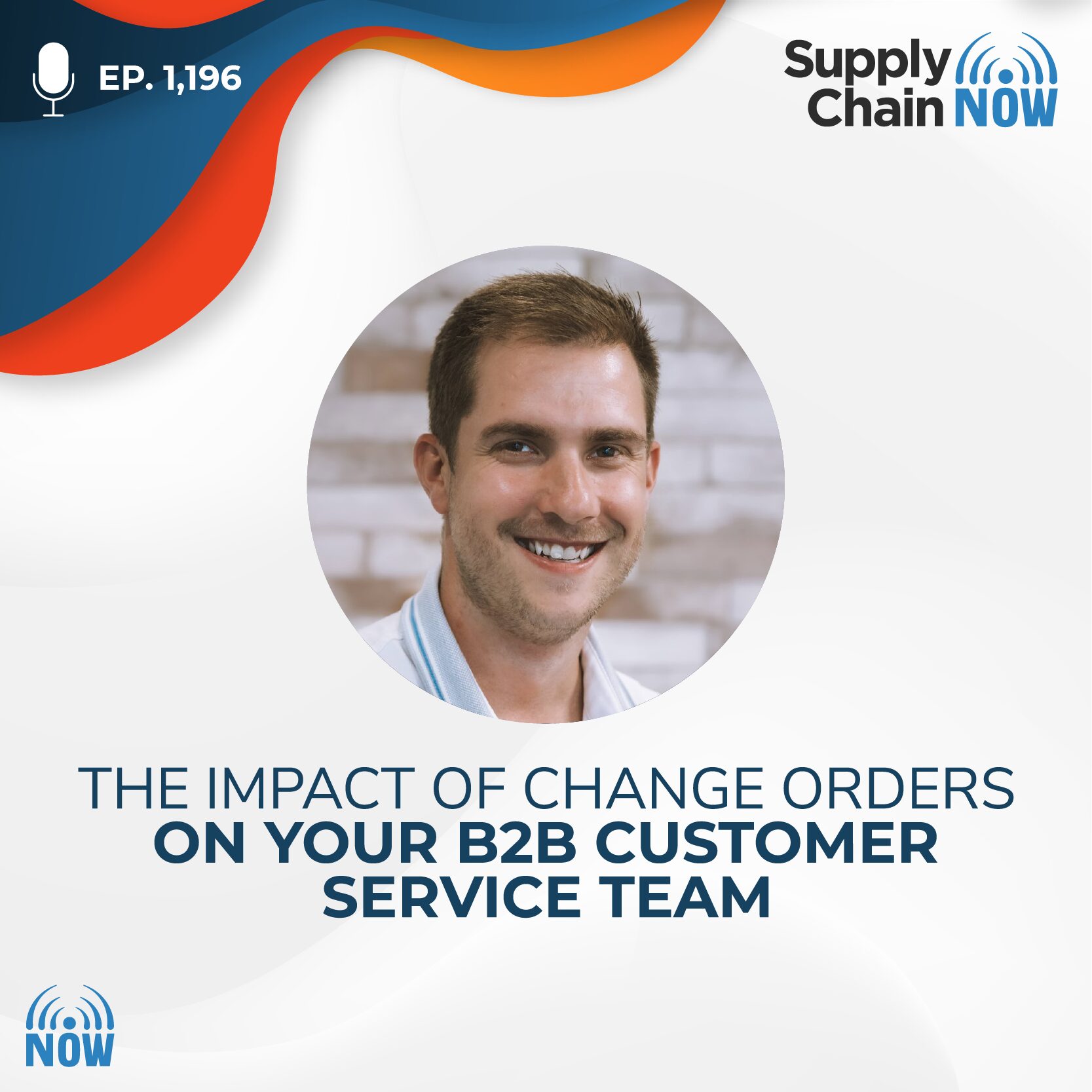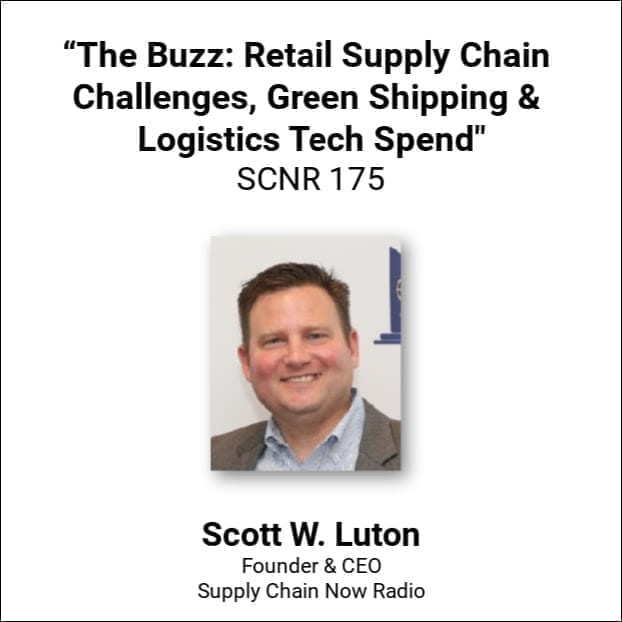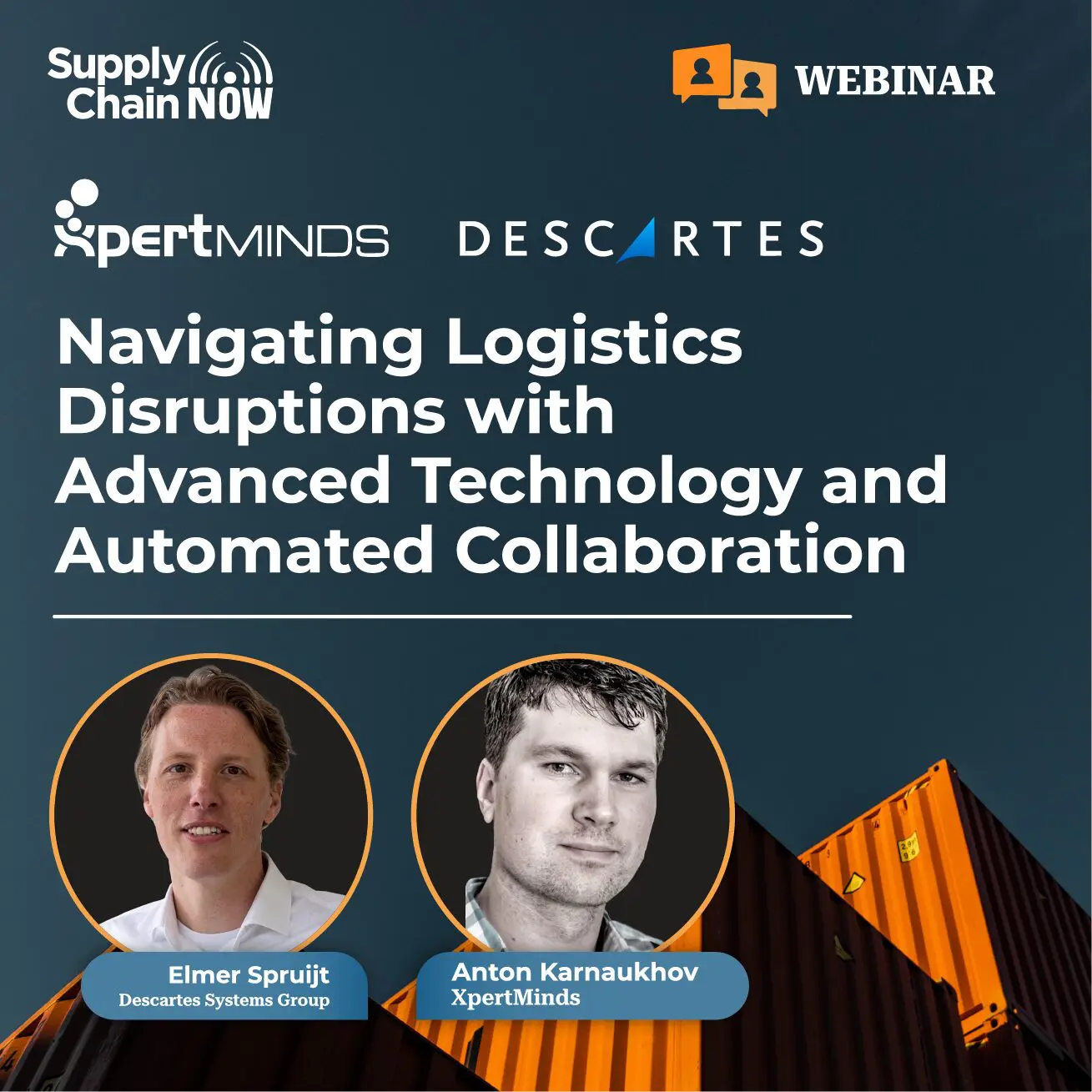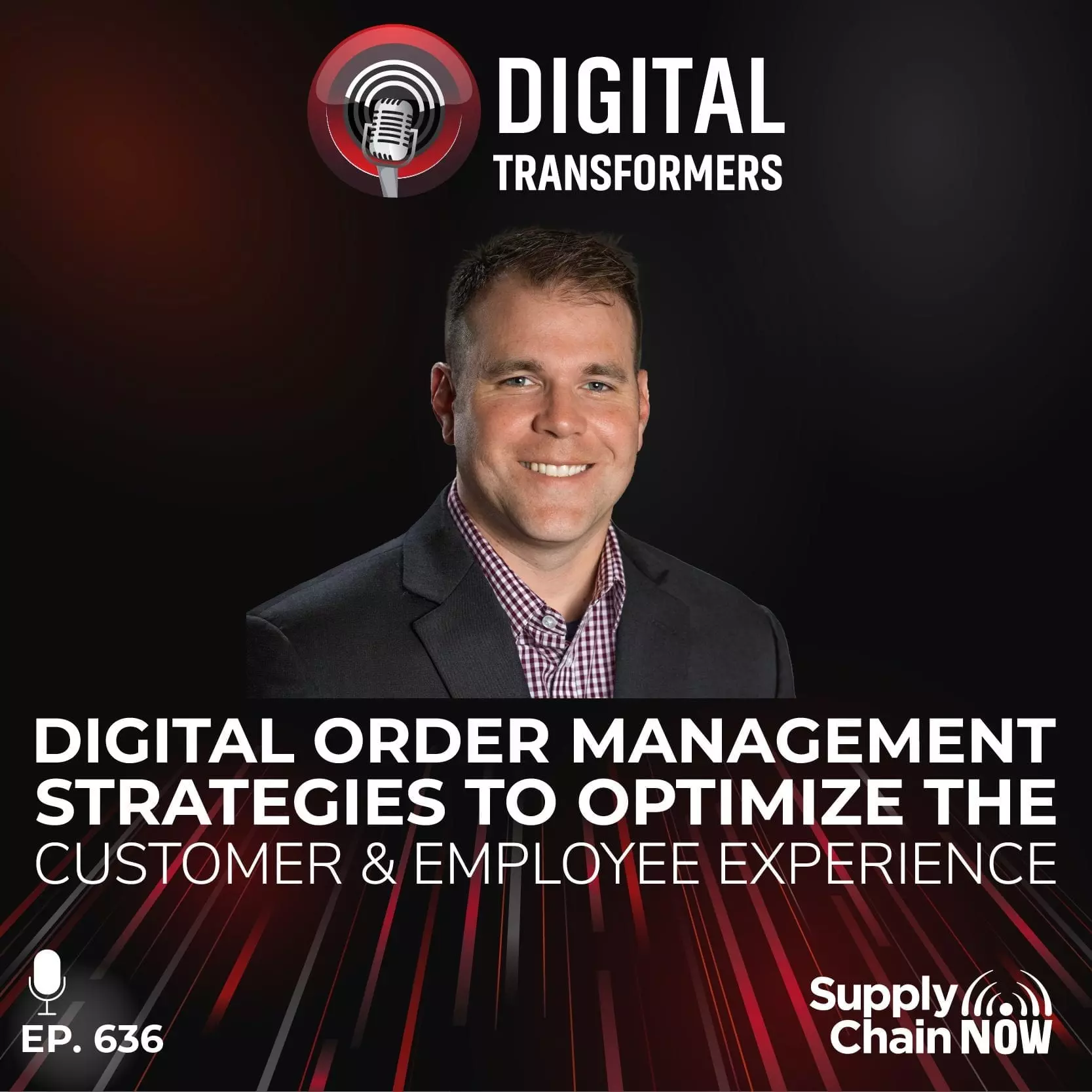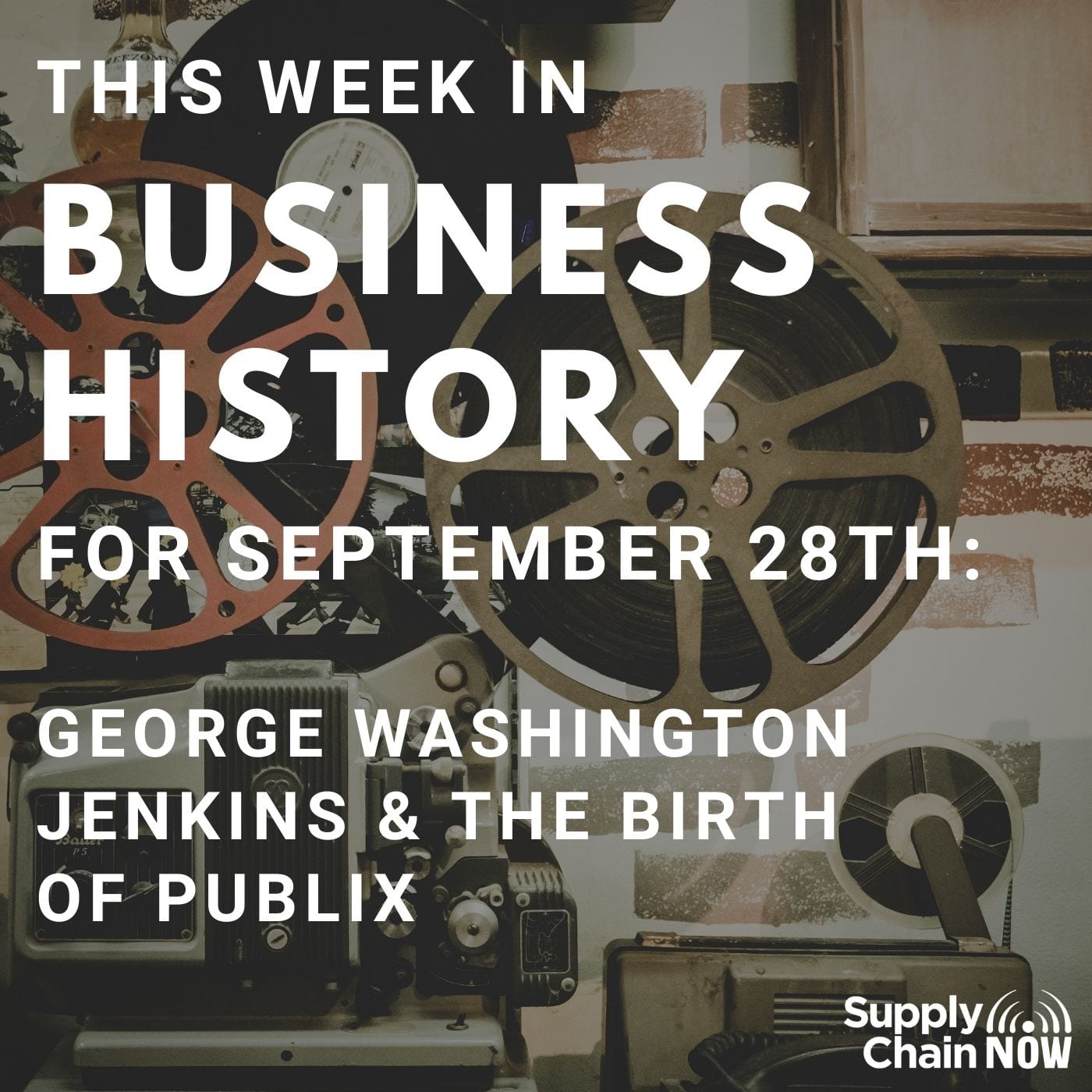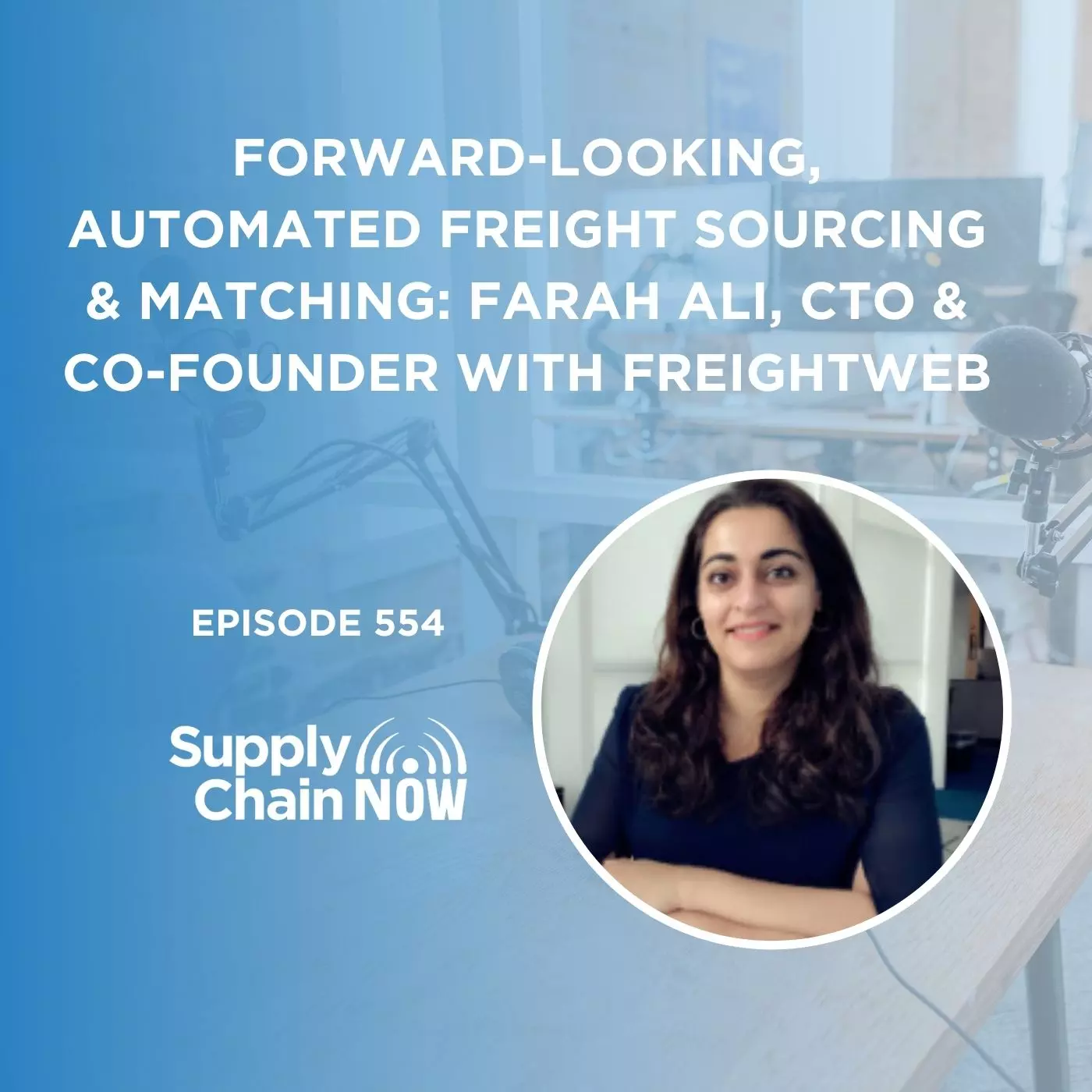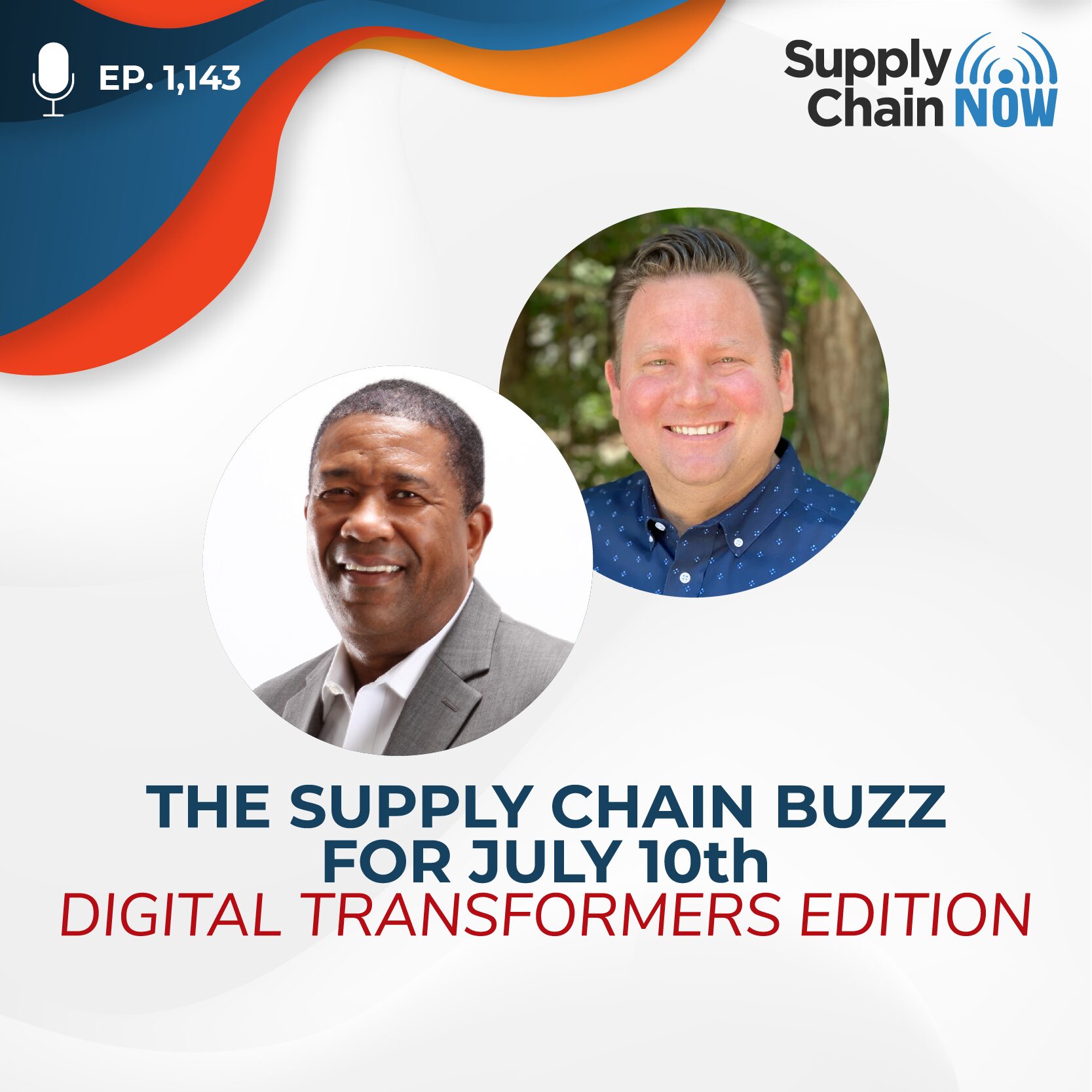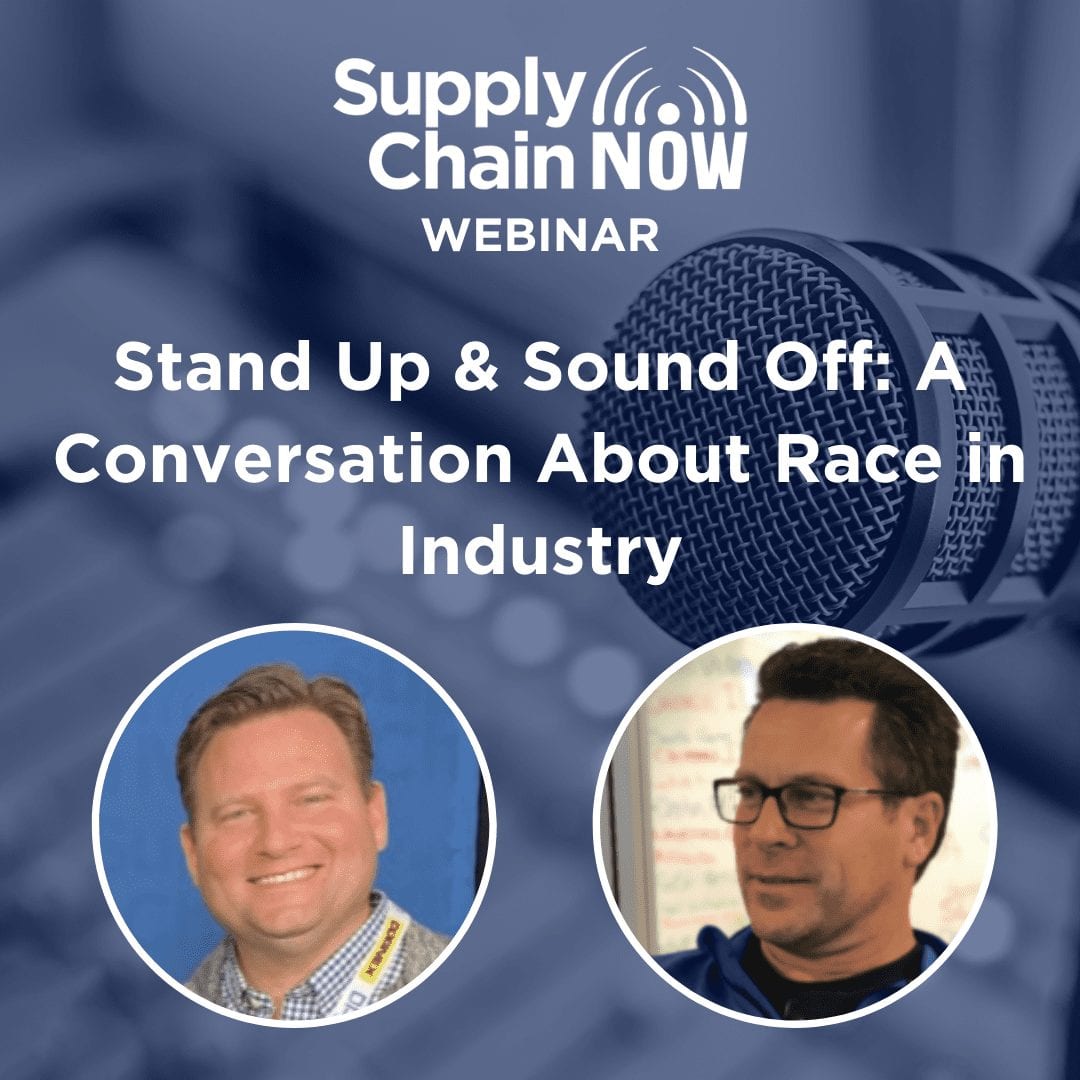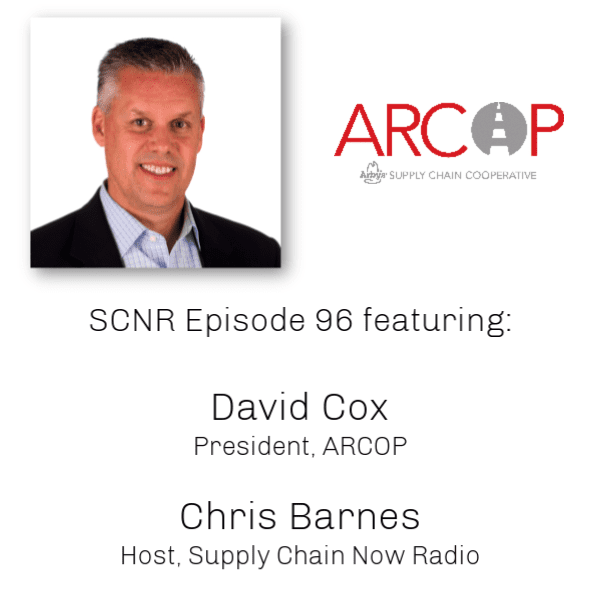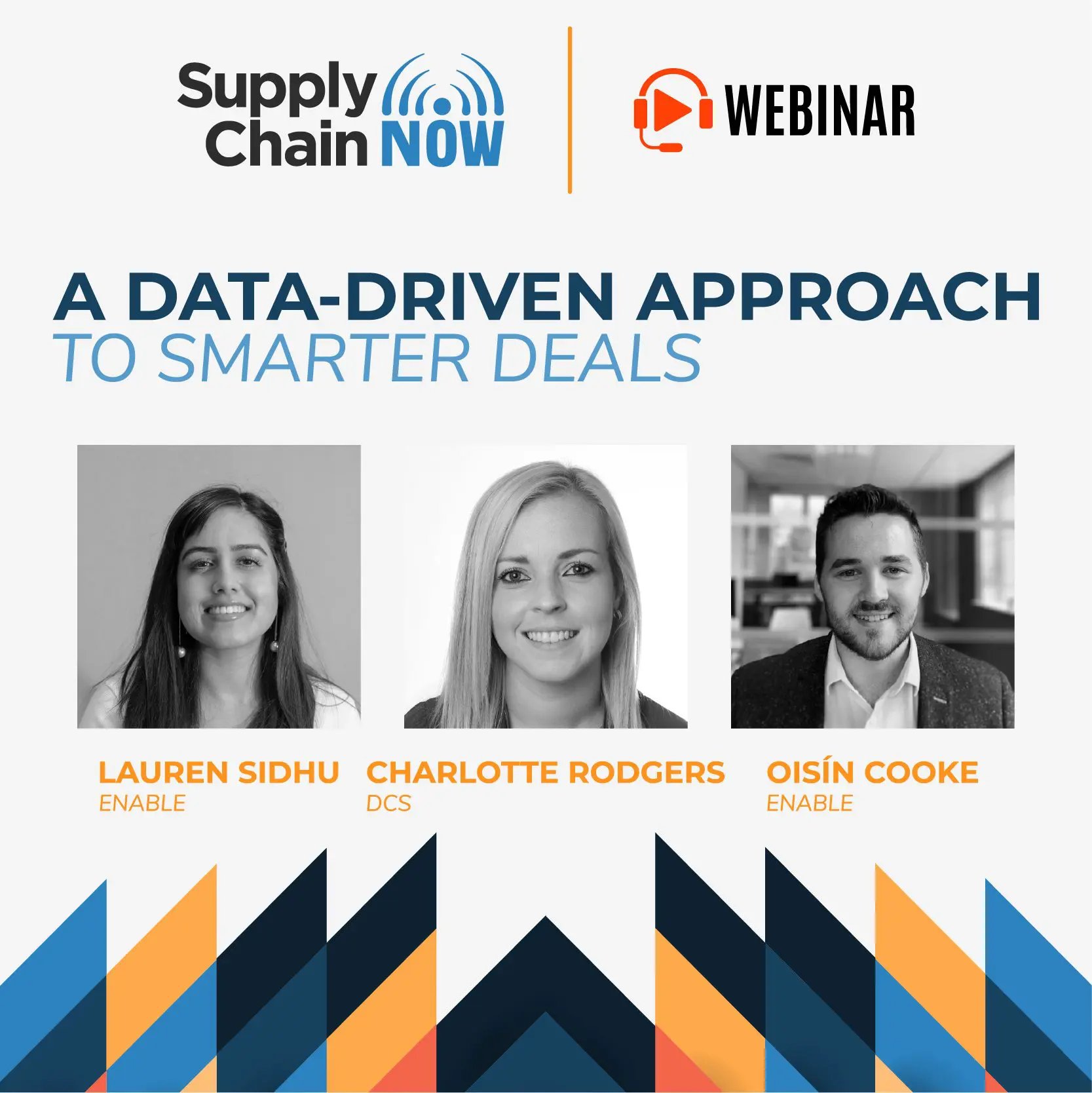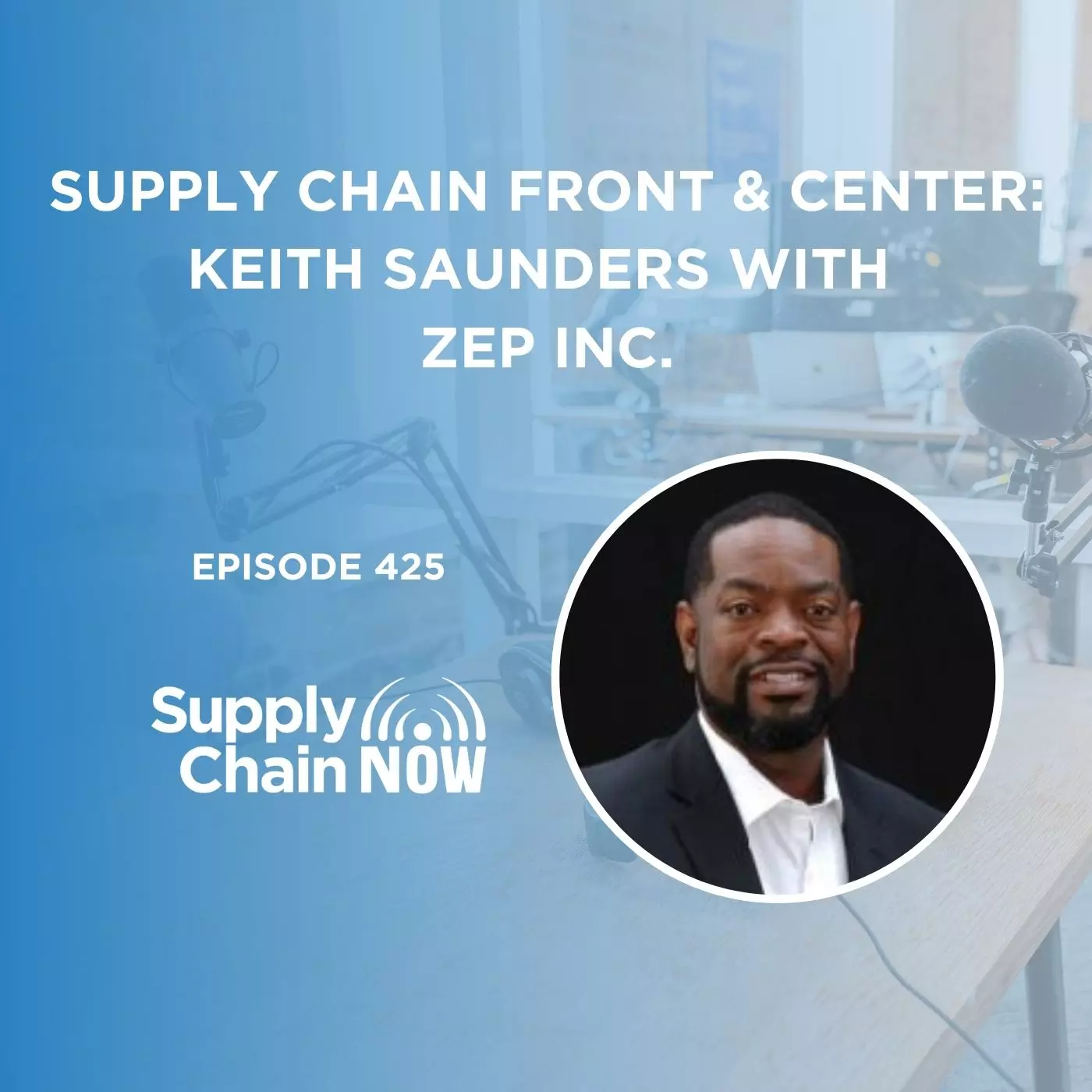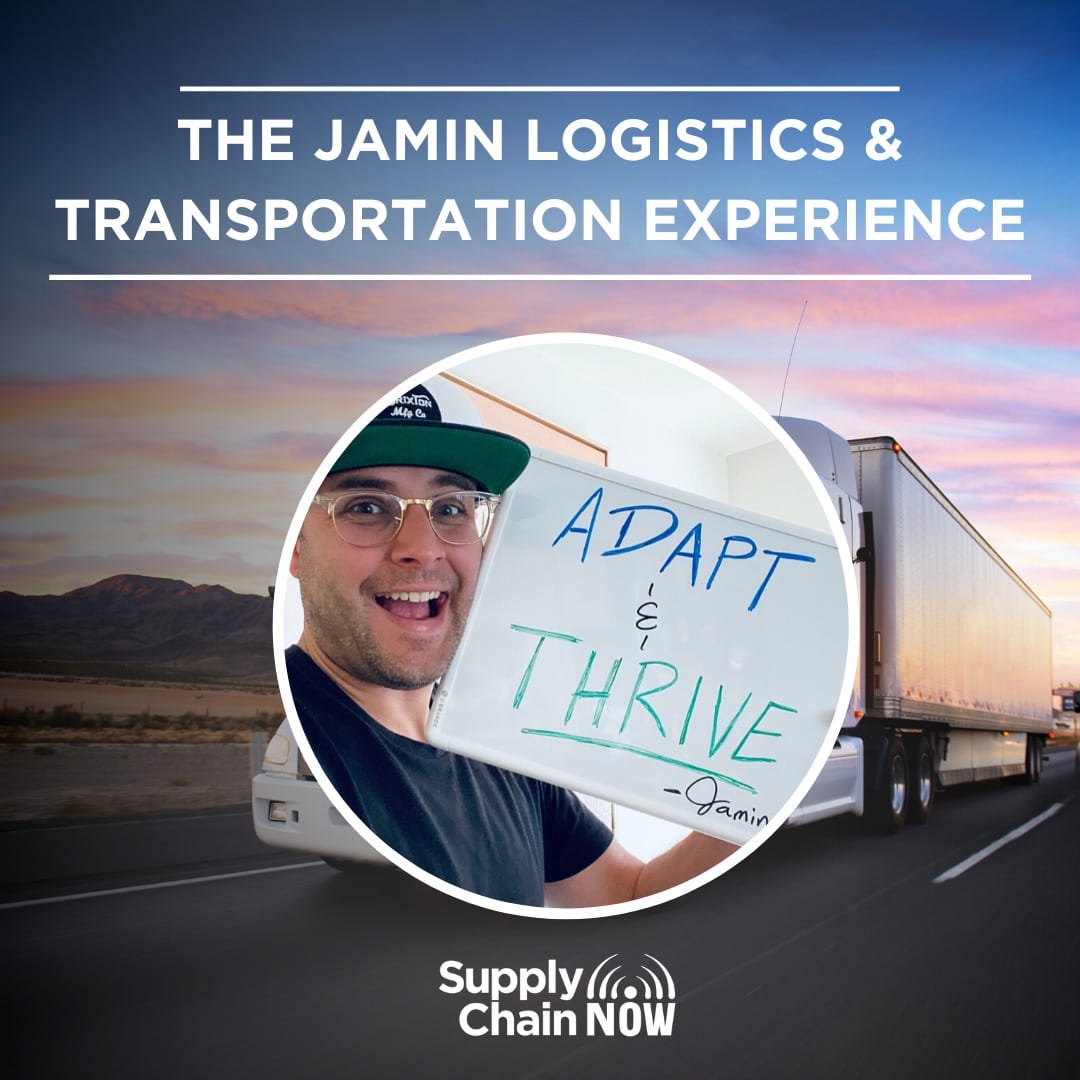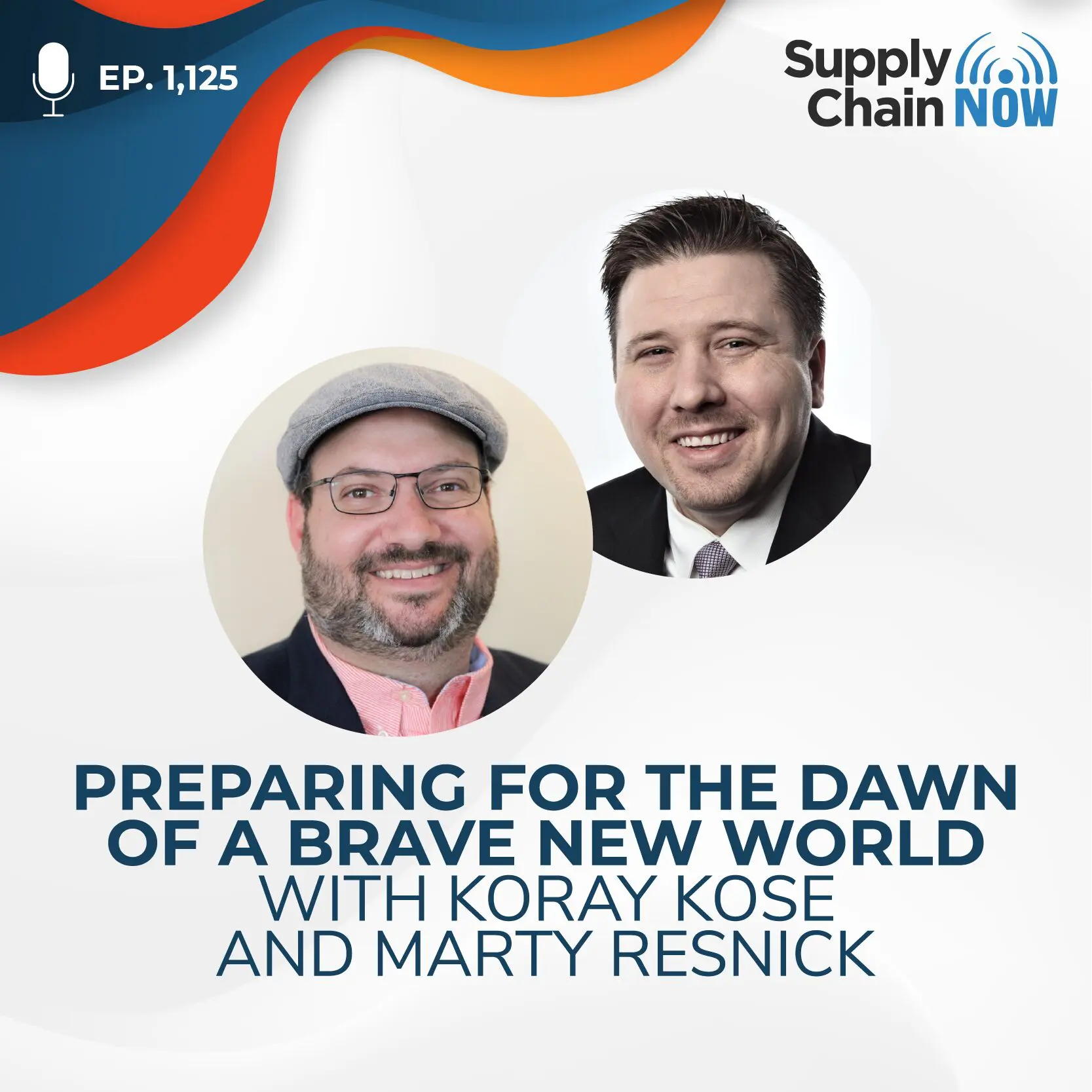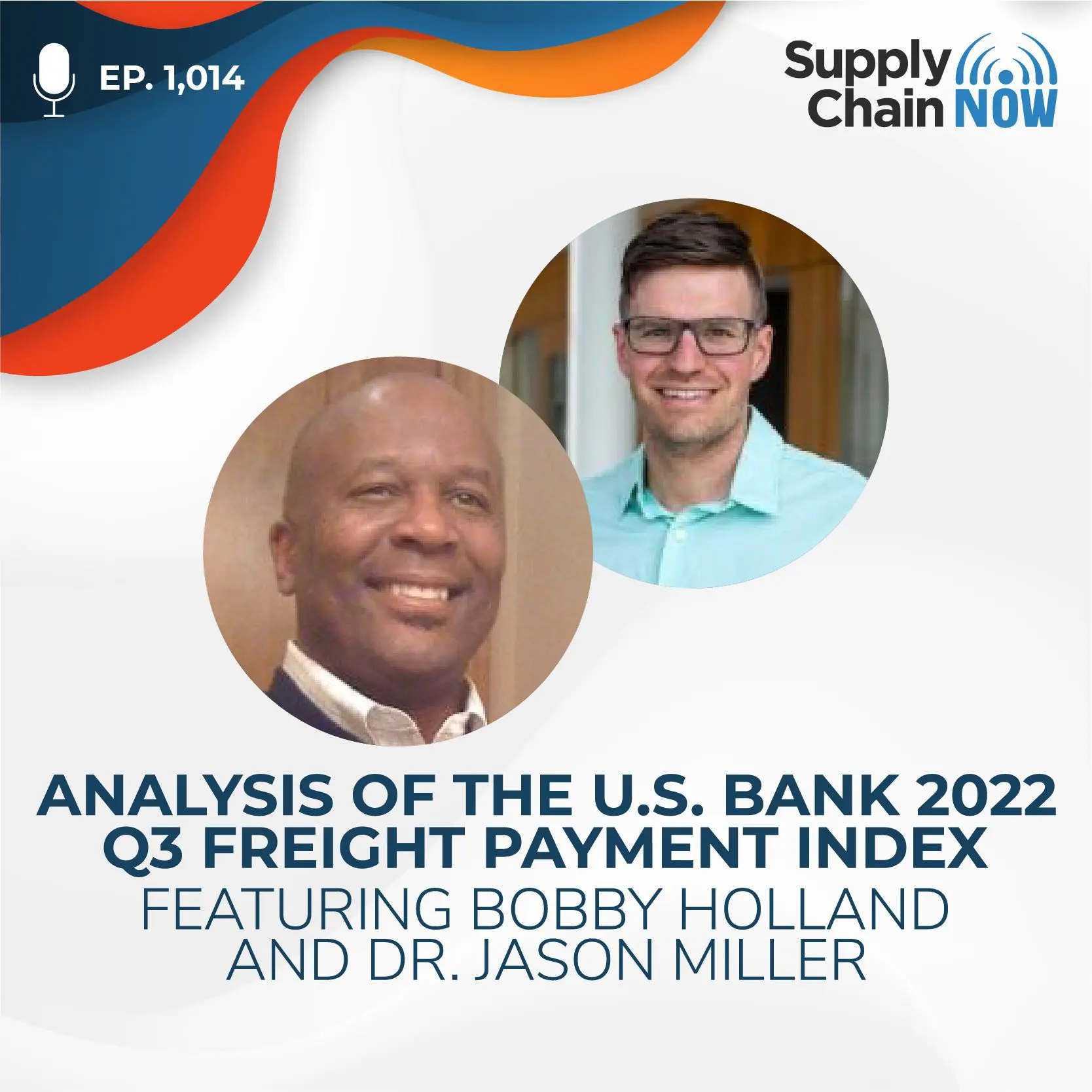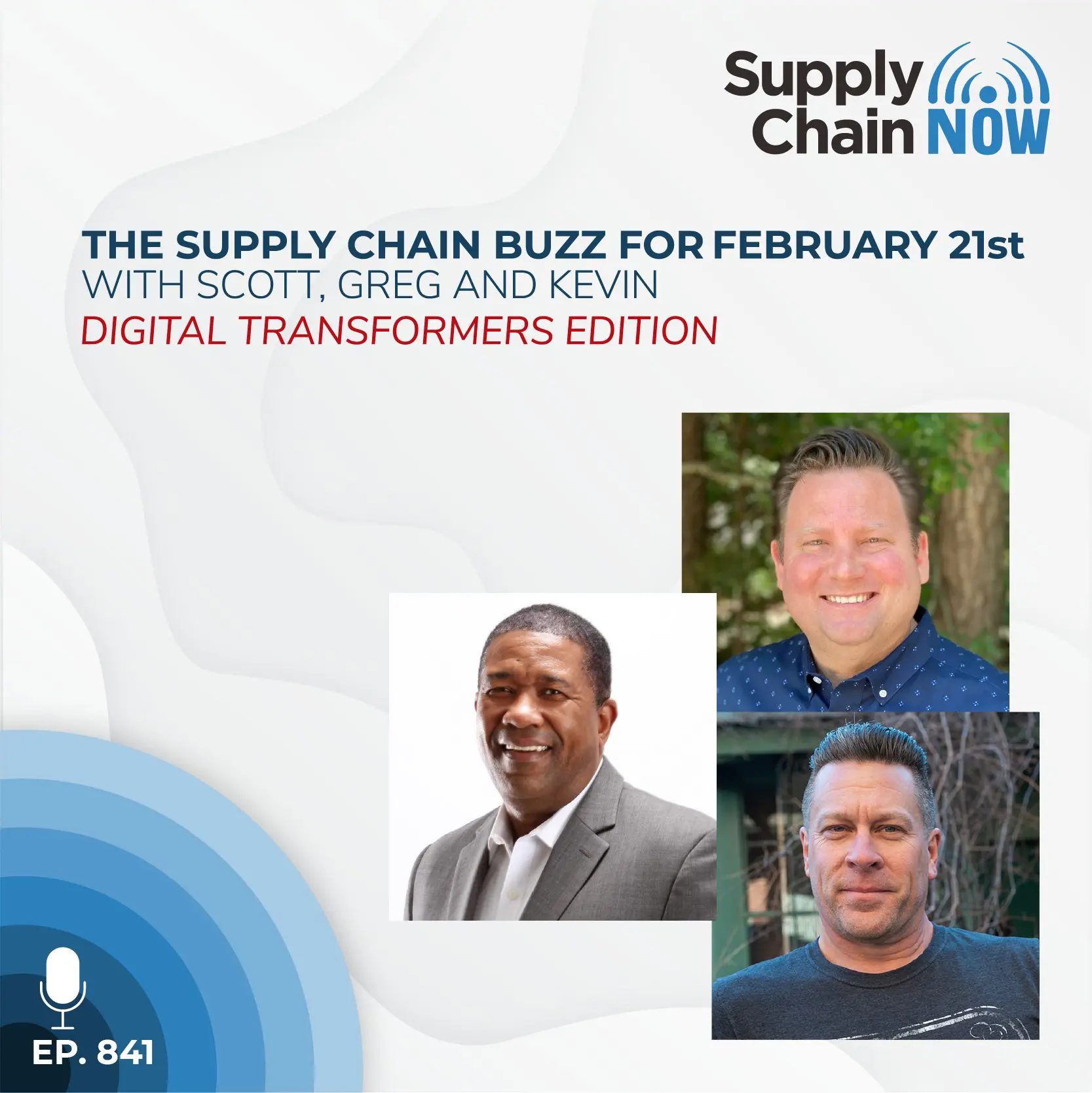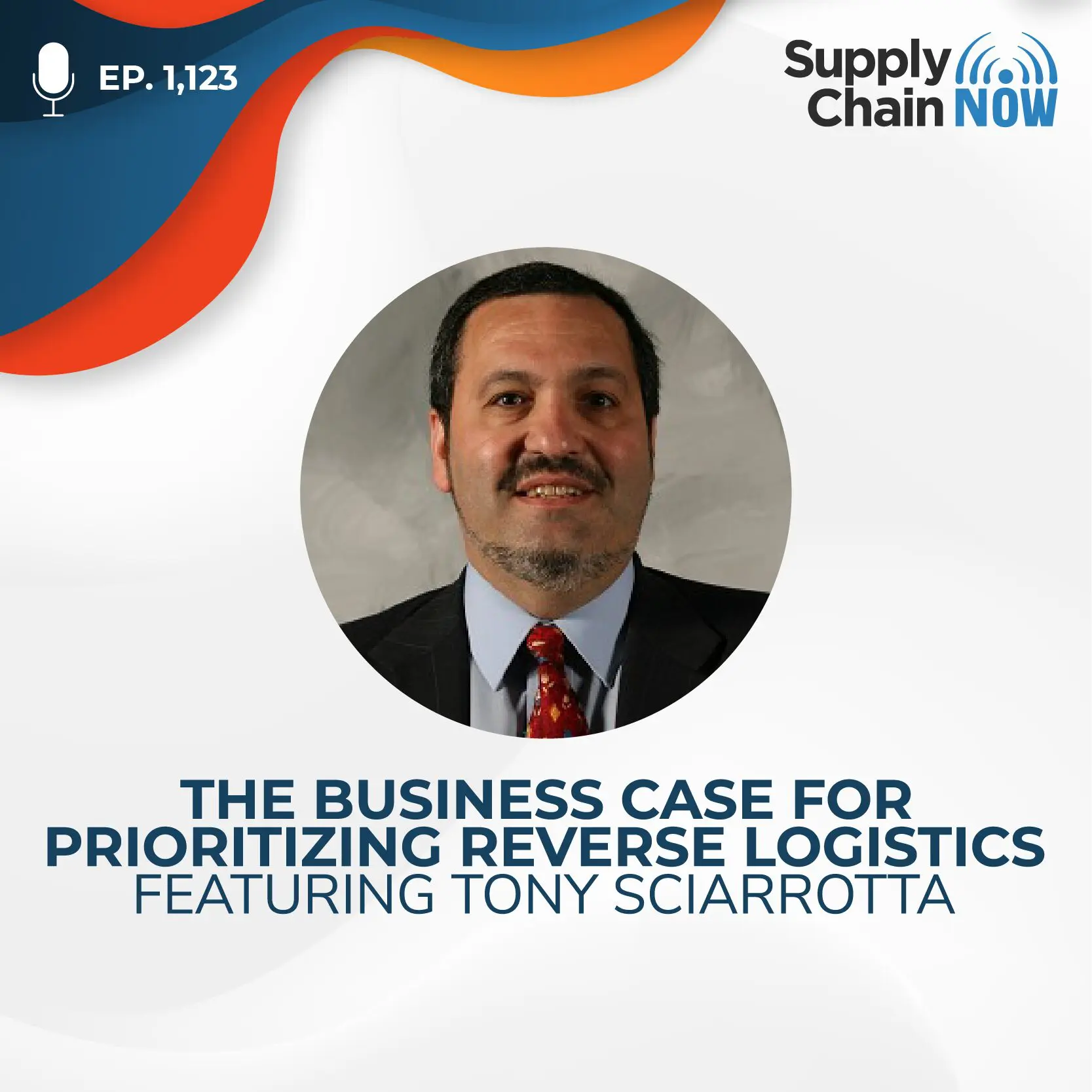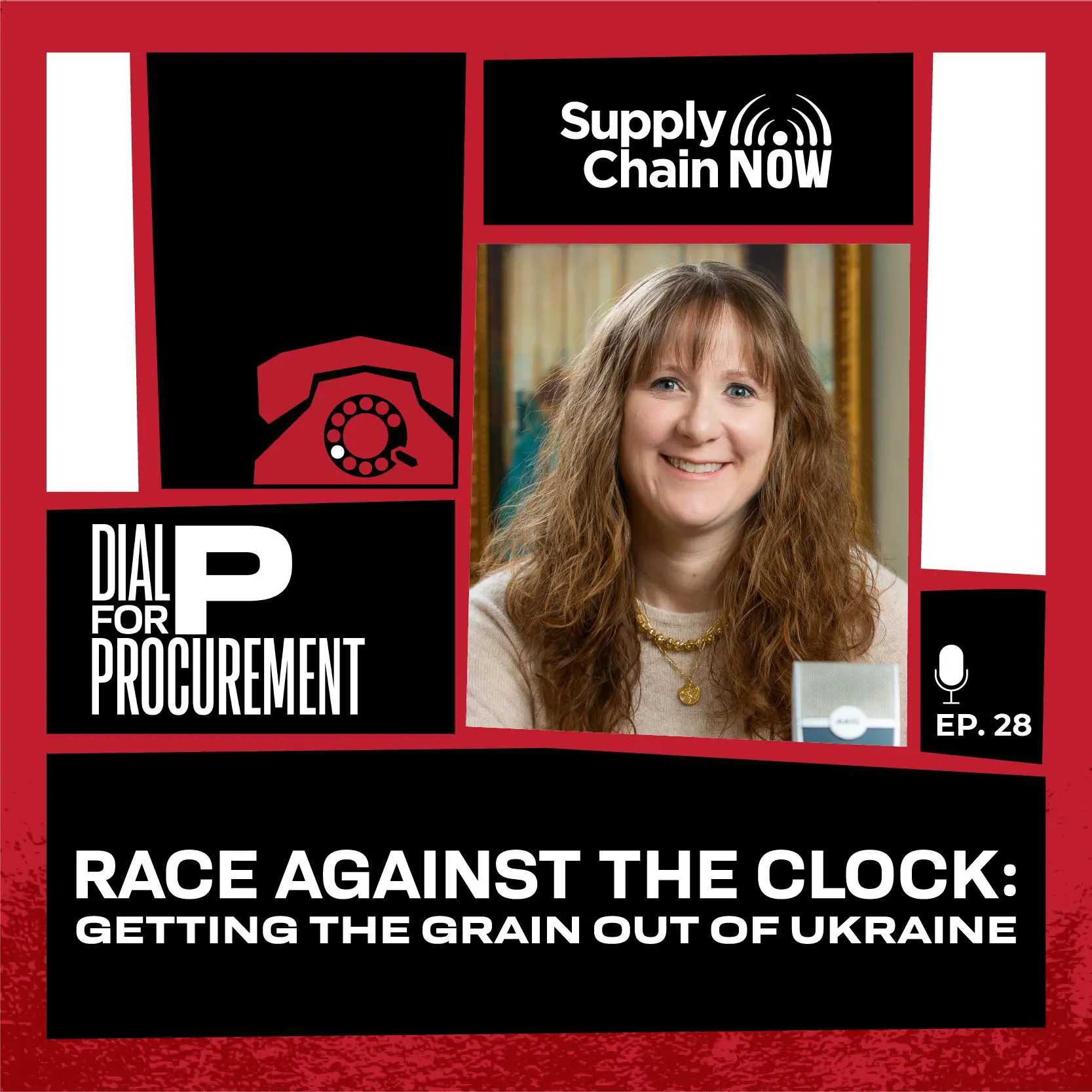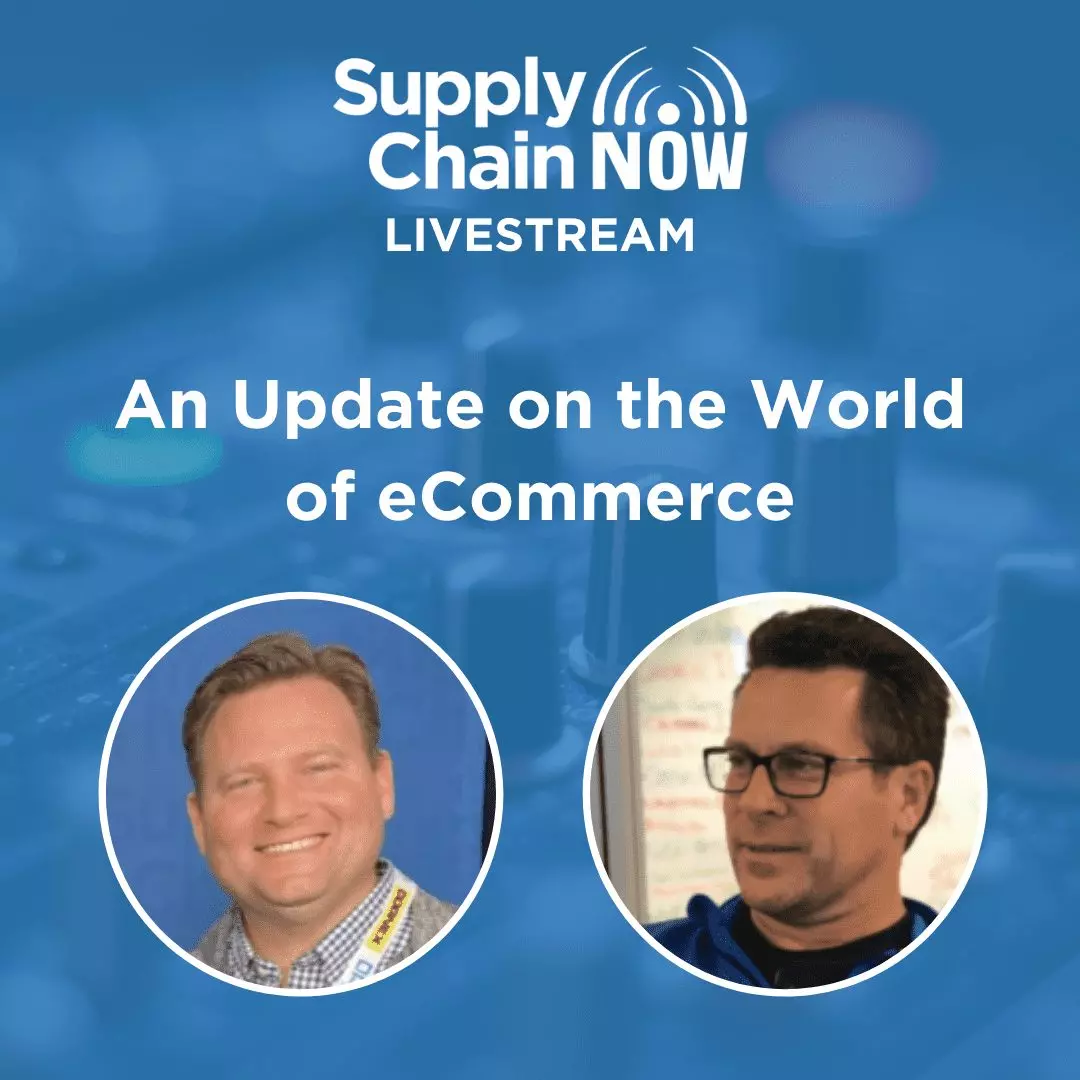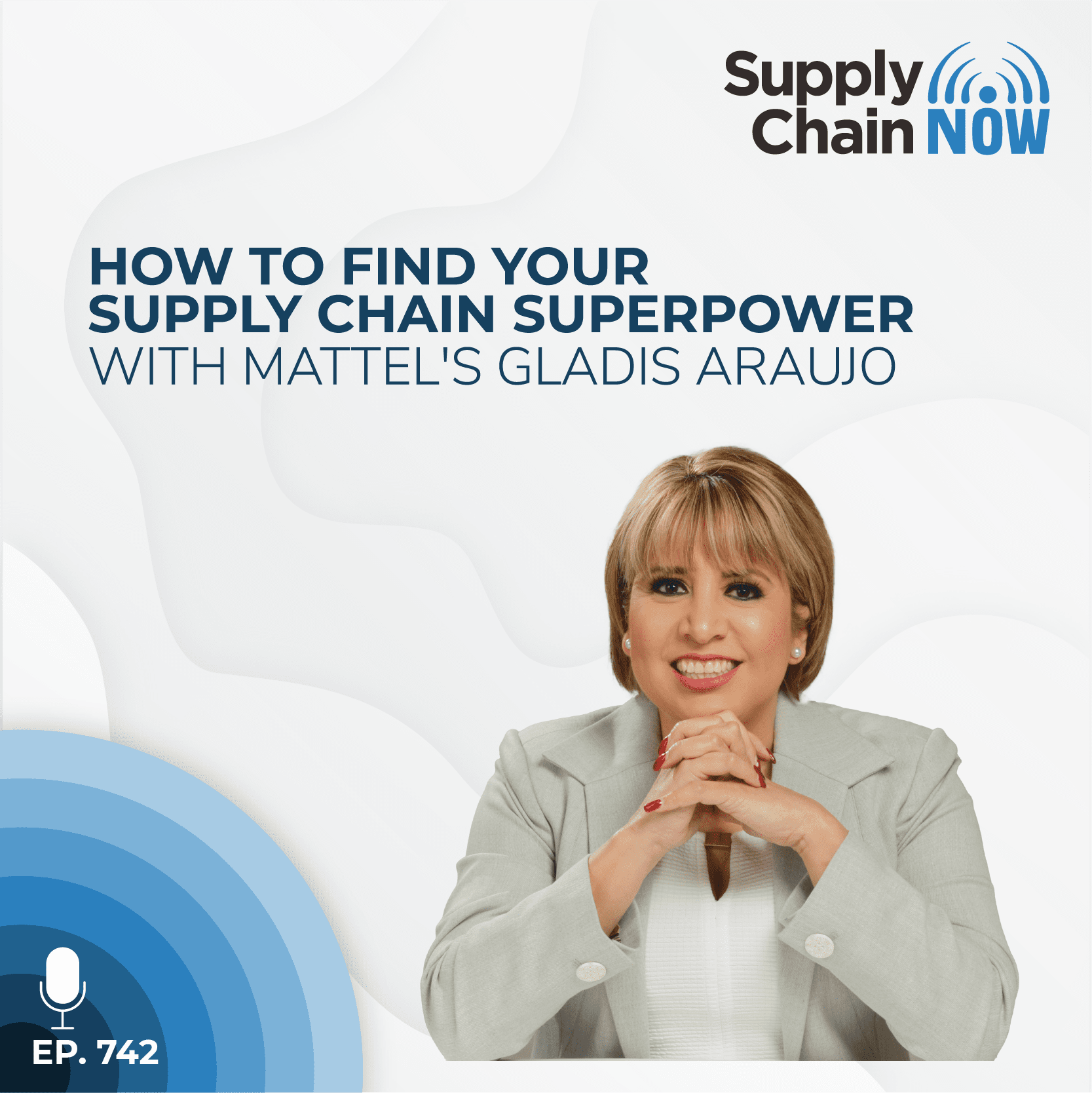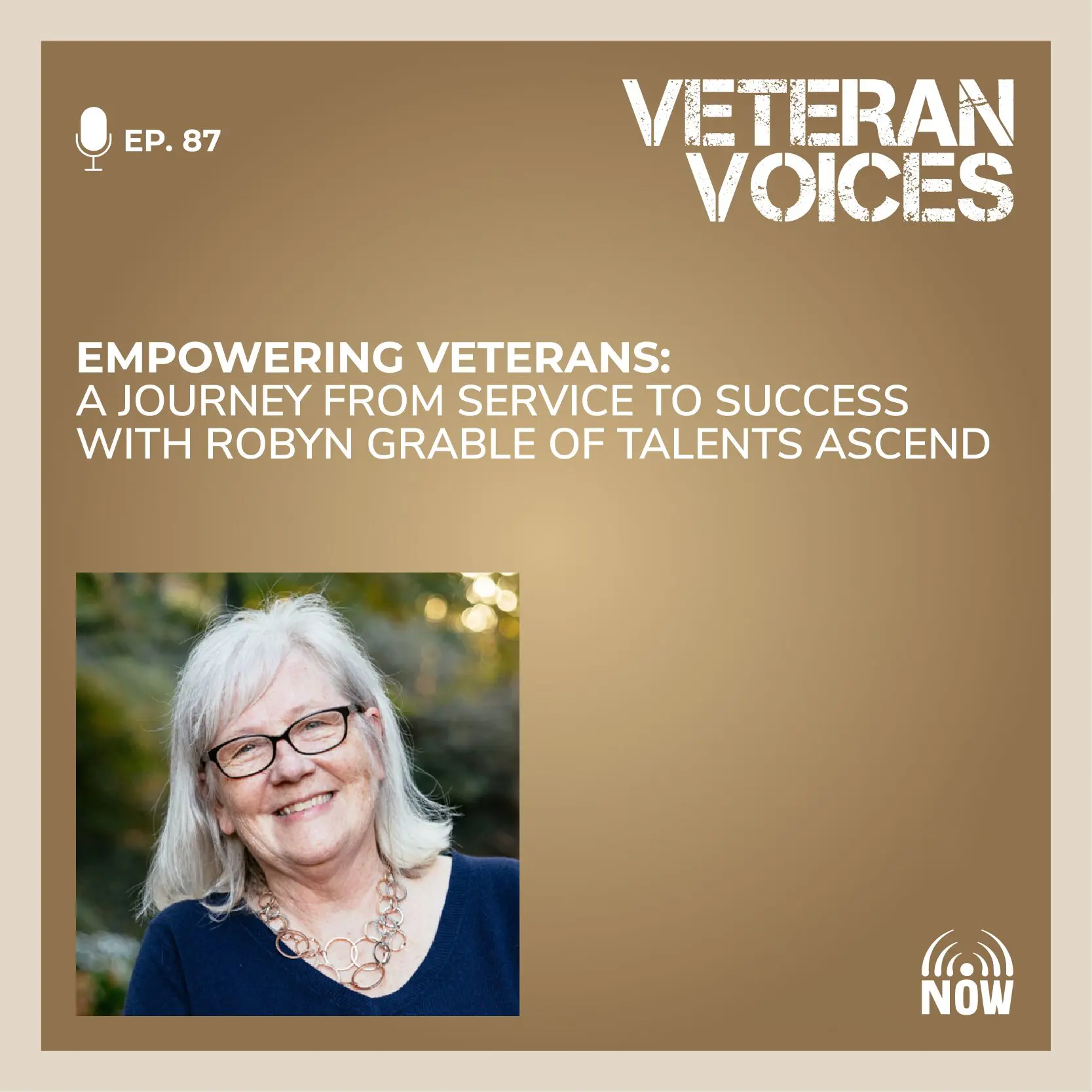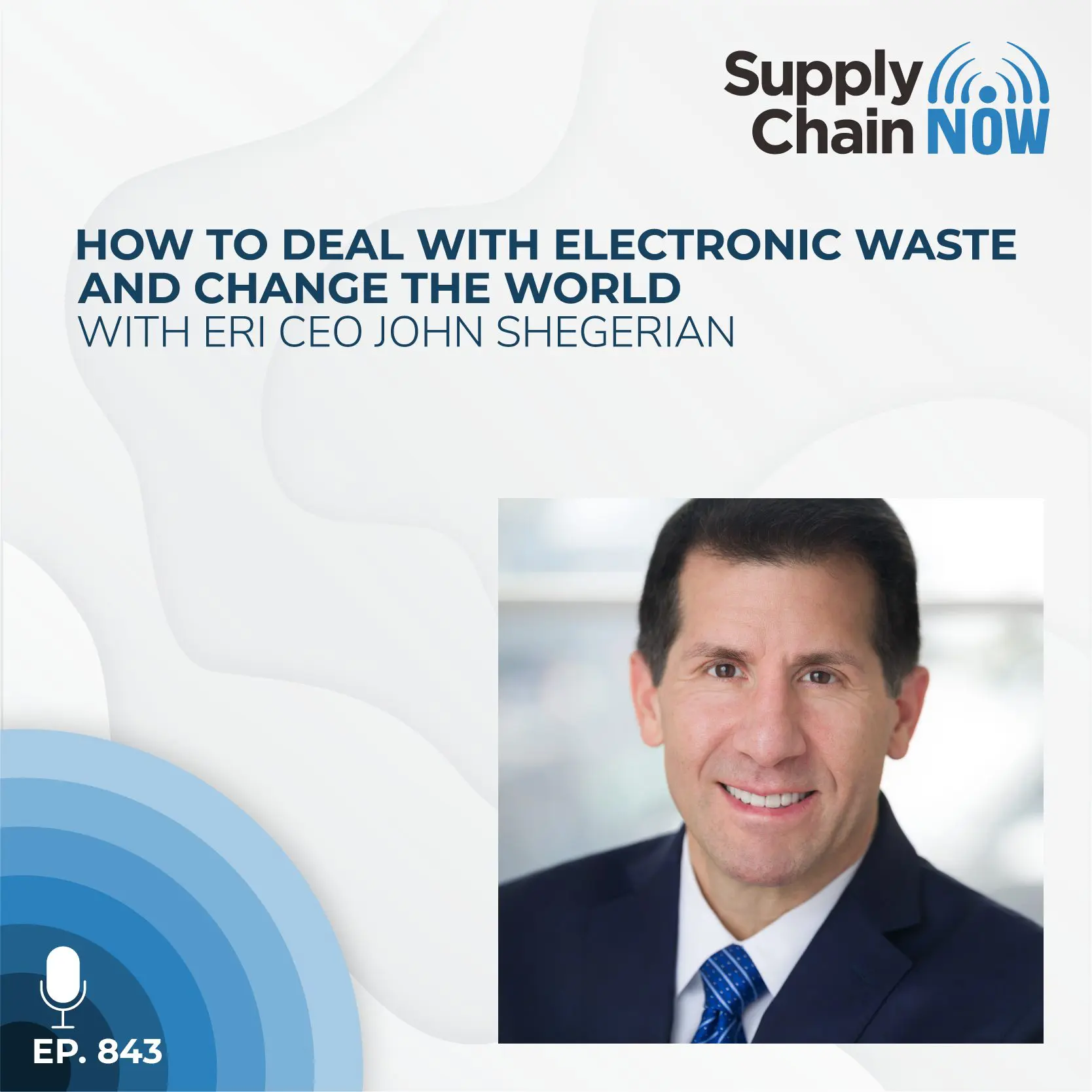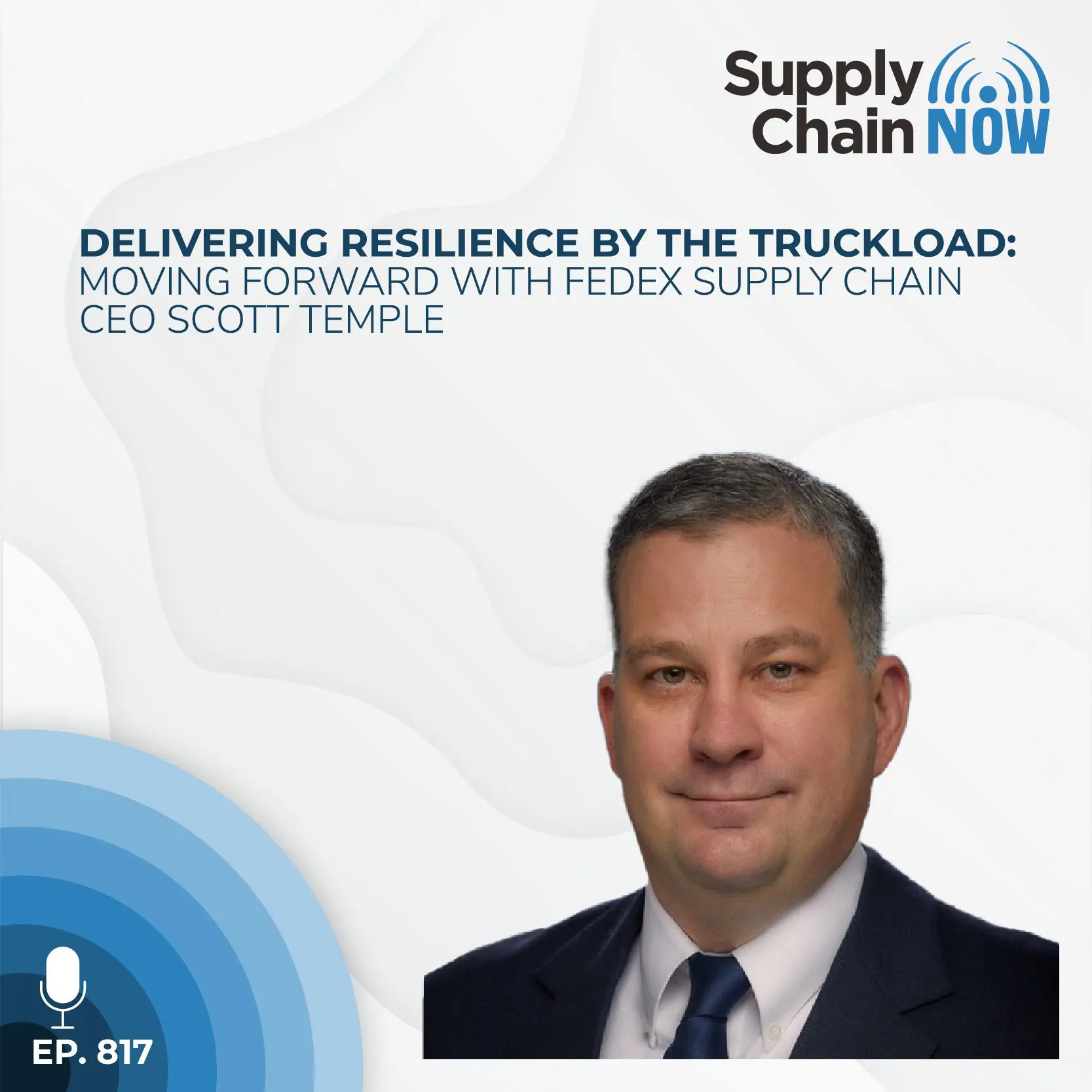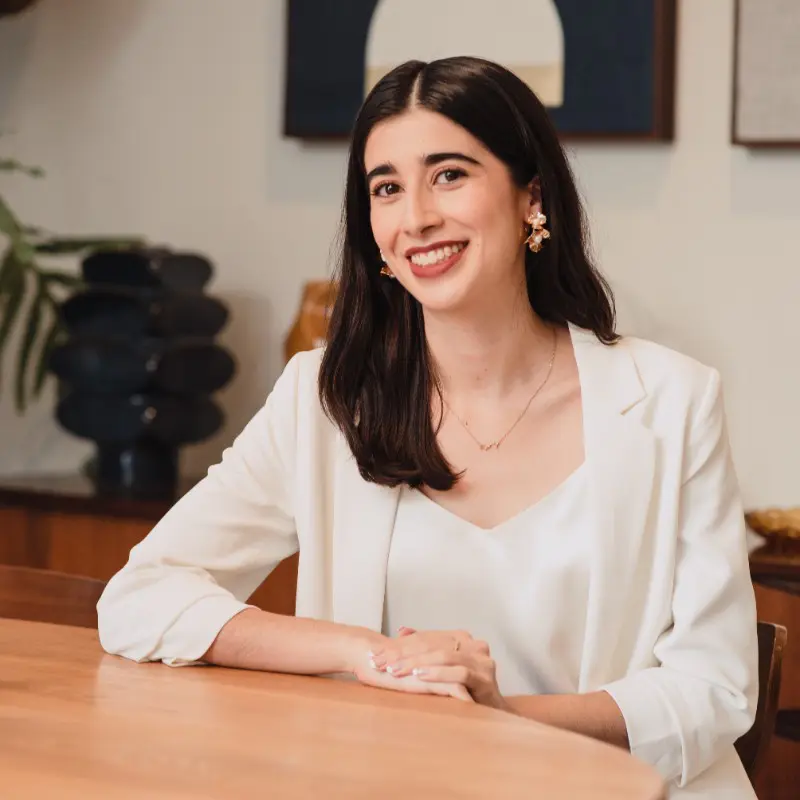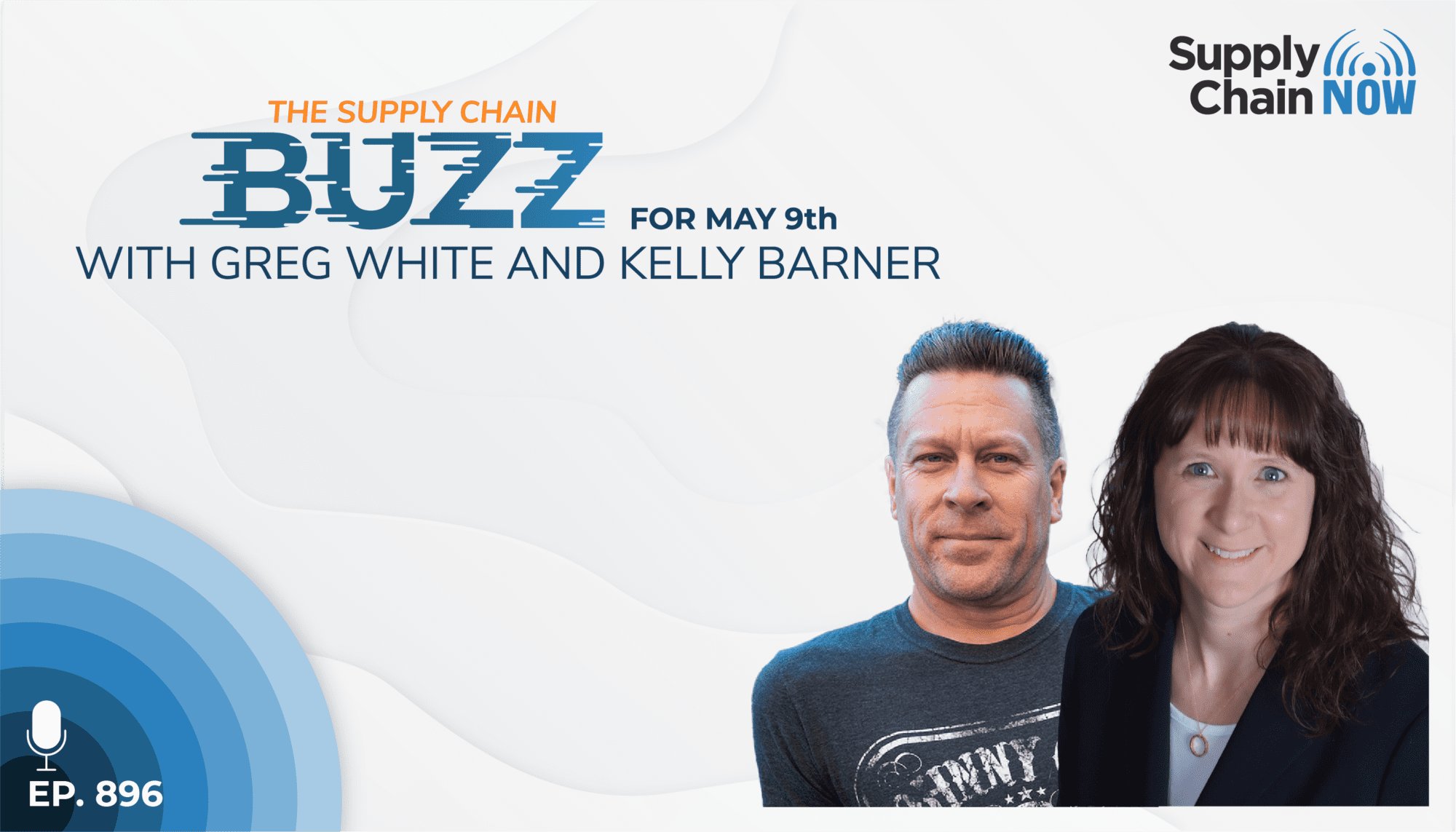
We are going to reshore all of our manufacturing immediately.
- Pretty much everyone during the pandemic
Reshoring is harder than it sounds.
- Everyone today
Episode Summary
The Supply Chain Buzz is Supply Chain Now’s regular Monday livestream, held at 12n ET each week. This show focuses on some of the leading stories from global supply chain and global business, always with special guests – the most important of which is the live audience!
With regular host Scott Luton on the road, Kelly Barner, host of Dial P for Procurement, stepped in to kick the week off right with Greg White. After trying to logic their way through the fan appeal of the USFL, they took four top news stories and discussed them individually before looking for connections between them.
In this session, created in collaboration with a live Supply Chain Now audience, Kelly and Greg covered:
- Why the anticipated sudden reopening of the port in Shanghai may be too much of a good thing for other port cities around the world
- How successful Tempur Sealy is likely to be in their quest to diversify sourcing so they can mitigate the risk of future China lockdowns
- Whether working in the metaverse will help Kraft Heinz solve its supply chain problems
- Does our amusement at the Ukrainian “hacktivist” DDoS attack on Russia’s vodka supply chain outweigh the concern about cybersecurity in general?
Episode Transcript
Intro/Outro (00:03):
Welcome to supply chain. Now the voice of global supply chain supply chain now focuses on the best in the business for our worldwide audience, the people, the technologies, the best practices, and today’s critical issues. The challenges and opportunities Stay tuned to hear from those making global business happen right here on supply chain. Now,
Kelly Barner (00:31):
Hey everybody happy Monday. Welcome to the buzz here on supply chain. Now I’m Kelly Barner sitting in for Scott Luton, but I’m thrilled to have you with me, Greg, how you doing today?
Greg White (00:41):
I’m doing well. Thank you. I’m I’m thrilled to have you as the adult in the room <laugh> for this. So, which is always so fun. We get, we get to hear totally new perspectives
Kelly Barner (00:51):
And we don’t wanna make it sound like more than it is being the adult in the room basically means having a mouse and being able to tell time <laugh> so it doesn’t actually guarantee any level of conversation. Sophistication. I’ll probably not my Have a whole bunch of stuff we’re gonna talk about today. Um, including you and I are both gonna figure out if we know anything between us about the SFL little bit of spring
Greg White (01:24):
Football, right. If anyone does
Kelly Barner (01:25):
Exactly. I know. So as, as we’re going in and getting started can see folks have already popped up and started saying hi in the chat, uh, feel free to educate Greg and I we’re trying to navigate this SFL thing. Yeah. Um, so I’m gonna throw to you on this first, Greg, because you were sharing back in the green room that this is actually sort of a reincarnation of something that already existed before that I’m just now discovering as new, because I didn’t notice the other time they tried it
Greg White (01:55):
<laugh> well, Kelly, truthfully, you could have been in grade school when they tried it last because the USFL, um, LA last was in the eighties. So the great and most famous player of the old FL is Herschel Walker running for Senate now, by the way. But the great running back from the university of Georgia, um, he actually played in the FL before he came over to the NFL and ultimately the FL failed. But I see that that, that the mere specter of failure has not stopped them from doing it all over again. <laugh> The same teams, the New Jersey generals, Birmingham stallions, Houston gamblers, all names from that league. I don’t know why I remember that. And I don’t remember if any of these other teams actually existed in the previous league. Are there only eight teams? I don’t know.
Kelly Barner (02:51):
There’s not a lot.
Greg White (02:52):
I, I think that there are about as many fans in the fans as there are teams in the league, um, from looking at the highlight reel, which opened with a field goal and a fumble <laugh> to give you an idea. So, um, and I gotta tell you, Kelly, I’m a little bit burned by the old, uh, what did I call it? The league of UNT talented players, uh, league that occurred during COVID that was supposed to have been funded for three years. That lasted eight weeks.
Kelly Barner (03:22):
Was that the one that was supposed to be really aggressive? Like we’re promising it’s gonna be more aggressive than normal football.
Greg White (03:28):
Yeah. Yeah, I think so. Uh, it was really hard to watch, honestly, Kelly, it was terrible. And Amanda, you know, to give us an idea of how people have tried to adapt football, um, talked, talked about arena football, which <laugh> she said, I’m sorry, this is hilarious. She said is like watching football at the circus <laugh>,
Kelly Barner (03:53):
Which
Greg White (03:53):
Is perfect description for arena football and probably a lot more entertaining than SFL football. So,
Kelly Barner (04:01):
And perhaps better attended.
Greg White (04:03):
Yeah. Clearly
Kelly Barner (04:03):
Everybody likes the circus.
Greg White (04:05):
Yeah, that’s right. <laugh> that’s right. And I I’ve gotta tell you I’ve I think if you watch enough highlights or enough of these games, you will get a look at the quality of the stands for a few stadiums around the country, because nobody is watching these games as near as I can tell people might be watching ’em on television, honestly, Kelly it’s week four, the season, and I already forgot that they existed. So, uh, I’m not sure what to think about it. What, what do you think about, I mean, you’re you and I, I think we are blessed to be fans of two of the greatest football teams in the league. So you the Patriots and me the what as a serious Kelly as a serious NFL fan, what do you really think about this curious?
Kelly Barner (04:52):
Well, I’m not a serious NFL fan. I would never try to pretend with this audience NASCAR fan, even though didn’t Don’t Kelly, what football team I cheer for the Shrewsbury Patriots, The very, oh, okay. I, I cheer for the very local team, you know? Yeah. With the fifth and sixth graders playing on
Greg White (05:12):
It with your kids on it,
Kelly Barner (05:14):
With my kids on it. But what I will tell you what I think you talked about how many people watch this sport. Here’s what I think is interesting. Usually these sports end up being something that the different networks fight over. Right. Right. Is this race gonna be on Fox or ESPN? Right. There’s my NASCAR perspective. These games are being simultaneously broadcast, I think on Fox sports and another broadcast channel. To me, that was kind of interesting, cuz usually
Greg White (05:40):
That’s very telling
Kelly Barner (05:41):
And these channels are willing to share and isn’t that nice?
Greg White (05:45):
Yeah. Yes, yes. How polite? Yes. Yeah. Well, I mean, if, I don’t know how long the games are even, but you know, everybody’s got throwaway time. What day do they play on? Oh yeah. Um, maybe
Kelly Barner (05:57):
Saturdays,
Greg White (05:58):
Maybe it’s maybe these games are played at five 30 in the morning on Sunday instead of those infomercials with an actual NFL player. Terry Bradshaw. I mean, it could be that it
Kelly Barner (06:10):
Could be,
Greg White (06:11):
I hope it’s not costing Terry Bradshaw money because it gives so much of it away. Every season.
Kelly Barner (06:15):
I know that’s right. You could win Terry Bradshaw’s money. That’s right, exactly. <laugh> so we’re we have Scott away so that you and I get to have a good time to
Greg White (06:25):
Play. Yeah.
Kelly Barner (06:26):
But Greg, I feel like I need to warn you. We are being watched.
Greg White (06:30):
Of course we are.
Kelly Barner (06:31):
We are being watched. Yes. Scott is keeping an eye on us. He’s in Orlando, Scott, you would better be doing something more fun than watching the buzz after this.
Greg White (06:41):
Okay. And more interesting than watching the, uh, the USFL I should say. Yeah,
Kelly Barner (06:45):
Exactly. That’s right. Um, but if anybody watching wants to educate Greg and I we’re open to adding to our FL knowledge, uh, we also have Dr. Ronza bump Zimmerman with us. Happy Monday to you, Dr. Rhonda, thank you for being here. And uh, we’ve
Greg White (07:05):
Maybe, maybe Rhonda, you could play in the USFL, the, the quarterback and we know you can run. So, so
Kelly Barner (07:16):
You just never
Greg White (07:16):
Know yourself if recruiting, you don’t do that to yourself. <laugh>
Kelly Barner (07:20):
And we’ve got Ryan. Hello Ryan. Long time listener. First time live streaming. Don’t let us good ruin your faith in the supply chain. Now family of programming <laugh> this is gonna be a wild start to the week.
Greg White (07:32):
And, but we are gonna get to supply chain, Ryan. So yes, hang tight.
Kelly Barner (07:36):
Yes. And I’m gonna make sure everyone is a good start to their week. I’m gonna let Greg talk about China. So buckle up. This is about to get interesting. Um, and I also wanna say hi to Kivan. Hello? Kivan thank you for all of our regulars that have rejoined us.
Greg White (07:52):
Right.
Kelly Barner (07:54):
All right, Greg, you ready?
Greg White (07:55):
Let’s do it. Let’s talk about something meaningful, right? Outta
Kelly Barner (07:58):
The gate. Yeah. Yeah. Okay. Something me, are you suggesting the USFL and the circus are not meaningful societal institutions?
Greg White (08:06):
Uh, no. I’m suggesting that the circus is meaningful, but the SFL is not just to be clear.
Kelly Barner (08:12):
Okay. Just so we’re totally, absolutely clear. Okay. <laugh> so in terms of talking about something meaningful, maybe a supply chain thing, um, people are starting to panic that they’re going to get what they’ve been hoping for. Right. So things in Shanghai have been pretty backed up. Right. And China is basically saying, Hey, we’re getting ready to clear this backlog. We’re gonna start sending ships out, sending containers out. So basically they’re saying heads up incoming. Um,
Greg White (08:45):
I like that
Kelly Barner (08:46):
<laugh> that’s, that’s the technical right information. Yeah. Probably sounds different in Chinese. Um, but currently in LA there are 16,000 containers waiting to be loaded onto trucks when there should be about 9,000.
Greg White (09:01):
Wow.
Kelly Barner (09:01):
And there is no space available to move this stuff to. So according to, um, and production has the link. I don’t know if you guys wanna pop this in the chat ports, race to clear cargo, fearing and overload when China lockdowns lift less than 1% of the warehousing space in Southern California is currently available. So Greg, what I wanna know from you right off the bat, is it time to panic yet?
Greg White (09:30):
Um, gosh, you know, I don’t think so. I don’t know. I don’t know. The panic helps anything is, is point, would it be a natural response to panic? Yes. Especially historically for supply chain professionals historically. Yes. That’s exactly what they would do as panic. But the truth is it’s gonna be what it’s gonna be. Or as our friends in New York, Kelly, like to say it is what it is. So, um, I, I think what we have to recognize is that while, um, the, the backup has become huge in China, we have to recognize that I believe this has little to do with COVID and more to do with penalizing the world’s economies for penalizing Russia, for their aggression in Ukraine. I mean, it’s impossible to believe that China virtually the only nation in the world that has not condemned, uh, Russia in any way is not complicit in what they’re doing.
Greg White (10:29):
And it, and the timing was remarkably similar to a, of this lockdown was remarkably close to, uh, a, a new set of sanctions that were leveled against Russia. Not unlike China’s. Some people will recall China’s energy crisis that occurred about the time the Paris Accords landed some, uh, incredibly damning language about China and, and the resolution of that energy crisis that occurred immediately following the removal of that damning language from the energy Accords. So look, we have to recognize that China is going to believe that they can and that they can manipulate the world’s economies to do what they want with actions like this. So, um, they’ve, they’ve either reached a tipping point from an economic standpoint where they need to clear the ports for their own purposes. Yeah. Or, you know, they see something or they’ve had some communication that, that none of us see.
Greg White (11:32):
So you asked for it. Right. And you knew it was coming. So, um, will that cause issues in the ports? Yes. Do I think that is also intentional on China’s part? Absolutely. Yeah. That’s exactly what they want is these ebbs and flows of product so that it continually jams up one way or the other, the economies of the world that are so subsistent to their, sorry, not subsistence. So subject to their, um, to their supplies. Right. So, yeah. It’s just, it’s just ways in which they keep the pendulum swinging to keep supply chains on the back foot, around the world.
Kelly Barner (12:11):
Yeah. Now Greg, have I shared with you my working girl theory of how to read the news, right. Melanie
Greg White (12:18):
Gr would love hear
Kelly Barner (12:18):
That. Okay. So
Greg White (12:20):
Yeah. Remember the movie, of course. Yeah.
Kelly Barner (12:22):
Anybody who hasn’t seen working, girl, don’t go watch it right now, but add it to your list for this weekend. You need to go see this movie. She’s a secretary and she’s on the ferry going to work in New York. And she reads in the paper, something about tra broadcasting, wanting to sell something or trying to grow their business. And elsewhere, she reads something that gives her an idea that suggests Trask should start investing in radio. Now this is like mind blowing apparently in the eighties, but her idea is so wild. And yet it ends up being so successful that the bad guy, Sigourney Weaver tries to steal the idea from her. So when I read the news, I try to read what’s directly on the page, but then what else is on the page? So I’m prepping for today, Greg and I had a working girl moment.
Kelly Barner (13:11):
I’m reading an article about how China’s inflation is only at 1.3%. I think they were saying, they’re not expected to go above the 3% target inflation rate for the year. And they’re achieving that through playing with inventory, right. And also through price controls. And so I started to think to myself, not that China should advertise on radio, but that if they can control prices and if they can control inventory, why can’t they control when all these container ships leave Shanghai so that they don’t all hit LA at the same time. So I share your skepticism. I think there’s, they’re doing it on purpose. Um, I, you know, if you have that much control over your economy, you know, freight as it comes and goes, but we on this side of the ocean need to be ready to receive. What’s about to be incoming cause consumers want the stuff that’s inside those containers.
Greg White (14:06):
I think we have to further Kelly be ready to, uh, for the inevitable upheaval that it will, it will cause. And as long as, as long as the world’s leaders and I think they’re doing so appropriately continue to stand up to this dictatorial, oppressor Putin in his unjustified and illegal war. Um, then I think we can expect these things to continue to happen both from the Russians who could only sustain, continue to sustain this war by cash infusions from the Chinese, because their economy is collapsing as we speak. Um, but also because the Chinese see an opportunity to make profit and destabilize the world’s economies and governments, and that of course works to their benefit. So they’re gonna continue to do so. Um, you should have heard the conversation halt with, with one of my investment advisors today, when I mentioned that that was what was going on in China, he just went,
Kelly Barner (15:10):
Well, we may be crazy, but we’re not alone, Greg, uh,
Greg White (15:13):
Or wrong or wrong. We may be crazy, but that does not make us wrong. No.
Kelly Barner (15:17):
Right. That’s absolutely true. And we’ve got some comments coming in from the sky boxes that we’ve got some fellow crazies with us. Yeah. Uh, Josh is, is agreeing here economic punishment and supply chain manipulation have been around as long as the silk road. So amen. Not a new idea. Right. And less we forget, there’s always a, a fun longshoreman strike to look forward to this summer.
Greg White (15:42):
Yeah, that’s right. I mean, you know, and, and to both of those points, there are often manipulation. So I was a, I was a purchasing agent for a retailer. And every year, what we tried to predict was which, and how many union carbide plants would, would explode and be offline for production for how much time. So, you know, so that they could Jack the price of antifreeze effectively antifreeze up. And we would try to stock up ahead of that. That’s I mean, that became part of our supply chain strategy was stocking up ahead of that. So look, it, the disruption, even manipulation is not new to the supply chain, but, um, there are, um, there are unquestionably ones that are more disruptive, especially with our incredible dependence on China.
Kelly Barner (16:36):
Agreed. So let’s move on to article number two, right?
Greg White (16:41):
Yeah. Cuz this may actually give us some relief at some point. Right.
Kelly Barner (16:45):
<laugh> so back during the pandemic, I’m sure you remember this. Um, everybody was like, that’s it, we’re now gonna reassure all manufacturing immediately. There’ll be no more overseas sourcing manufacturing component assembly. We’re gonna do it all in Des Moines. Right. Everything’s coming back to the United States that’s right. Everything. Um, regardless of where those materials are and if suppliers actually exist to provide them domestically
Greg White (17:11):
Or we could pay for labor at 10 times the rate that they pay for labor in China. Right.
Kelly Barner (17:17):
Exactly. Exactly. So we’ve got a great example of a real company, temp, Seally, the mattress company, uh, changing their sourcing strategy to mitigate some of this risk. So, uh, the first, I think takeaway from this article now, we all know reassuring is a whole lot harder than it looks, you know, sounds like a great idea, but when you actually try to carry it out very difficult to effectively achieve. Um, so they’re diversifying their sourcing and investing in inventory. So here’s what I think. Interesting Greg, and, and maybe this is where I’ll have you start, you know, big dramatic, they’re expecting a 10 million drag on their revenues in Q2 from all this.
Greg White (18:01):
Right.
Kelly Barner (18:02):
But if you actually go look at what this company’s revenues are, tempere, that’s about a percent, right, right. So they’re talking about the 10% drag, but to what extent is that something that they really need to focus on versus sort of reinforcing this existing narrative that it’s hard to reassure and we’re gonna throw out a number that sounds really big in a consumer market when from a corporate standpoint, 1% is not,
Greg White (18:31):
Are Hispanic. I, I think there, there are a couple of things here and that is one you’re right. They are like so many and let’s face it. This is probably helped by the journalists. In some cases, I’m not saying in this one, but hyperbolic, um, terminology to get reads or get clicks or get watches or whatever. But, you know, I think what’s interesting here is, is the story of, of Tempur-Pedic is they saw this coming and they did something about it in advance. So they’ve actually mitigated some of what the impact could be. So I, I, I am encouraged that there are actually companies thinking like this, that the word safety stock was actually even mentioned in an article by about a manufacturer. Yes. Is, is a huge leap, great leap compared to how manufacturing has typically been done in the past, which is they foisted all of the inventory risk to their distributors and retailers who have to carry safety stock while they keep their inventories lean to keep their profit and margins high.
Greg White (19:41):
Um, so I, I think that they’re, I, I don’t know that this is indicative of this, but there are at least some realizations going on in the marketplace where companies at the manufacturing and brand tier are starting to realize that they need to take on some of that risk. Yeah. Because, and Scott and I talked about this last week, Kelly, and I think we talked about this Friday in the team call there’s nowhere to hide consumers. All of us know it doesn’t have to be Target’s fault if they’re out of mattresses, it could be the distributor’s fault or it could in fact be the manufacturer’s fault. So there is no, there are no dark spaces in supply chain anymore. So you can’t hide from your contribution to the disruption of the supply chain. And I think companies like Tempe are starting to recognize that and counteract and preempt that.
Greg White (20:29):
And I think it’s fair for them to do so by the way, because manufacturers make a huge portion of the gross and net margins in commerce. Whereas a distributor often makes less than zero to 3% net margin and retailers make anywhere from one to 5% net margin that’s margin after taxes. Yeah. Um, Ru manufacturers routinely make double digit net margins 12, 19, 20% routinely. And I’m not saying that’s 10 Sealy. Sure. But they are well above five, usually in the nine to 21% range, somewhere in that range. So they can afford to mitigate this risk. The reason that they don’t want to is because it’s going to hit their stocks. So it’s an opportune time now also Kelly. Yeah, because I don’t know, I don’t follow or own temp Seally stock, but I bet it’s already been hit they’re piling on right now, Kelly, with that terminology, that retail or that, uh, revenue is gonna be hit. Now, when the stocks already pressed down to avoid it being pressed down when the stock starts coming back, which it will is not going anywhere.
Kelly Barner (21:43):
And I would also argue that if, if companies are really serious about whether it’s reassuring or changing how they manage inventory to reduce the likelihood of, of stockouts. I also think that to some extent you have to be willing to go back to the drawing board and design a product that is intended to be, I guess you would say reshored um, yeah, but manufactured locally, right. There was a, another article this weekend. I think it was in the wall street journal about a European sneaker maker whose whole mission is to manufacture these lines of shoes in country locally. And what they found was that they had to change the design mm-hmm <affirmative> they had to alter materials and they had to significantly reduce the number of, I guess you’d say components about shoes. And then even on top of all that, they faced difficulty and disruption and they had to partner to get these other materials made. And they’re selling the shoes for $200 a pair, which most, so it’s a specialty kind of product
Greg White (22:44):
At the end. Right’s a premium brand. Right? Exactly. It’s effectively luxury product.
Kelly Barner (22:48):
Yeah, exactly. Not, not as scalable as something where you’re looking at Tempe, very common brand of mattresses that people are bringing into their homes. It’s not gonna work if it starts to actually impact the cost of the product.
Greg White (23:00):
Yeah. Unquestionably. Yeah. That’s a great observation because you’re right where they are premium luxury brands. There’s a lot more, uh, lot less margin pressure. Um, in terms of relative dollars, if you, if you build it, as you talked about strangely, um, as the economy slows, which it is unquestionably doing in the United States and, and in many, many areas around the world, luxury brand, some of these companies, you wanna talk about a whiplash effect. They will have just built up a supply chain and a supply for products that will have less demand as the economy slows. So that is super risky. This is, you know, as we have this discussion, Kelly, I’m um, very aware that in supply chain we have made our job. We have made our practice by looking backwards and hoping that predicts the future. Yes. But the truth is, you know, as investment people love to say past performance is no indication of future value, right?
Greg White (24:03):
Yes. And I think that that’s wisely something, that’s something that really needs to change. And in some cases I see it changing, I think temper Sealy on from one aspect, from a sourcing aspect, they have changed to trying to look more towards the future and, you know, and predict why things are happening and what’s coming. But at the same time, there are some aspects of the business that will remain laggard. Yes. And therefore, um, you know, subject them to great risks. So it’s not an easy transition. It’s not really anybody’s fault, but it is nonetheless a transition that we need to make both in the procurement and in the, in the supply chain, if you, as you, if you insist on separating them Kelly, <laugh>,
Kelly Barner (24:46):
We’re just cousins.
Greg White (24:48):
I know. We’re just cousins. I get,
Kelly Barner (24:50):
So lemme pause here in a, pull in a few comments from the audience. Yeah. Um, totally agree with this. Kevin, as Greg said, you cannot hide from your contribution to the disruption. Even if you can hide your inventory on somebody else’s balance sheet, you have to own the role that you played and in bringing that about.
Greg White (25:11):
Yeah.
Kelly Barner (25:12):
And hello from Peter Bole. Oh,
Greg White (25:14):
All night, all day, all
Kelly Barner (25:15):
Day. Thank you, Peter. Glad you’re here with us. And then of course I would be remiss. Scott thinks I’m doing a good job. Thank you, Scott. No pressure knowing you’re watching. Um,
Greg White (25:28):
<laugh> yeah, I think you’re doing great Kelly.
Kelly Barner (25:30):
Well, thank you. And, and it was a French shoe company. I’m glad, I didn’t guess because I was gonna guess German so glad I knew it was European. Um, so it was great article in the, in the Saturday wall street journal. If you have access, go back and read that, but eliminating two thirds of a product, I mean, that is a complete, and that’s not even a redesign, that’s a brand new product that you’re inventing, designing from the
Greg White (25:54):
Ground’s point. Excellent point. Excellent point. I, you know, and I think, um, you know, the other thing that, um, that Sealy is doing that I think is, is important is that they are, they have, I have completely lost my train of thought. I’m so sorry that that statement has really got me thinking about other things. But I, I, I think that what’s, um, important is that these companies are innovating, right? Yes. Oh, this is the other thing is secondary sourcing. It doesn’t have to be reassured. You can. And, and this isn’t something that has occurred in retail and in distribution for a long, long time, for instance, in the food industry, you might get some of your oranges from this farm, maybe even 90%, but you keep this farm. Yeah. 10% on the hook, knowing that they can ramp up and you maintain a relationship, which I know is important, Kelly, right?
Greg White (26:50):
You maintain a relationship where when times get tough and these folks over here, can’t fulfill your demand. You can go to somebody else and say, Hey, we need you to ramp up and fill the gap. And they are more than happy to do so. Right. Because you’ve proven to them that they’re a valued provider and they see some upside, not just temporarily, but of course temporarily, but not just temporarily. But if they understand just like many companies are starting to understand if a company’s supply chain becomes unreliable, people are gonna look to move the other direction. So, um, I think that’s something that we need to consider. Also, even if that secondary sourcing is a little bit higher priced, you blend that into the risk of your supply chain, right? Yeah.
Kelly Barner (27:32):
And that’s one that procurement has to own because for so many years, the whole focus was priced. Yes. The rumors are true. All we cared about was the price and stuff that we bought. I’m owning that on, on live video. That’s, that’s what we did. But in order to do that, you had to leverage as much of your volume as you could through ideally a single source in many cases. Yeah. And that gave you no backup, right. Because companies aren’t taking on new customers when things are bad system wide. So, um, absolutely understanding the potential of paying a little bit more to your ability to ward off disruption. It’s a much more complicated calculation, but we should be at the point where we’re expected to be able to make that kind of business case, to pay a little bit more, to keep the operation running.
Greg White (28:20):
Yeah. Yeah. I agree. And, and manufacturers can afford it because those few points of margin that they lose by having a secondary option are much, many fewer points they than they lose by losing a unit of sales. Yes. Right. Because you lose every point of margin if you lose sales. So,
Kelly Barner (28:41):
And it seems like a good question to ask when you’re selecting a manufacturer to partner with yeah. Find out how they’re managing their sourcing. You know, when you send out that RFP and you’re asking questions, don’t just ask all the boiler plate stuff, find out because you’re really dependent on their investment in their supply chain for them to be able to do what you need them to do for you. So asking that question right up front, I think you’re gonna uncover some differentiators that we might have not thought to ask about in the past.
Greg White (29:11):
Agreed. Eliminate those blind spots. That’s great. That’s
Kelly Barner (29:14):
Great. Absolutely
Greg White (29:15):
Strategy.
Kelly Barner (29:16):
So let me move us to the third story. You talked about food earlier, Greg
Greg White (29:20):
Always
Kelly Barner (29:21):
So always, so food with ketchup hopefully was, was part of your plan. Um,
Greg White (29:27):
Always this is
Kelly Barner (29:29):
Ketchup on everything. Um, interesting article in the Pittsburgh post Gazette, um, talking about craft Hines. Now they’re saying in the article that they’re using the metaverse right to optimize their supply chains and their production, they’re really talking about digital twins. So they’ve got sort of a, a mocked out virtual production areas and data sets that they’ve been able to recreate so that they can scenario play and see what will happen with this kind of disruption. Where can we be more efficient there? Of course, the cool way now to say that is that you’re optimizing your supply chain in the metaverse
Greg White (30:09):
Right.
Kelly Barner (30:09):
Partnered with Microsoft to do this, which a little bit of a concern. This is sort of like where you go look at the SFL and their top two highlights are, what was it, a field goal and a fumble
Greg White (30:22):
You goal and a fumble. Yeah.
Kelly Barner (30:23):
So, okay. So maybe the use of metaverse as your field goal, Microsoft might be your fumble. Um, but they basically wanna be able to simulate how things are happening in their warehouses to ensure that they’re operationally ready, any experience with companies pushing into either the metaphor or if they’re cool, um, or simply using digital twins to, to figure out how they should be ready to handle disruption.
Greg White (30:50):
Yeah. As a matter of fact, I have a friend who’s got a company that does exactly that they model your production, mostly it’s, uh, picking and warehousing environments, but they, they model it. Um, and then they can show you what the change of shelving strategies, manpower, um, robotics, all of those things could be on, on your supply chain by doing that. And that’s exactly what they’re doing, uh, at craft Heinz. Uh, and which, by the way, to me is one of the, um, most important products. Hines ketchup is one of the most important products. This is a sad statement on, on my life, Kelly, but I am a ketchup connoisseur. I have actually been blind TA taste tested. And by a buddy of mine who owns a restaurant, he said, no way you can tell the difference between ketchups and I could not only tell him which one was Hines blindfolded. I could tell him the brand of, one of the others, interesting, who, who he taste tested with. Now, that being said, Kelly, I also had a, a bottle of Hines with my, uh, um, fries and my chicken wings last night, which are still grossly expensive. Um,
Kelly Barner (32:11):
You didn’t dip them
Greg White (32:12):
And even Hines what’s that
Kelly Barner (32:13):
Please tell me you didn’t dip the catch chicken wings in the catch.
Greg White (32:16):
Oh gosh, no, no, no, just the fries. Yeah. Steak fries, which are my favorite. Oh, wonders. Um, but, but Hines could probably use the metaverse or digital twins in my opinion, to make sure that their line changes are a lot more effective because I, again, knowing he’s ketchup, like I do, I tasted flavors that I hadn’t tasted before. Interestingly, it was somewhat of a vinegar taste. And in this article, they talk about how the ketchup and vinegar are made in the same factories on the same lines. So, um, and you know, that’s a sub, you know, that’s, I’m sure that’s a condition of shortage of labor and all of these other things that companies, I I’ve actually had that experience with many, many other products. So noticing Kelly, have you
Kelly Barner (33:08):
Taste overlap?
Greg White (33:10):
Yeah.
Kelly Barner (33:11):
No, but I’ll be honest. I don’t have a particularly sensitive pallet, especially when it comes to like
Greg White (33:16):
That was a blessing ketchup
Kelly Barner (33:18):
<laugh> I will say I was impressed with them. And I remember reading this back during the pandemic that they were able to pivot and instead of doing sort of the restaurant packaging of their ketchup, right. They were able to seamlessly pivot to the little packets yeah. That you’d wanna send home with like in a takeout box. I mean, it seems relatively simple, like just put it in the little packet instead of putting it in the bucket or however they send it to restaurants. Right. Pretty sophisticated difference.
Greg White (33:47):
Yeah. No doubt. And, and I think, um, I love that. What I think is fascinating about this is that we’re now calling it the metaverse frankly, if that’s the case, then whoever claims to have invent invented the metaverse didn’t even invent it because digital twins have been around Forny on a decade. And, and if I get this, this is marketing, right. The terminology here is marketing, but if the metaverse can be used for something productive, besides gaming and people who don’t wanna meet people, but do wanna meet virtual people, <laugh> then I’m all for it. So, um, and, and ultimately it is not a duplicate of a real life, but it is, uh, you know, it is, uh, kind of an inside track to an alternate reality that, um, CA can be, as we compelled people to be on the last article can be predictive of how the world, how your factories, how your, uh, your labor and teams will respond to changes, potential changes into the future. And every one of those insights as they talk about in this article, every one of those insights is valuable to go, oh, we wouldn’t have known, we had that problem until we ran the production line.
Kelly Barner (35:00):
That’s right.
Greg White (35:00):
Right. So,
Kelly Barner (35:02):
And actually, I think there’s probably a lot to be learned in the process of modeling, right? Because we talk about some of the issues of, I don’t know if it’s perspective bias or thought bias or whatever it is when we’re modeling things out to be able to use AI and machine learning. Right. There’s there’s biases that end up getting coded into these programs. Mm-hmm <affirmative> you still have to design your operation in the metaverse in order to run these scenarios. And what are you hopefully objectively open to learning from the process of modeling even before you start running scenarios?
Greg White (35:35):
Hmm. That objective openness is really, really critical. Yes. It really is because you can turn and we’ve seen, we see it all the time and in business, you can turn what you believe into the truth, or yeah. The truth into what you believe, if you just believe it hard enough. And I think you’re right, that hopefully this starts to open people’s eyes and minds to, um, to Scott just sent me a text message and he’s having wings and hot and, and cries for lunch <laugh> um, um, so open their, their minds and their ideas and even their perspectives to new ways of doing things. And I think that’s real. That is man, that is, as Scott would say, that’s a t-shirt is Kelly well said.
Kelly Barner (36:22):
Absolutely. And let me pull in a couple of comments here, cause we’ve actually had some really interesting comments come in while we were talking, um, Dr. Rhonda, I love this point single source for anything we need is not helpful in the long haul, diversify your personal and professional life, all the different relationships matter, especially when we are in a pickle. Amen. Hopefully Heinz pickle. Um, but absolutely it’s, it’s diversifying relationships as much as it is diversifying where we get things from, isn’t it?
Greg White (36:53):
Yeah. Yeah. And you know, and early in, uh, the pandemic lockdowns and all of that sort of thing, someone brilliant in, in procurement said, now it’s too late to make friends. You know, that’s much, that’s just a fraction of a much larger discussion, but yeah, if you have mistreated or ignored or, or, you know, otherwise been other than friendly with your trading partners now is not the time when you’re in a pickle is not the time to ask someone for a leg up. Right. So no,
Kelly Barner (37:28):
And also every category is now HR, right? Every single category of spend haven’t thought about that now has an HR component. There, there is no longer, I think janitorial service is the best example that I’ve heard anybody talk about. You know, that used to be a relatively spec and cost based service, but now it determines do people feel safe coming in your facility? Are people actually safe coming in your facility? Right. Right. It’s now a very different kind of game. So some of the things that we’ve learned, hopefully we’re gonna keep those as part of our thought process.
Greg White (38:03):
I, yeah, I agree with that. I think that, I mean, this is not to get too far off topic here, but I think we have been a little bit, uh, wild west ish with safety in the workplace. Right. I mean, think about how many times, I mean, early in our careers, Kelly, people used to think they were a hero. If they came to work sick that’s right. Personally and in companies I’ve run. I, I never felt that way. <laugh> um, and I would, I mean, I would ruthlessly send people home, do not get the entire office sick that does not make us better as a company. Right. Um, but we seem to have largely ignored that and rewarded as, as we’ve heard from, from Mike Griswold, rewarded the arsonist in some case yes. That hero that came in and got the entire office sick. Right. Uh, but I think a lot of that stemmed from the fact that in the past, it was very difficult for many companies to allow someone or to enable someone to work from home. Yeah. Um, so hopefully that’s another thing that’s changed that allows us to be a handle that, that aspect of safety in the workplace as well.
Kelly Barner (39:08):
Yeah. Well, speaking of making people sick, uh, Josh is sharing he’s with me on the limited appropriate use of ketchup. Worst business dinner I’ve ever had was when I watched my boss put ketchup on his medium, well, steak
Greg White (39:23):
Worst in two measures. <laugh> first of all, a medium, well, steak tells you that it wasn’t a good steak and two ketchup. Although I have to say my favorite football player ever, Patrick Mahomes until he actually moved to Kansas city, ate ketchup on his stakes. And he learned that in Texas shame on you Texans.
Kelly Barner (39:41):
Interesting. I would think it would be hot sauce from Texas. No, apparently not. Well, the production
Greg White (39:48):
Team
Kelly Barner (39:49):
Has Josh’s back. Josh. You were too good for that treatment. Don’t don’t you take that happy ending to the story.
Greg White (39:56):
Sorry. <laugh>
Kelly Barner (39:58):
This is an HR issue. You go fill out the form. My boss made me watch him eat a steak with catch up on it. And fortunately Josh took the day. He’s still at the company. The boss left probably terminated by HR for putting ketchup on his stake and exposing employees to that sort of abuse. <laugh>
Greg White (40:15):
That’s right. He was probably fired.
Kelly Barner (40:18):
He probably was fired. Um, alright, Greg, so we got another story and you talked a little bit earlier about the, the Warren Ukraine. I think a lot of people personally feel, feel very strongly. Um, I thought this was a great example of the power of supply chains. Uh, so we’ve got some Ukrainian denial of service attacks, specifically targeting Russia’s vodka, supply chains. Yeah. Um, this is from an InfoSec magazine. Um, it’s, it’s basically the system that you have to log into as a distributor before you can move product out to retail and out to restaurants. Uh, you have to file paperwork before you can move the alcohol. And basically they attacked that system so that the inventory was there and the demand was there, but they weren’t actually allowed to move any of it over, which you just have to love that. Don’t you,
Greg White (41:16):
You do, you do have to love that. I, I have to say, you know, early in the war, I saw bartenders pouring out vodka that they had already paid Russia for pouring out vodka. And I thought, well, that’s not a very good protest or resolution <laugh> this on the other hand. And I love the term activists
Kelly Barner (41:35):
I do
Greg White (41:35):
Too. Right. This, this on the other hand that I love. Right. <laugh> so yeah, you cannot transfer it or get paid for it. That’s right. Until, until the goods are freed in the yeah. In the us system. So genius, absolutely genius.
Kelly Barner (41:51):
But here’s another interesting thing that they talked about. So basically the actual impact of the activist doing this was pretty contained. I think there was one distributor that couldn’t move stuff for a day. You know, people were not running screaming in the streets because they couldn’t move the vodka around. It didn’t have that kind of an impact. But the article acknowledged the propaganda value mm-hmm <affirmative> of being able to do this. So while you, and I would read this story and laugh and absolutely love it, you’d think about the morale boost that men and women fighting in Ukraine, civilians that are still stuck in Ukraine. Right? This is back to this idea that we’re in a combination of nation states, groups, companies, wealthy individuals. This is a completely new kind of conflict, including hackers. The hackers are now getting involved as well.
Greg White (42:44):
I just imagine Kevin L. Jackson probably cringing at everything. You know, the fact that we’re laughing about this because you know, that that’s really his thing. This is still a crime just to be clear. Absolutely. And it’s a crime against the United States, not against Russia, this, this is still a crime, it’s still a danger. And what it also reflects is the continued fragility of supply chains. Not just because of what the companies control themselves, but their reliance on government programs and yes. And, um, regulatory systems to, uh, defend against these things. So it is a very serious issue. It’s a, it’s a shame. And I hope that it, that they take this. I hope that whoever’s out there is listening and they take this in the spirit is in which it’s intended start doing this while the vodka’s still in Russia.
Kelly Barner (43:36):
<laugh>
Greg White (43:37):
Now that’s funny. They’re it? That would be hilarious.
Kelly Barner (43:43):
We hope that they sit back and think about what they’ve done.
Greg White (43:46):
I’m, I’m sure that they
Kelly Barner (43:47):
Will. Yes. But since they did it right, we can enjoy reading the news story from afar. That’s right. Wink, wink. Um, so let’s do this then when I think about, again, going back to my working girl philosophy, so clearly almost any system can be hacked with the right motivation access in time. Right now, how does that make us rethink what we just talked about with craft Heinz in the metaverse modeling out all of their supply chains and warehouses and doing this analysis. I mean, to the point about needing objectivity, I would almost think whether it’s the platform that you’re using to model or whether it’s a consultant or service provider that you’ve brought in, be that objectivity in doing the modeling process, you’ve opened yourself up to multiple points of exposure. Right? Do how careful do companies need to be about modeling things, especially on external platforms, because they could fall victim to this kind of activism.
Greg White (44:49):
Yeah. Unquestionably, and you know, this, this has long been a discussion since technology started to move to the cloud. I recall, um, when we had a, we, when we moved our technology to the cloud in 2011, um, that we had clients who literally said, I will never use a cloud technology because I know that if it’s on my servers, it’s safe. So we created a white hat hacking, not even a team, just one guy. And, uh, his ability to hack into someone’s home network. Their corporate network, um, was much easier than, than using our, um, uh, a chant name, but all the usual suspects, our cloud network providers, um, it was much easier to do that. So I, I think we have to be aware that as much as, you know, we all love to poke, uh, poke in the eye and throw stones at Microsoft and Amazon and who and whomever else, um, that they at least have the wherewithal to be liable for our safety, our virtual safety in the metaverse and, and the cloud and wherever else you wanna, you wanna call it.
Greg White (46:08):
But, um, and I think that’s one of the things you have to consider is you have to be aware of the wherewithal, the discipline, the capabilities, and the state of security yeah. Of anyone that you do business with. So, um, if it’s easily demonstrated and in many cases, it is even with small companies, easily demonstrated, um, you need to ask those questions up front and, you know, and the, the real case is, um, you let’s say you use Microsoft as a platform or Amazon, you create both a target for yourself because that’s who people go after first. But you also put your hands in your, your safety in the hands of people with incredible means both physically yes. And fiscally to be able to create safety in the metaverse or the cloud or whatever. Um, and, and assure that your data remains safe.
Kelly Barner (47:03):
Yeah. Well, and this is something that we actually discuss all the time in, in procurement is this question of the kind of expertise that needs to exist in house, right? And cyber security is something that even with the best tools I would venture to say that even a really good it person working in a company does not have the bandwidth or experience to focus on ensuring that systems and data remains safe. And so if instead, you can go to one of these massive cloud hosting platforms, they have an entire team of people, right? They’re constantly monitoring, not only best practices around closing loopholes and tightening up security, but you know, we look at this story and say, interesting, right? The supply chain becomes a place that you can disrupt through government systems using, uh, a hack attack, but somebody else is gonna read this and say, okay, maybe they notice some nuance around the way this was used. They’re also looking for best practices from hackers so that they can be wording all of that off. I would want to not blindly, but I would wanna put my trust in faith, in the folks who live all the time, learning what’s being done by the bad guys, learning best practices, being done by the good guys and making sure that the platform is there to protect everybody that’s on it.
Greg White (48:23):
Yeah, I agree. And, and as you said, these companies with more wherewithal, they are in the dark web or whatever the heck it’s called. Yes. They are in there infiltrating those organizations and understanding they do understand the trends that are rising. So I was recently at a conference where Homeland security has people who are infiltrating these, these, uh, whatever you wanna call it, networks and syndicates. Yes. To understand, even if they can’t preemptively stop them, they preemptively understand where they’re going, what, where the trends are heading with the different types of attacks and things like that. So they can help companies to defend themselves if, if not prevent the attacks.
Kelly Barner (49:07):
Yeah. Well, let me go and pull in a few comments here. Um, Ryan, along with agreeing with us about misuse of ketchup, um, is also agreeing with you about not coming to work sick. Right. And so things like rewarding, perfect attendance. You are incentivizing people to come to work
Greg White (49:24):
Sick, good point.
Kelly Barner (49:25):
Right. I think it’s a great point. Um, and we also have a couple of comments from, aah, hopefully I’m saying that, right. Um, you know, looking back at what individuals can do through hacking by interrupting these, these Russian vodka manufacturers and, and transporters exposing the conflict between the people in power, but then what groups are built up through capitalism. Um, it’s the situation we’re in today is definitely not as straightforward as it might have been at one time.
Greg White (50:00):
Yeah. And I think we have to understand that, um, particularly the people in power. Yes. Right. I mean the old adage is no one is, is more slave than, than he who he, who has complete power. Right. Because you have to maintain that power. Um, but I, I, I think that’s the other thing we have to recognize is that politics is expeditious. It’s, what’s easy. It’s, what’s popular, it’s, what’s fast. And supply chain is exactly the opposite of that. It’s scientific and brute force meet, you know, absolute UN uh, flawless performance. So, um, you know, it, it’s going to continue to be a, a conflict. And you have to understand that unlike inflation, which is not transitory politics is very transitory and it sort of blows with the women fancy of the people. So that brings us as the people and in some countries like China and the Soviet or Russia did, I almost said something you <laugh> and Russia, that people not only have no control, they have no consequence as, as per the government, right?
Greg White (51:13):
Yes. They don’t care about the people at all. Um, and, but in countries where they do like the United States, which, which is a federal Republic, not a democracy, the myth that we keep perpetrating on our children, which is a federal Republic, um, and other demo democratic type, uh, nations around the world that the constituency matters and that the consti constituency has to, in order for politicians to have a broader, less transitory view, people have to have a broader, less transitory view. And frankly, we’ve proven over the millennia that that is impossible to, to achieve. So, um, we have to acknowledge our part in contributing to some of the dichotomy between the good of the people and the rule of the people. So, um, wow. That was, I didn’t mean to go there
Kelly Barner (52:05):
Deep on a Monday,
Greg White (52:06):
We I’m political science major. What can I say?
Kelly Barner (52:10):
But we have a, but we have love from aah. So thank you for sharing that we always like to bring in love. Okay. So apparently we’re not totally gonna escape. We’ve still got Scott listening in <laugh>.
Greg White (52:24):
Yes. Yeah.
Kelly Barner (52:26):
So happy day after mother’s day to all of our, our mothers out there, um, I’ve actually got some of my mother’s day swag with me. Uh, those are my mother’s day tulips.
Greg White (52:36):
All right. Just
Kelly Barner (52:37):
In touch. Nice for the, for the live stream. Um, I also have a clock. So future episode of this week in business history, I will be covering the history of the Avon company. My grandmother was an Avon lady for oh, mine,
Greg White (52:51):
Too. Awesome. Was she really? Yes,
Kelly Barner (52:54):
That is so cool. You could be a guest. You could come on. We could talk about, talk about what did your grandmother do with skin so soft because it had 1,000,001 uses, right.
Greg White (53:03):
The most valuable bug repellent on the planet. Yes.
Kelly Barner (53:08):
You did have the little cotton ball though. That was about the only thing you couldn’t just like, you had to have the little cotton ball to put it on. Um, but no, it was a, it was a very nice mother’s day. Happy mother’s day, 12 of the mothers that have, that have joined us. Uh, Greg, hopefully you lived up to expectations and Scott, you’re not off the hook on this. Hopefully you guys spoiled, um, Vicky and Amanda and had a terrific mother’s day.
Greg White (53:33):
Uh, I did my part and I also was very proud of my daughters who all did their part. So yes. Yeah.
Kelly Barner (53:40):
Excellent.
Greg White (53:40):
At some point you have to kind of put it on the kids as my dad used to say, she’s not my mother
Kelly Barner (53:47):
<laugh>,
Greg White (53:48):
I mean, right. It’s time for you to start buying gifts kid was what he meant by that.
Kelly Barner (53:52):
That’s true. That’s right. So, and, and now as we start rolling forward, I, I do have to point out, we know in supply chain, timing is strategic, right? There’s a reason mother’s day comes first because father’s day is either reciprocal giving or it’s payback. So you guys are gonna June, how you actually did on mother’s day,
Greg White (54:19):
Go back in June and
Kelly Barner (54:20):
Find out how you actually did on mother’s day. That’s
Greg White (54:23):
Good. Uh, my expectations are very low that’s. They’re good.
Kelly Barner (54:29):
Yeah. <laugh>
Kelly Barner (54:31):
All right. Well, thank you everybody for joining us for today’s live stream. Um, you’ve seen production has put the links to all of those articles into the comments as you’re watching either live or on demand, go back and read those articles and, and let us know. Yeah. What points were interesting to you? Um, or if you wanna try out my, my working girl philosophy, what connections do you see between those articles? Right. Cause just like we connected the craft Hines, metaverse over to our, our Ukrainian activist friends doing their little illegal propaganda that is nonetheless very amusing. Uh, there’s a lot more connections between these stories that might initially meet the eye.
Greg White (55:11):
Well, and we didn’t plan that Kelly. I mean, it’s just the discussion of that helps you understand the interconnectedness of supply chain and the various aspects of the world into which supply chain is connected as well. Right?
Kelly Barner (55:26):
Absolutely. Cause at the end of the day, all of it’s connected, right? It’s all we’re talking about. Cyber security. We’re talking about war, we’re talking about all these different things. Absolutely. All of it’s connected.
Greg White (55:38):
Yeah. And, and that makes it really fun and really difficult to manage because we have to consider things that are not at all within our control. And, but I think the awareness of that is making supply chain professionals that much better than they were. And it’s also making other management members who simply said every concept in supply chain says all of the things being equal. So just get it done. But now they’ve all realized that all of the things are never
Kelly Barner (56:09):
No, not even for a minute.
Greg White (56:11):
Right.
Kelly Barner (56:12):
<laugh> well, Greg, this was tons of fun. Thank you for having me. Thank you. Thank you for going to Orlando, Scott. Um, please do not put ketchup on your chicken wings. We’ll have to come down there and, and make you stop. Um, but for everybody that joined us live is listening later. I’m gonna give Scott’s sign off, do good, give forward and be the change that’s needed. Well, thank you. Thank you so much for being with us. Everybody have a great rest of your Monday.
Intro/Outro (56:41):
Thanks for being a part of our supply chain. Now community check out all of our programming@supplychainnow.com and make sure you subscribe to supply chain. Now anywhere you listen to podcasts and follow us on Facebook, LinkedIn, Twitter, and Instagram. See you next time on supply chain. Now.
